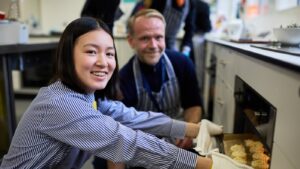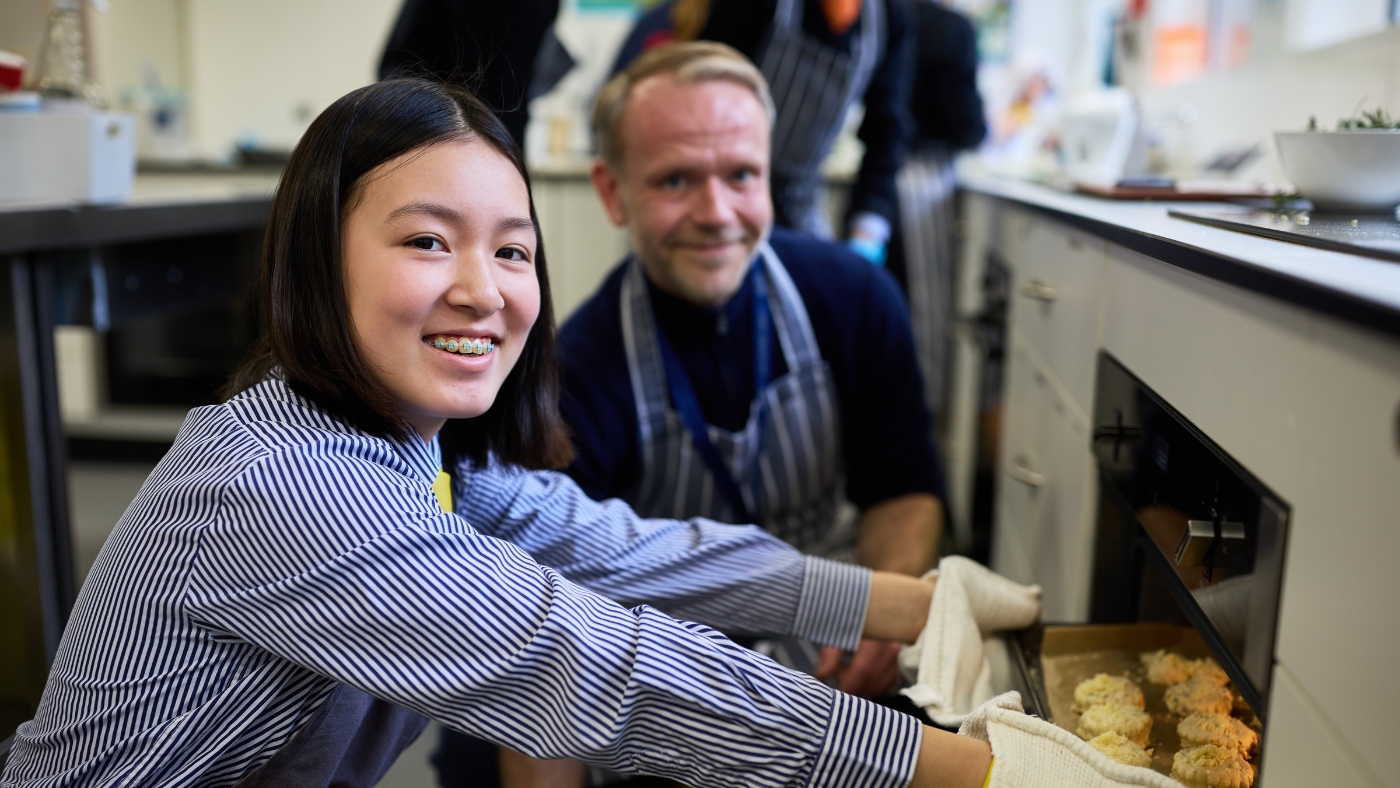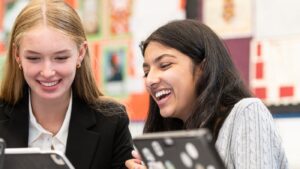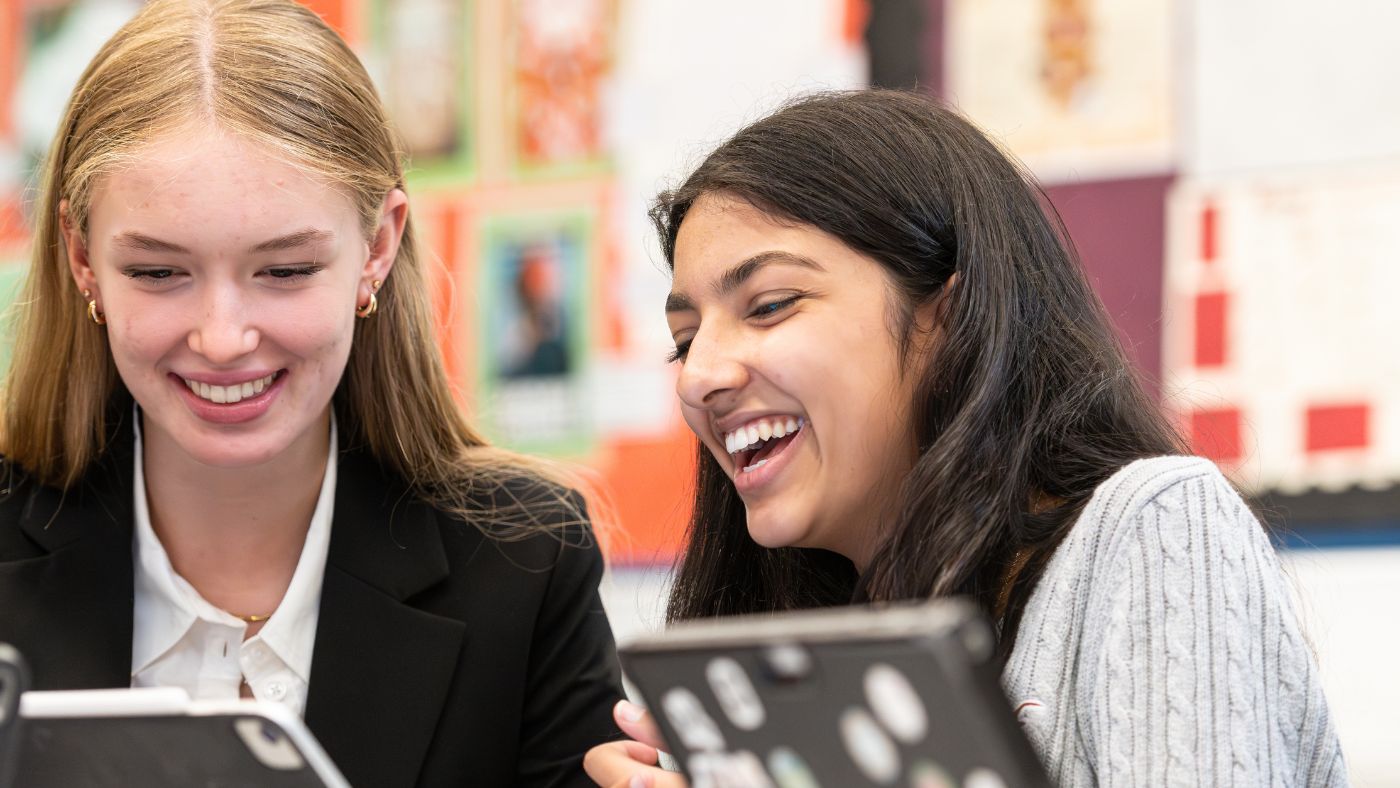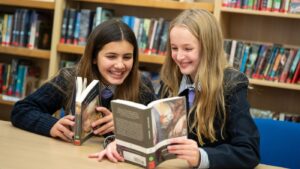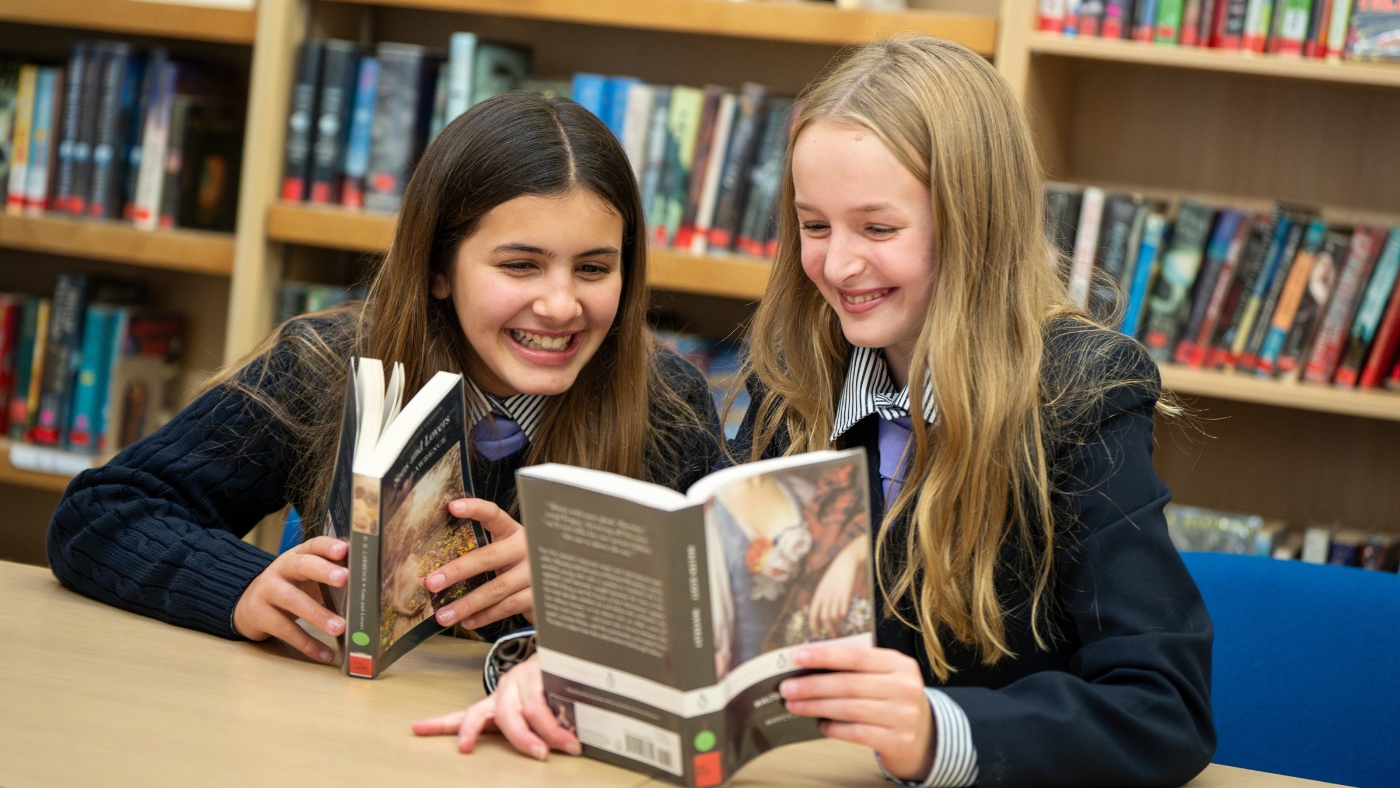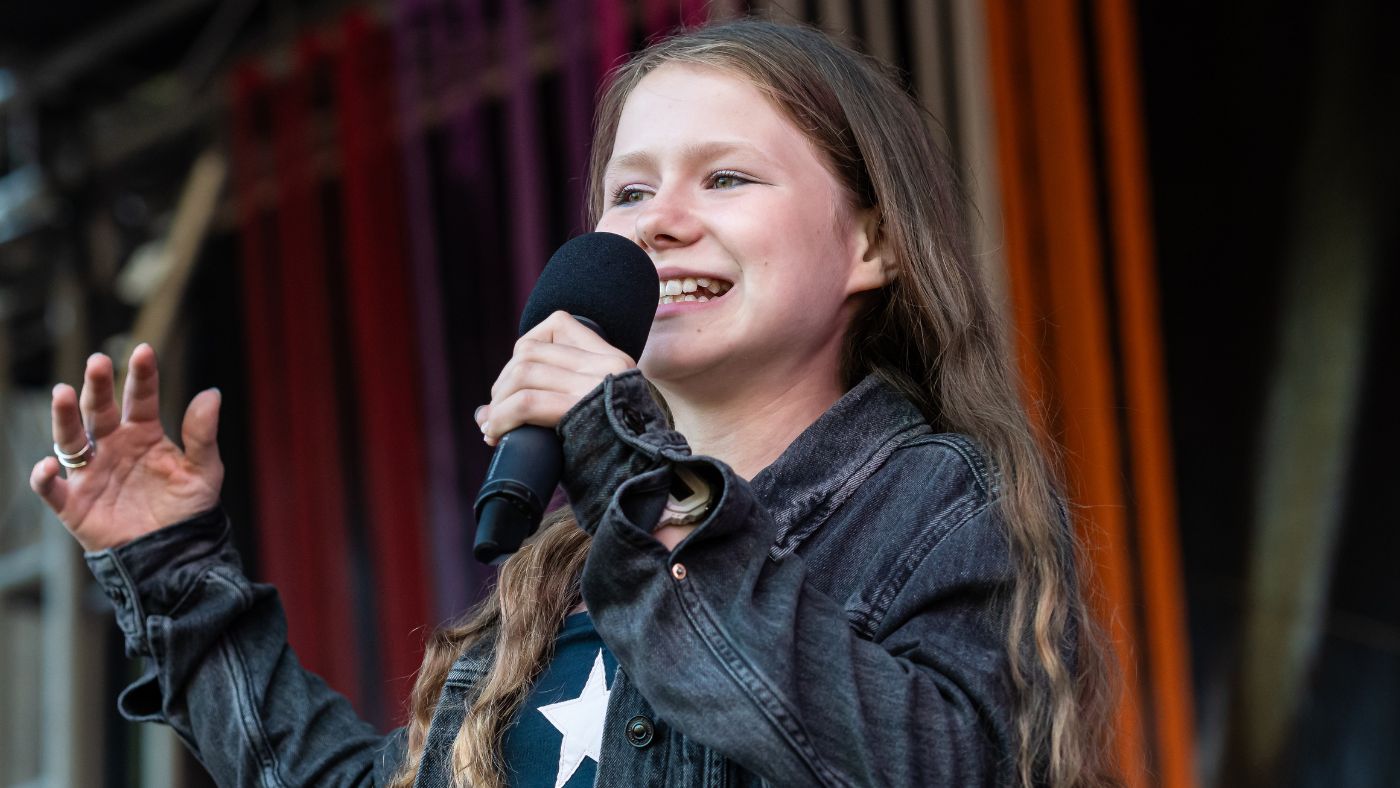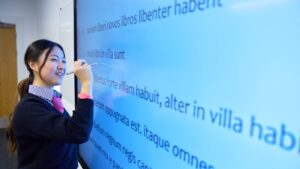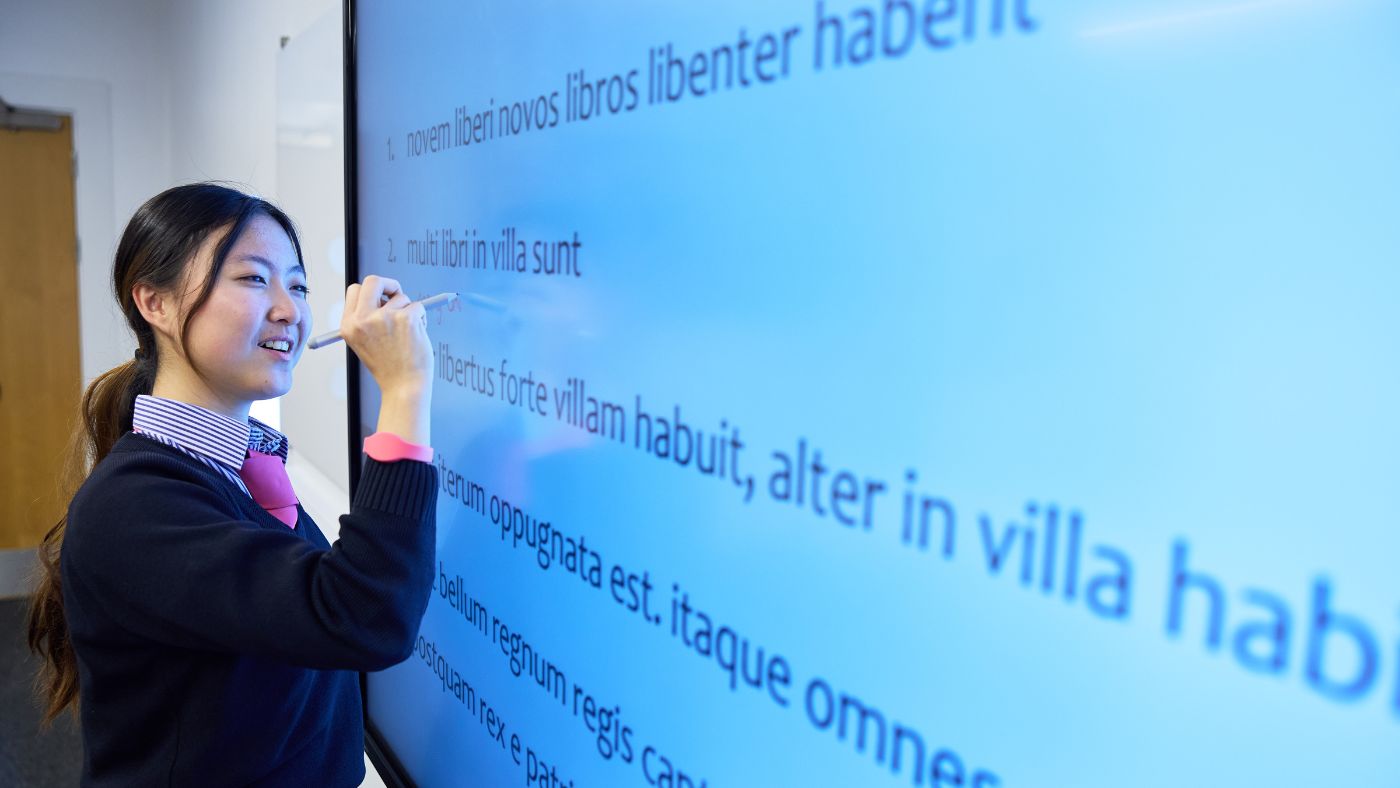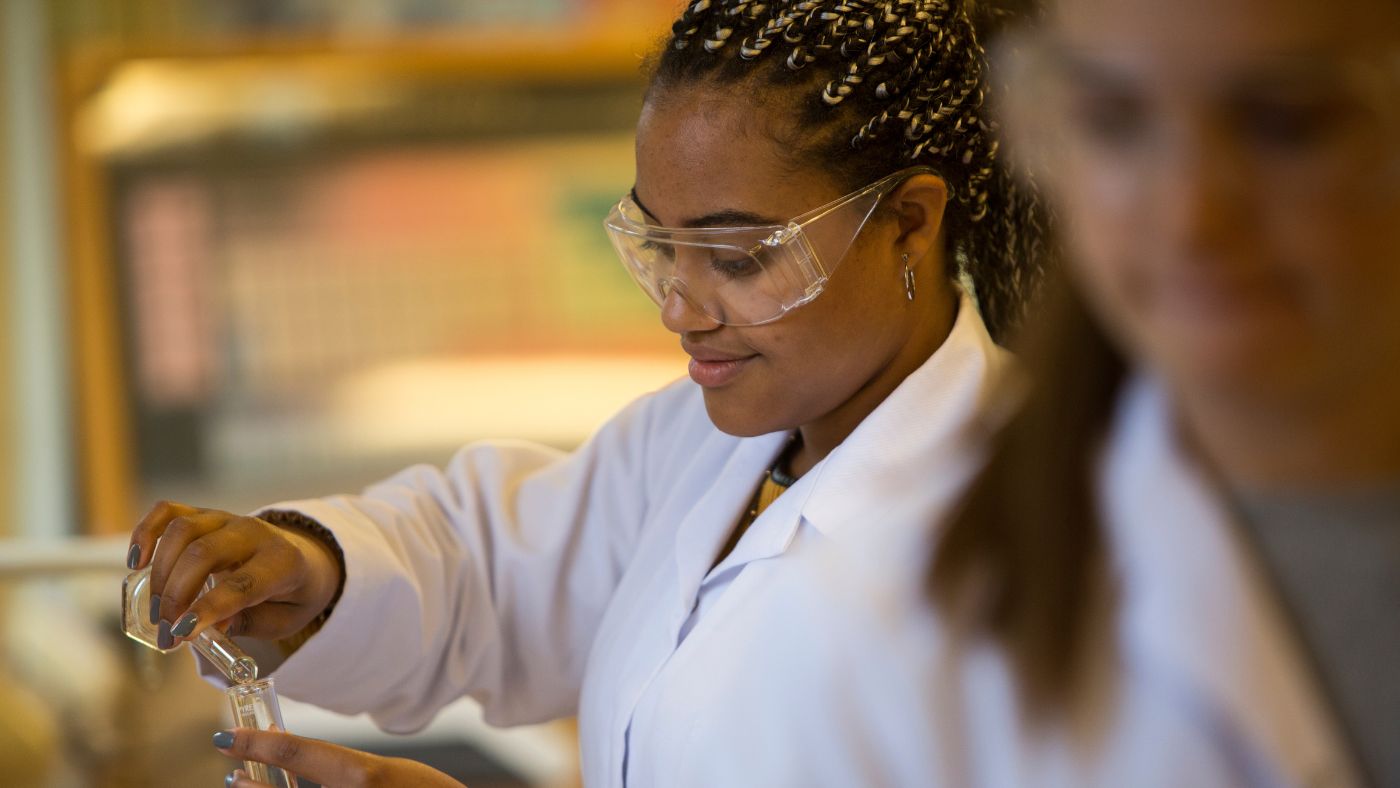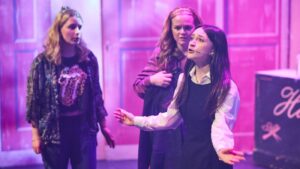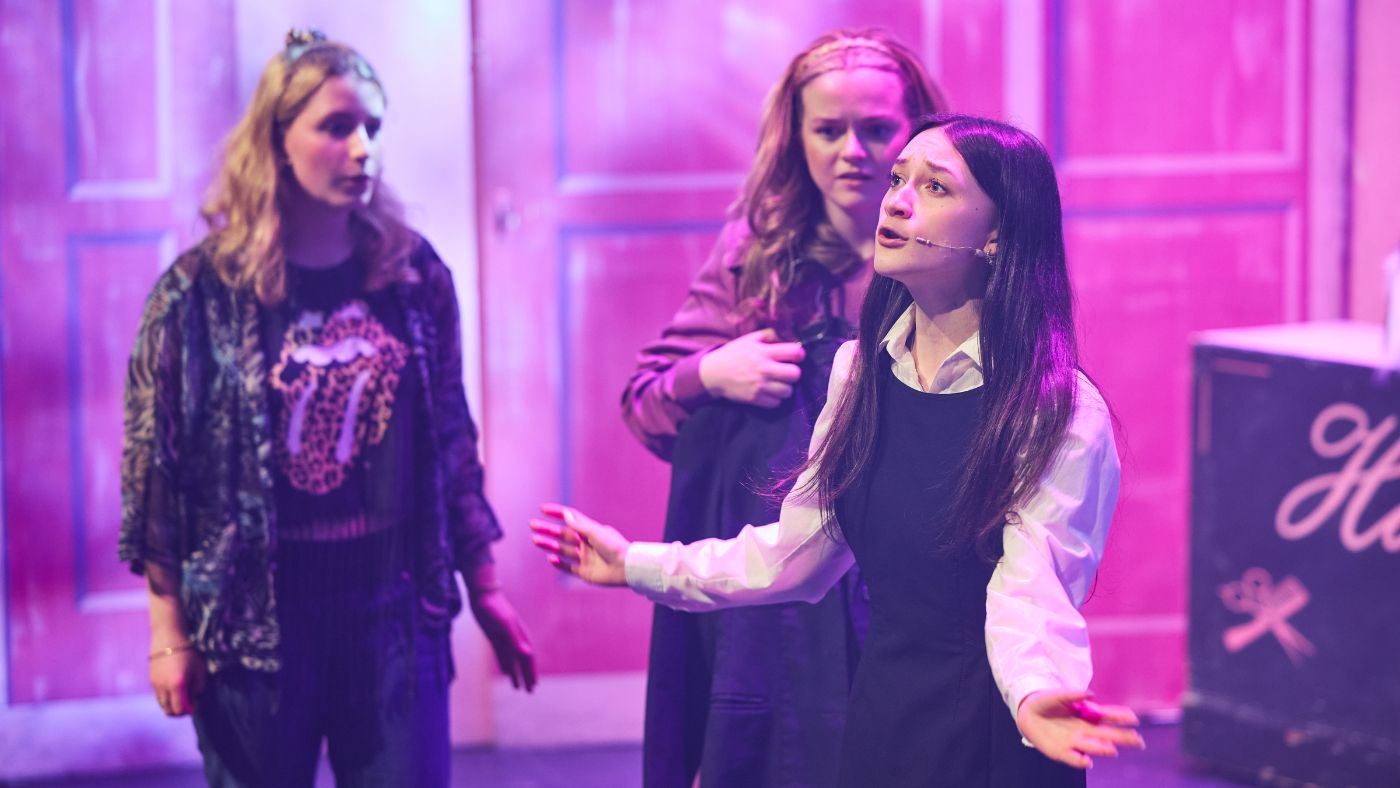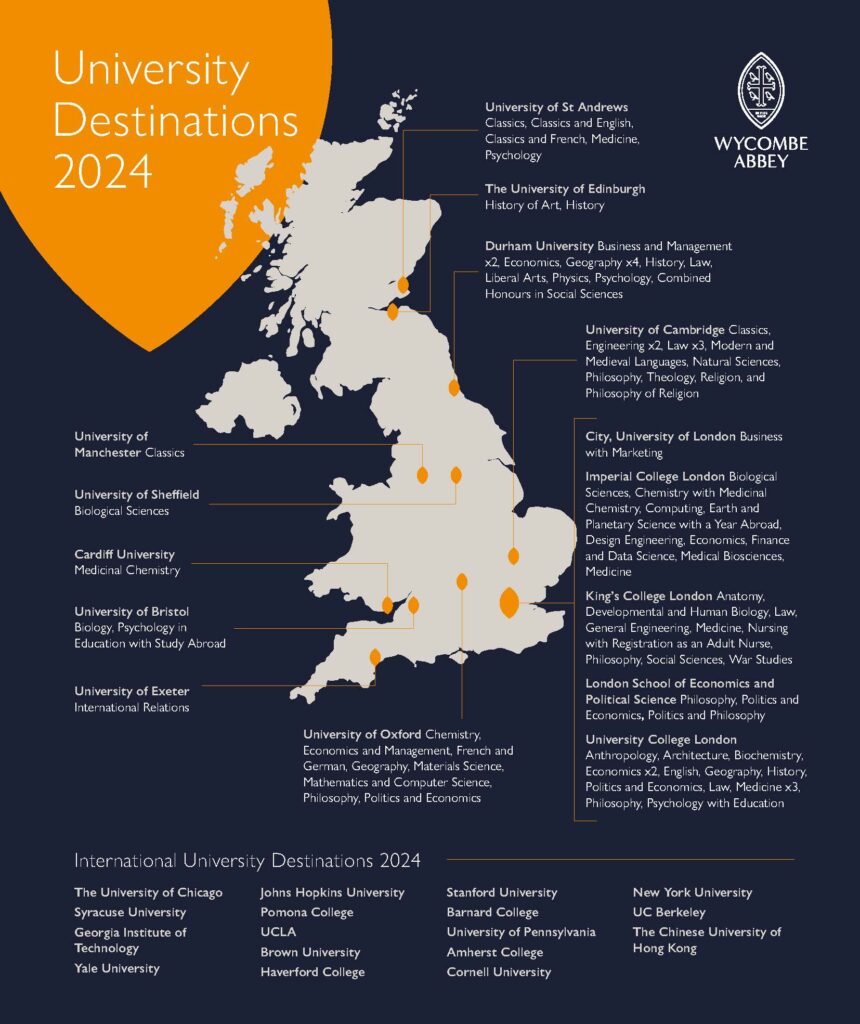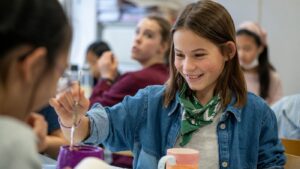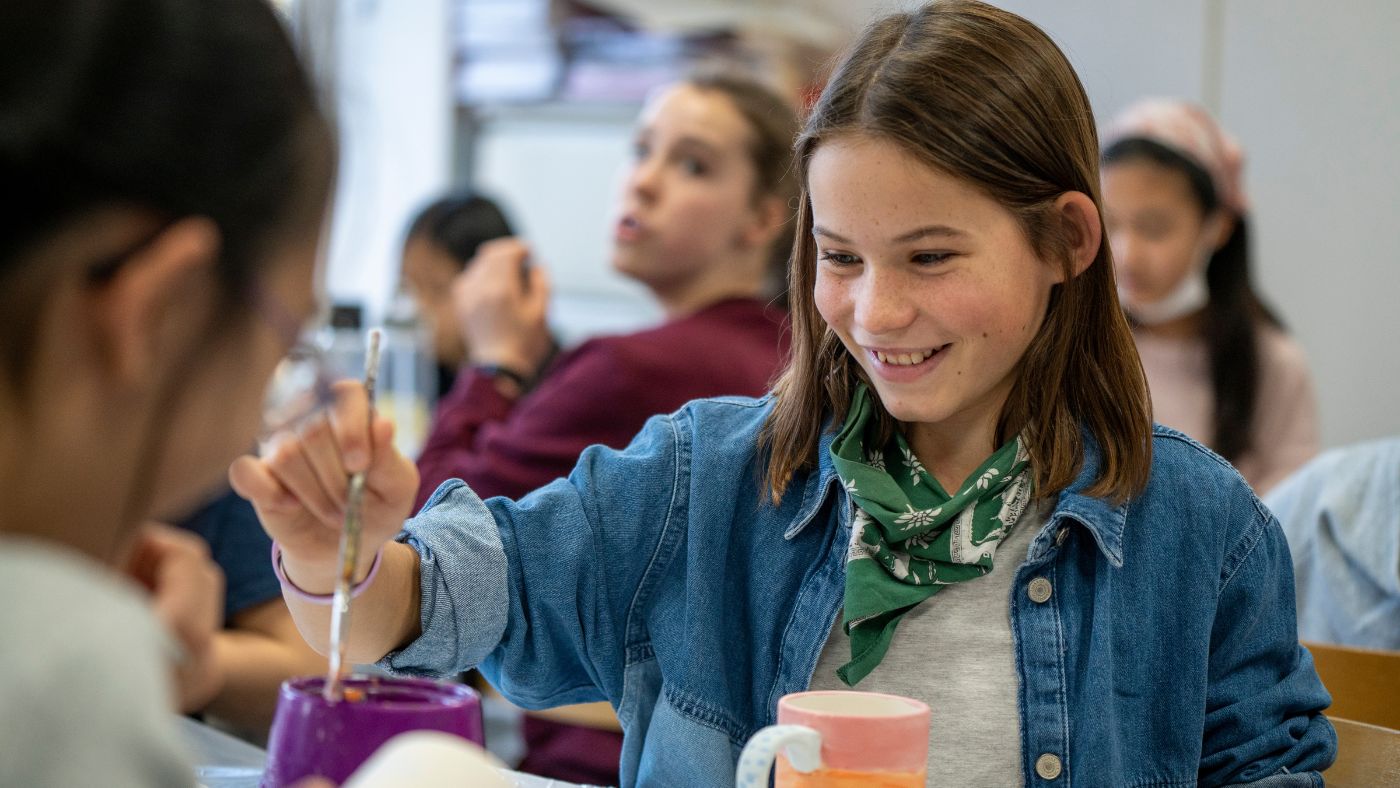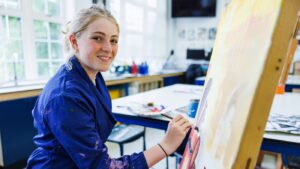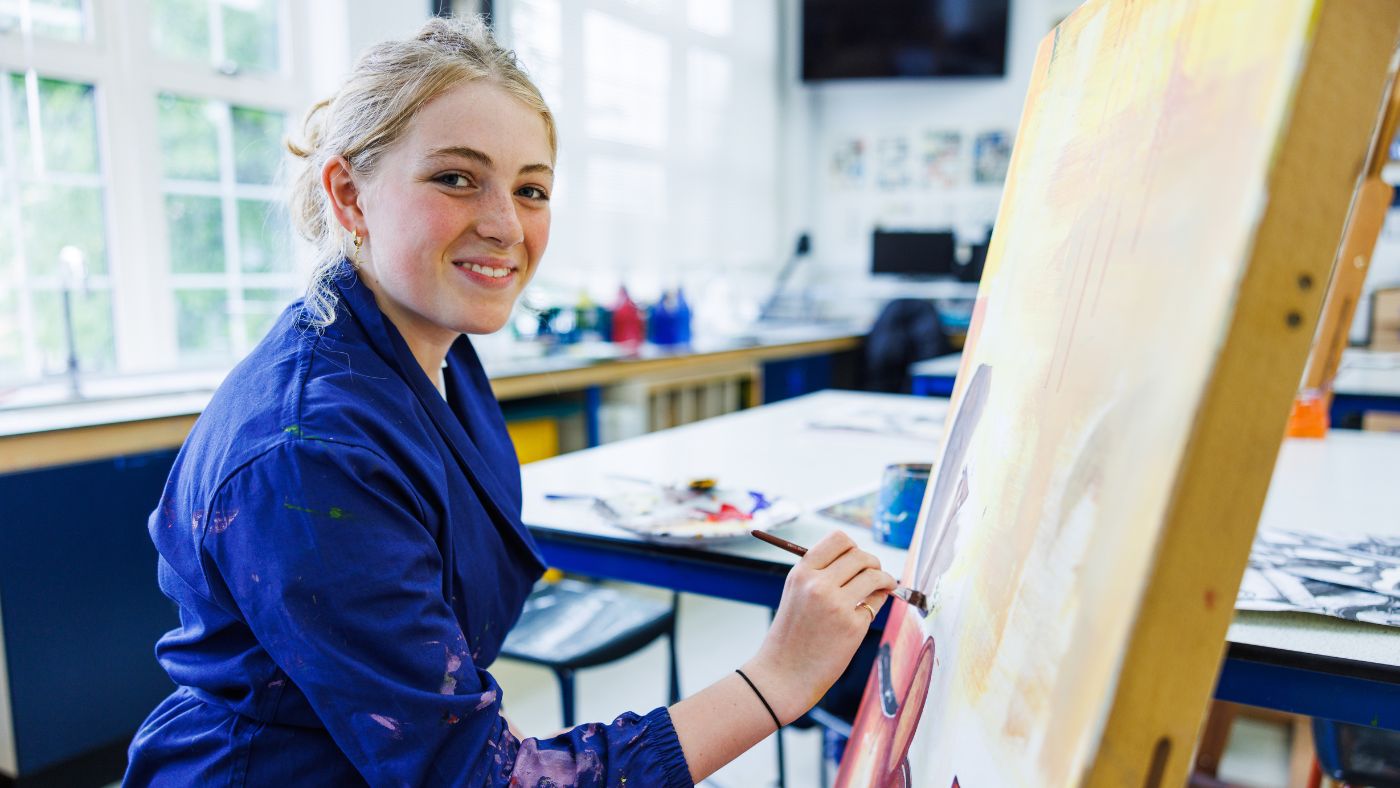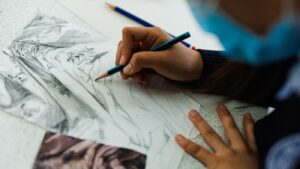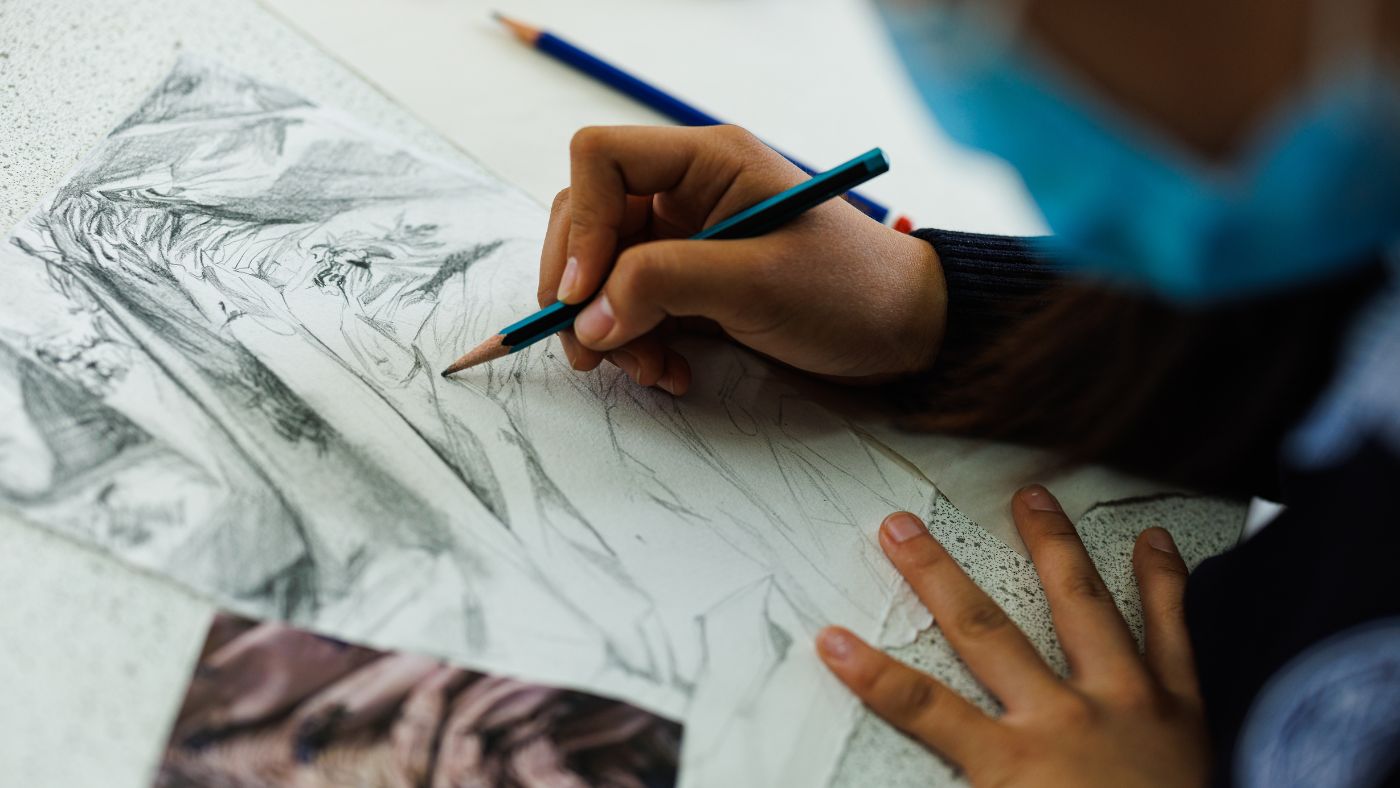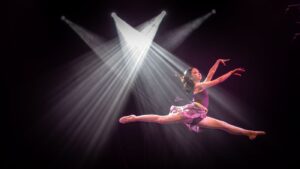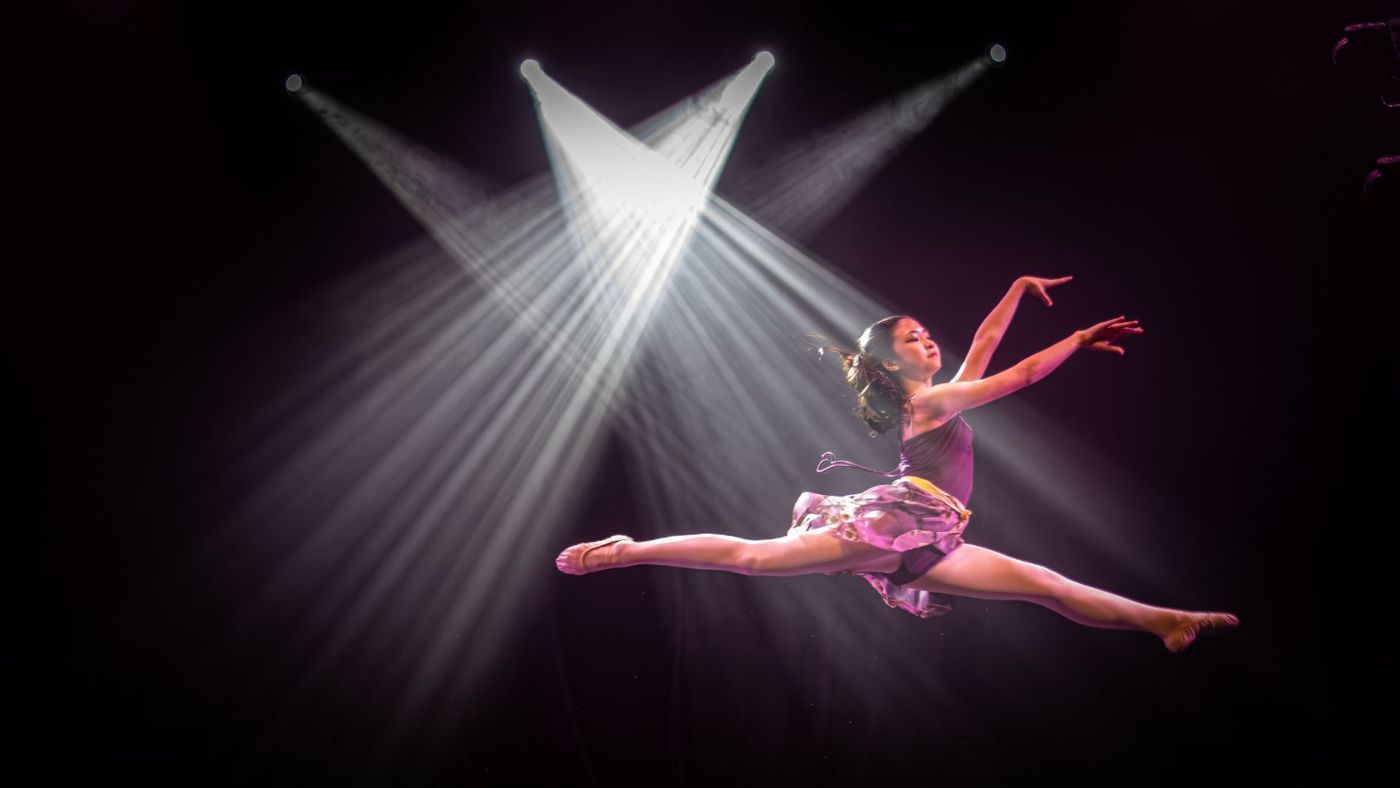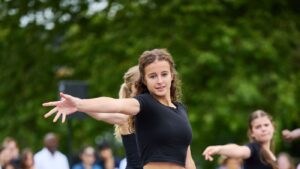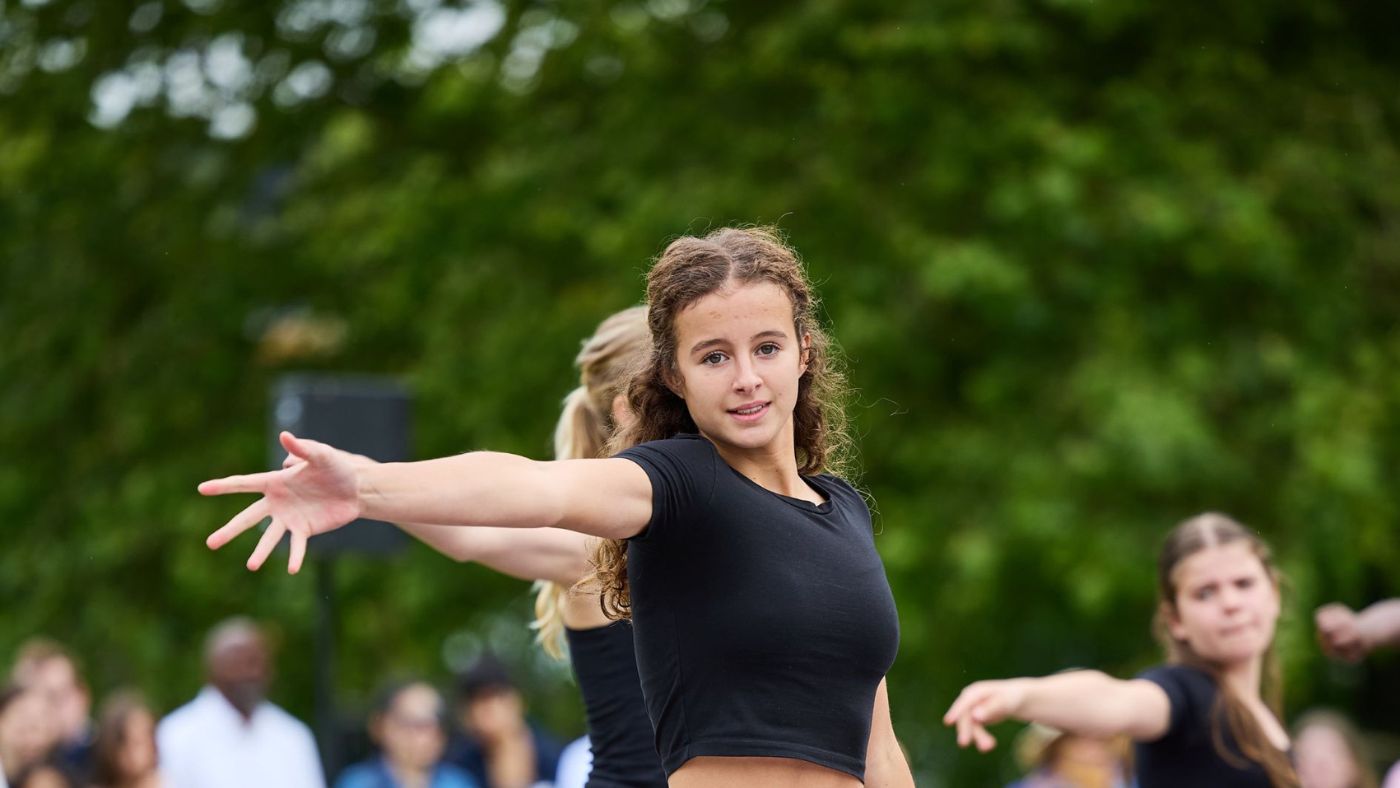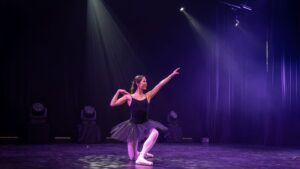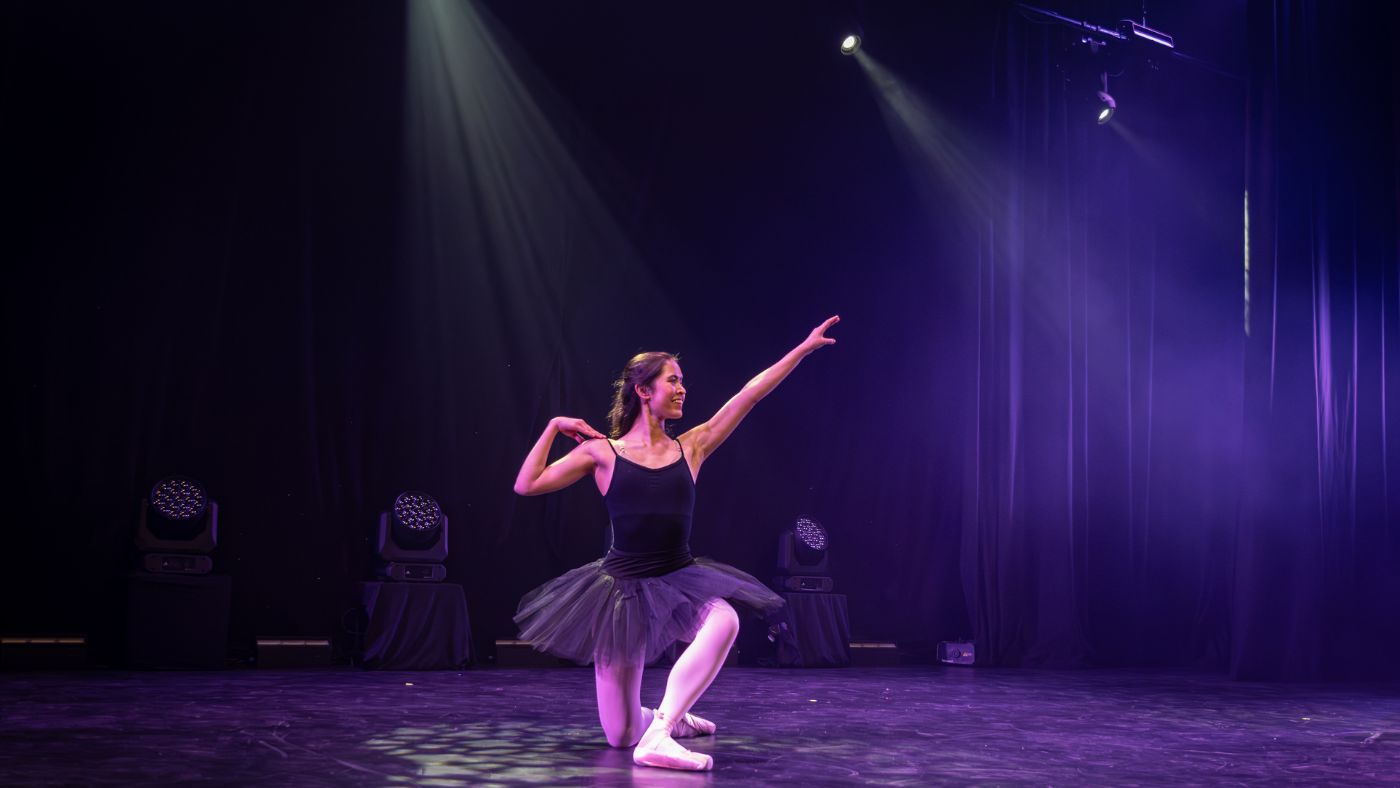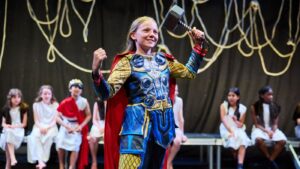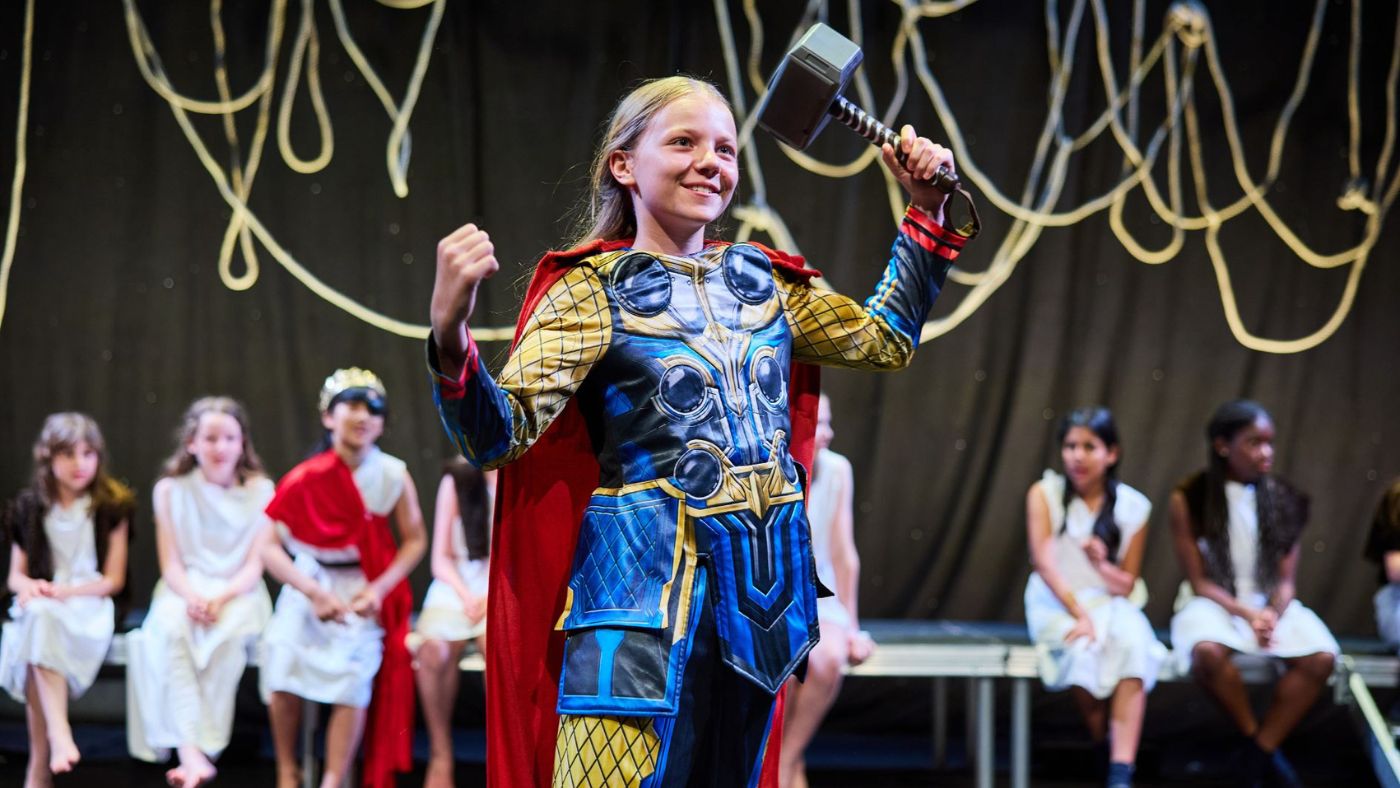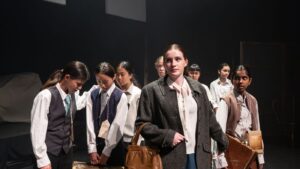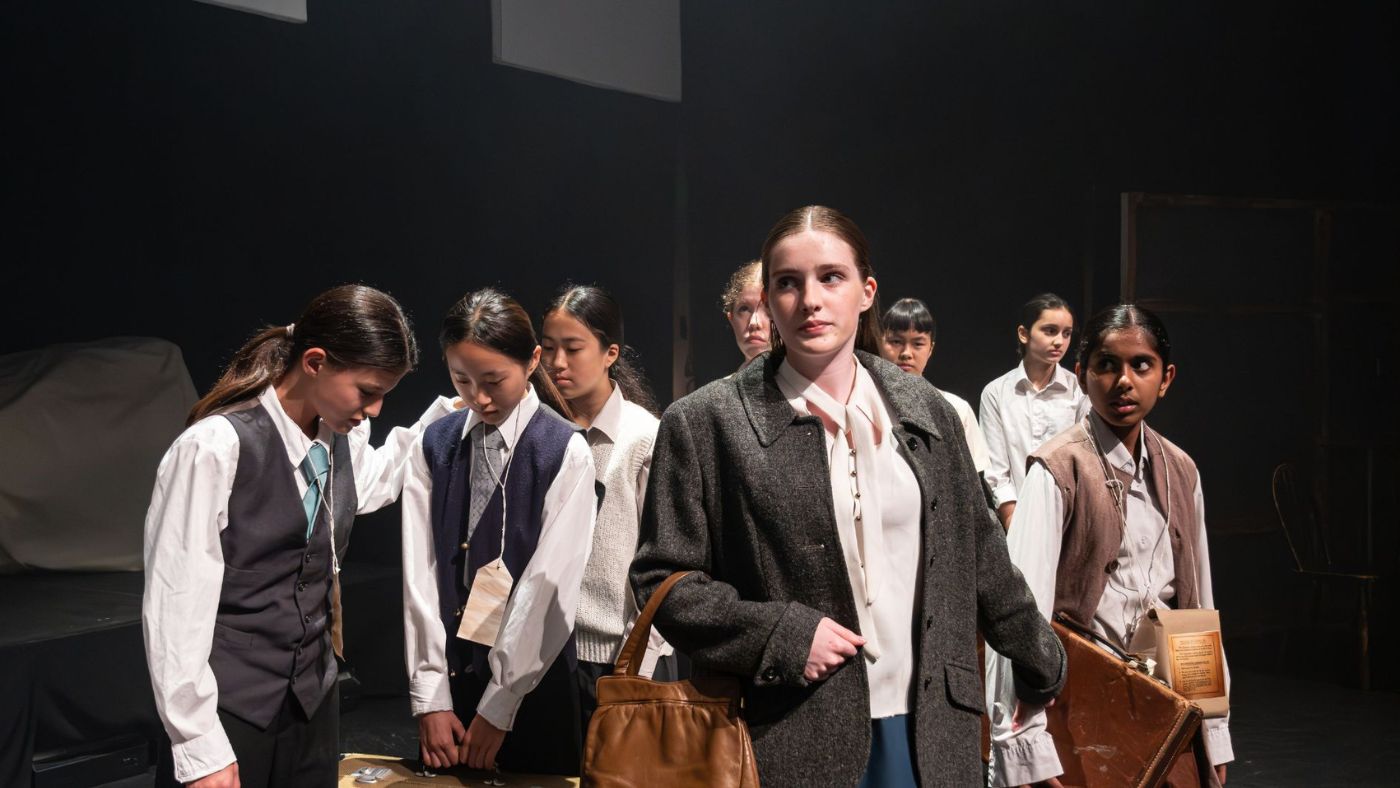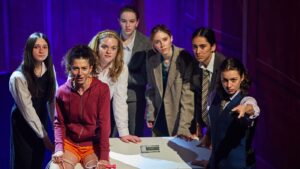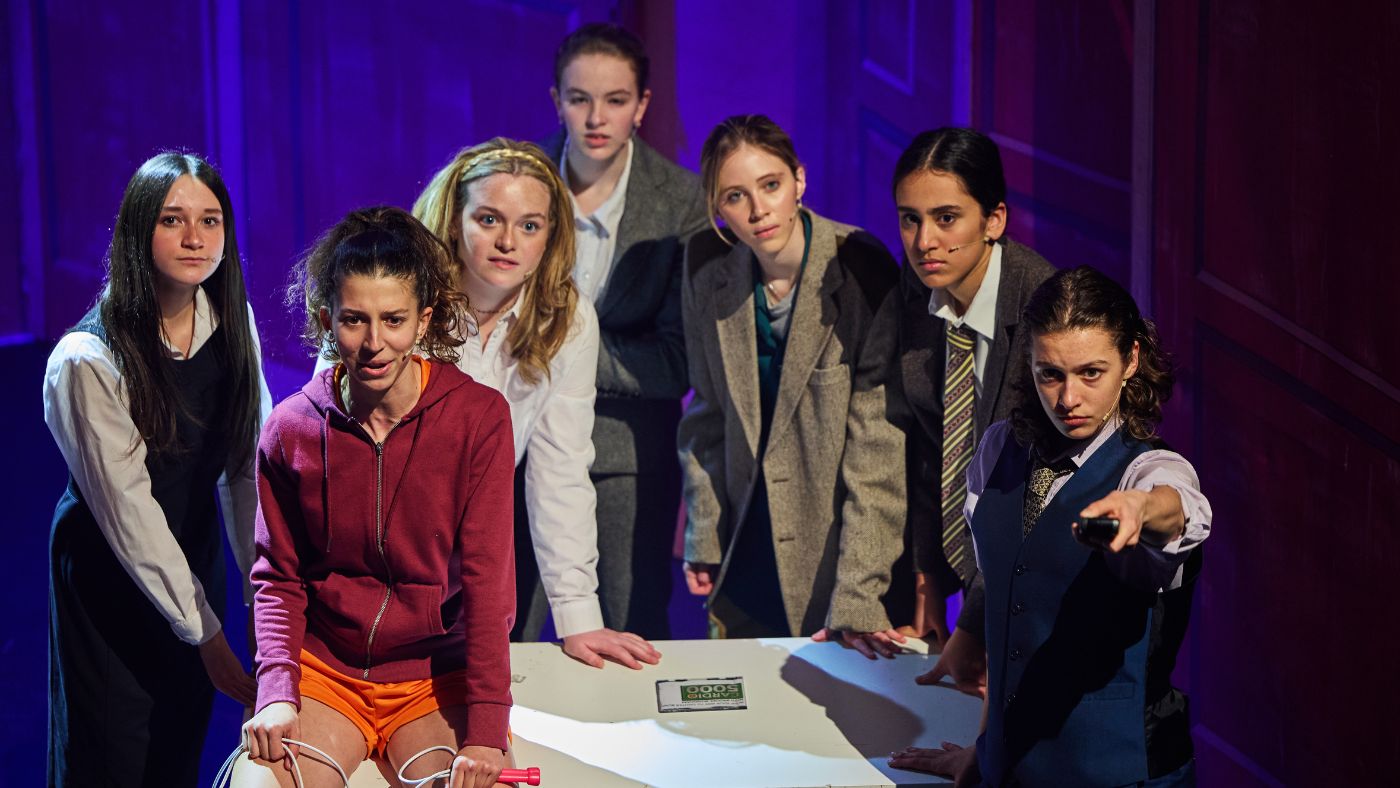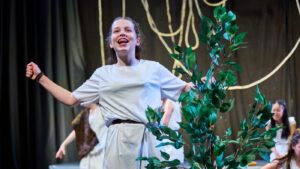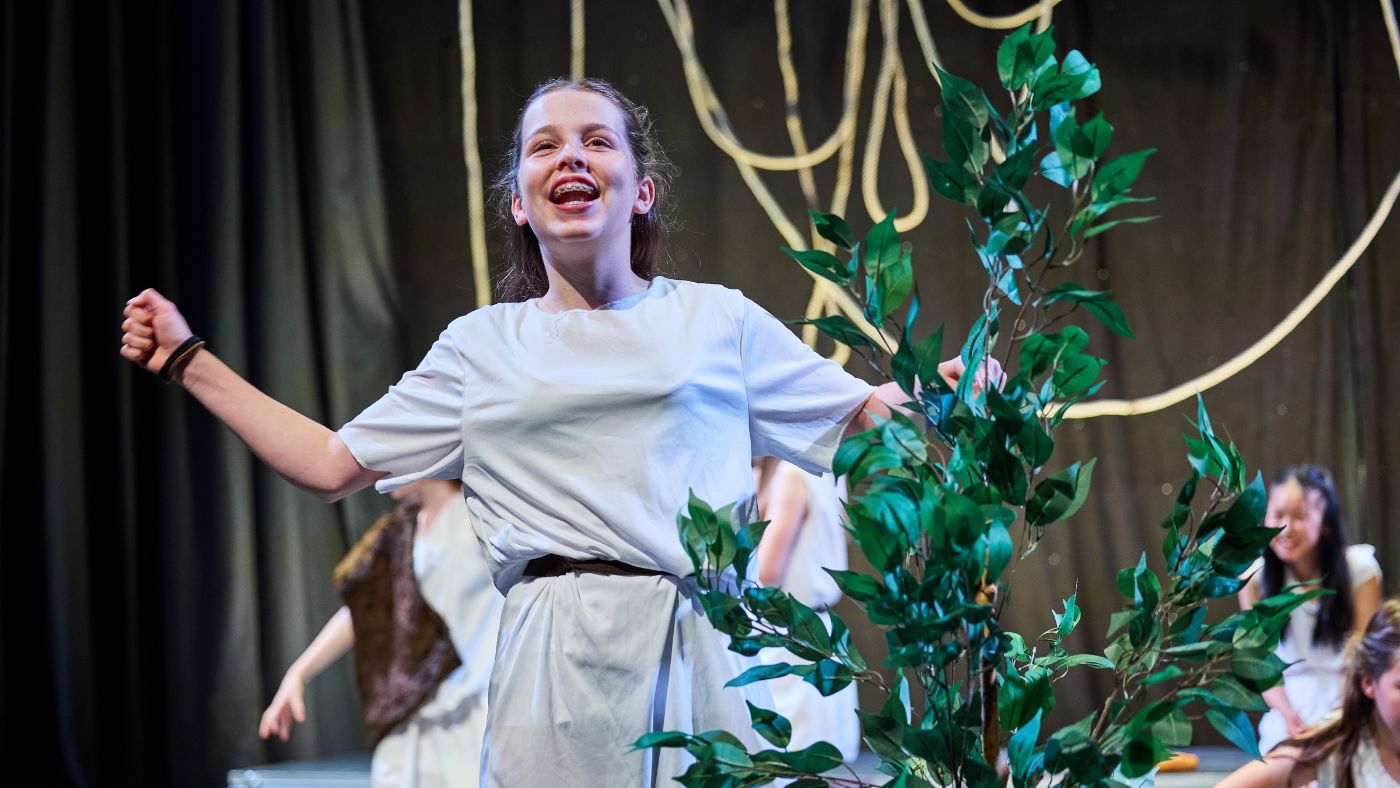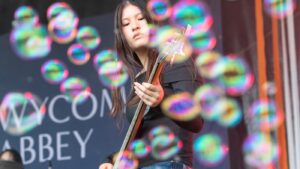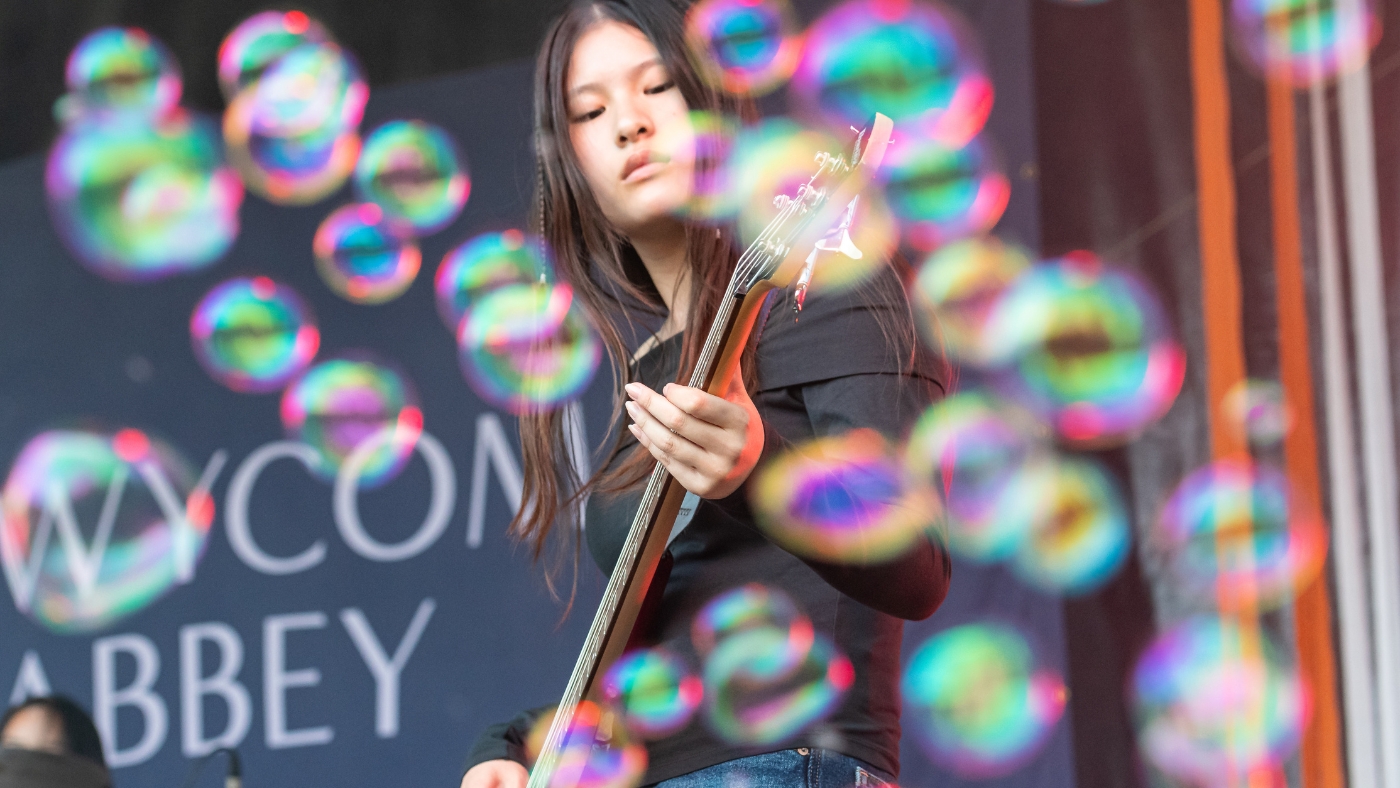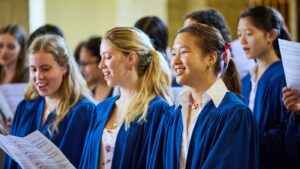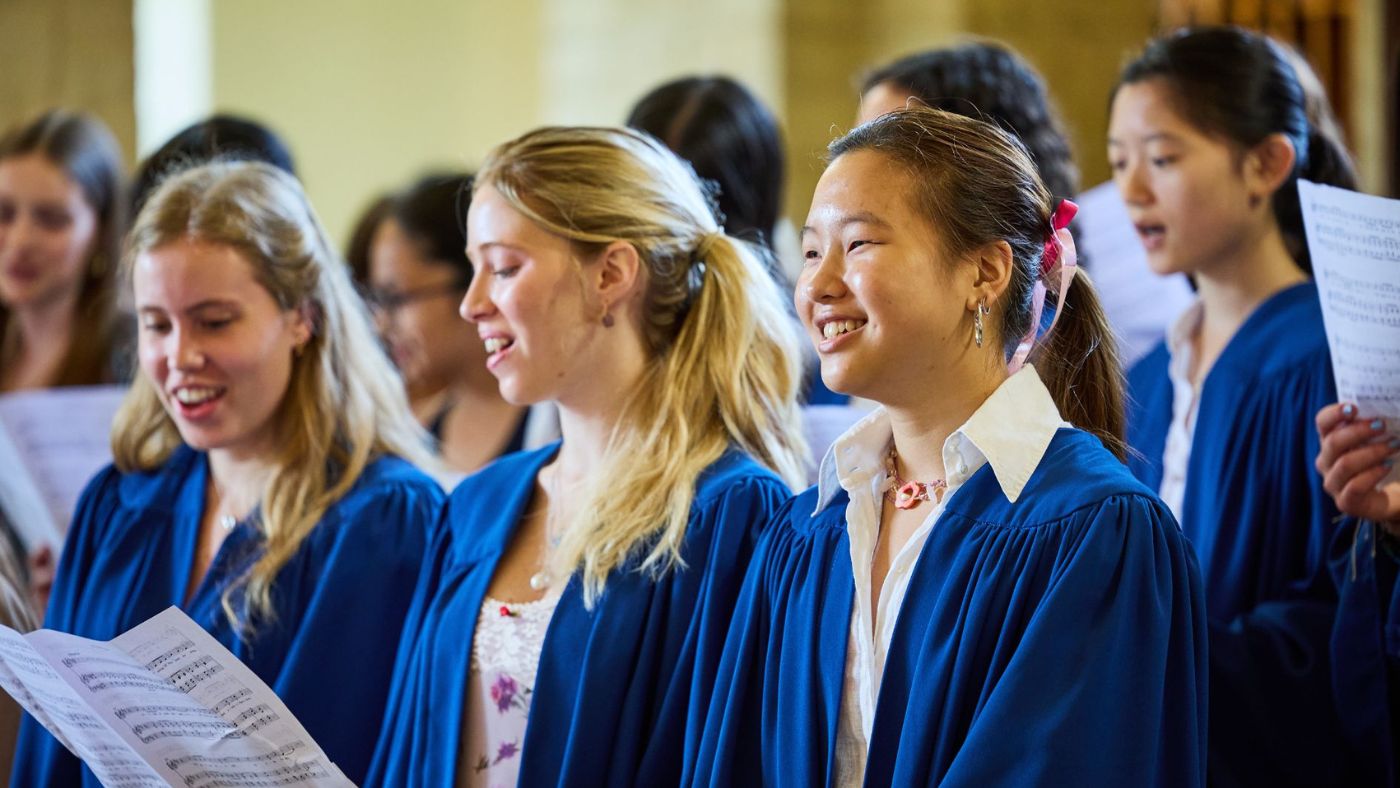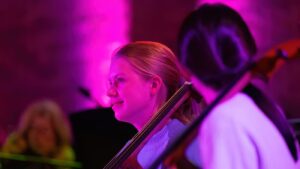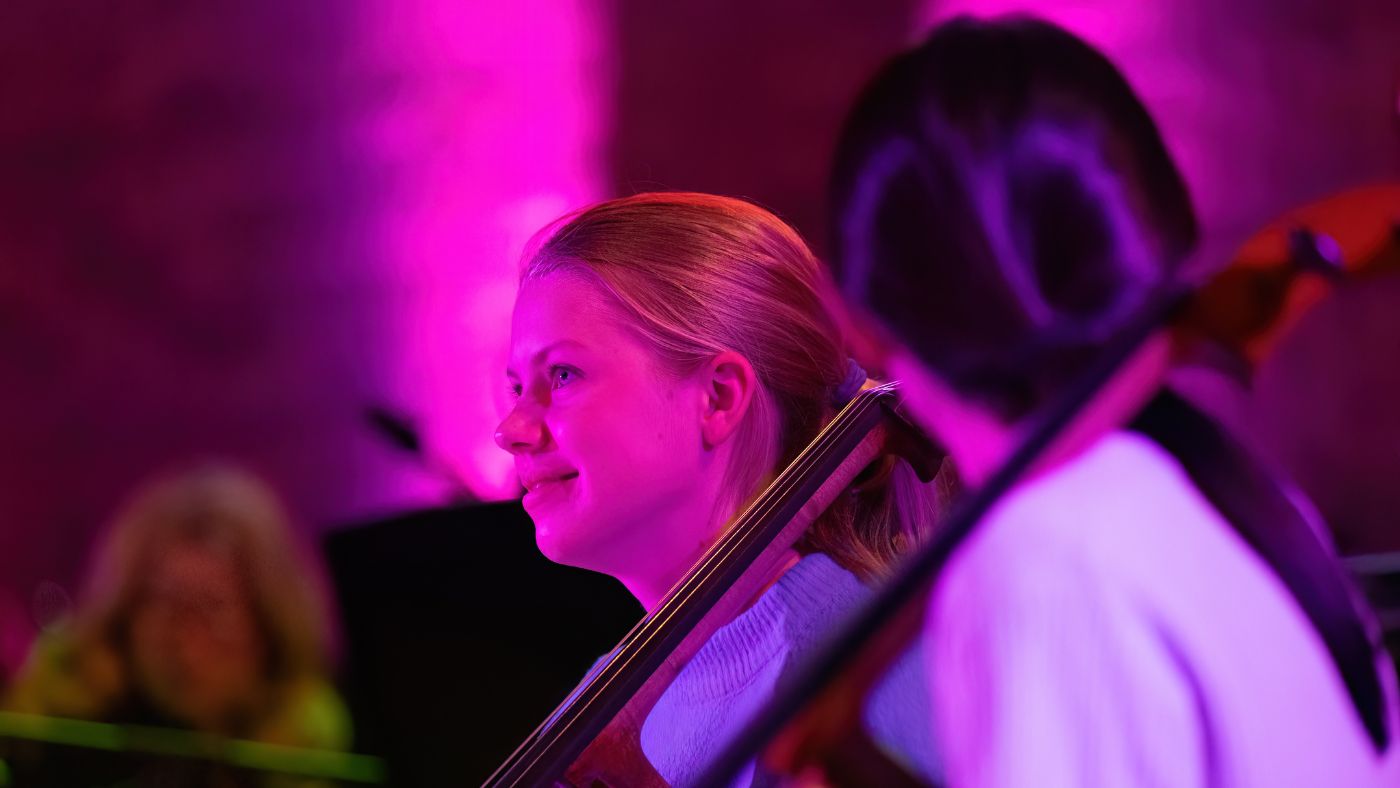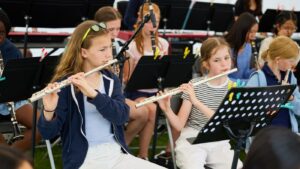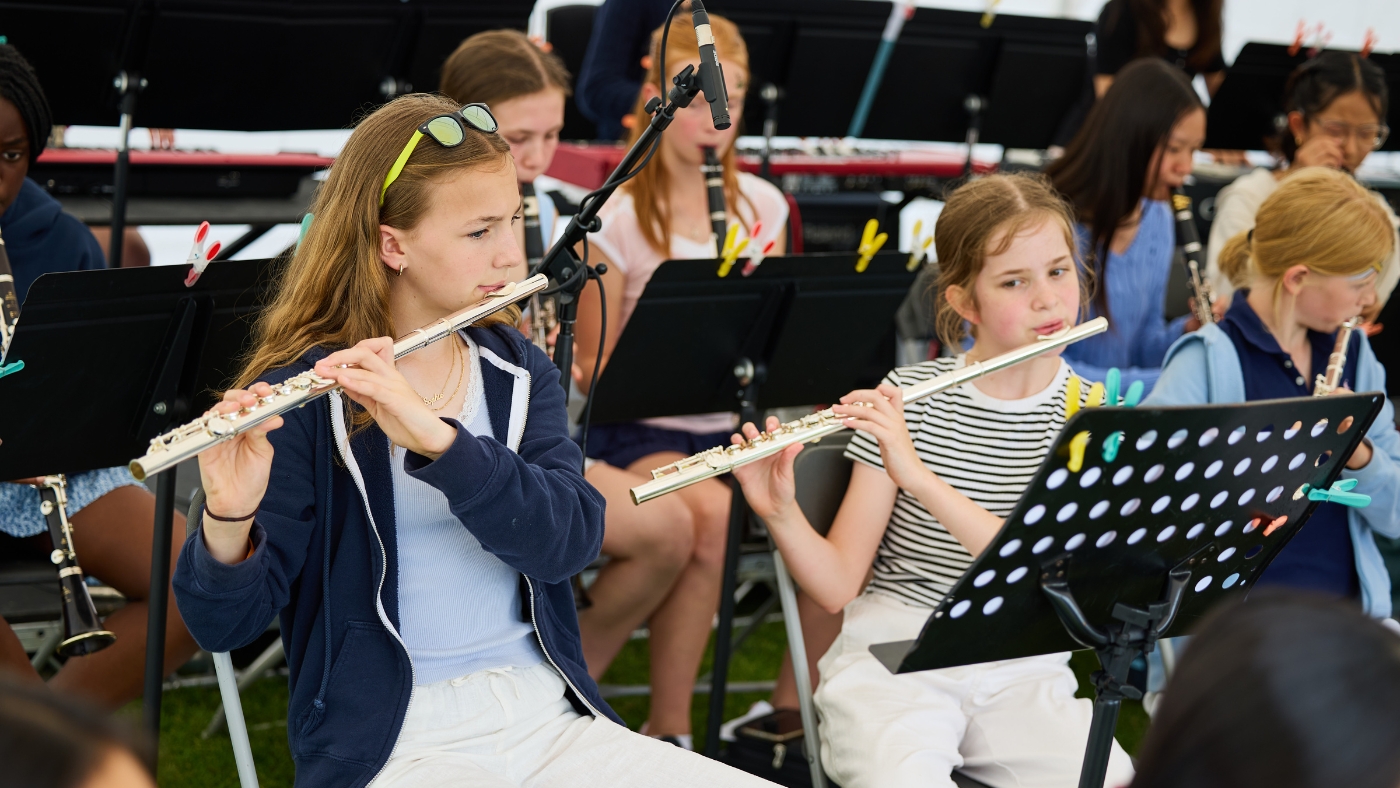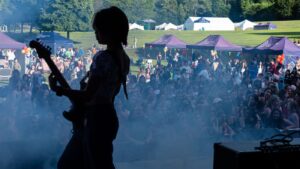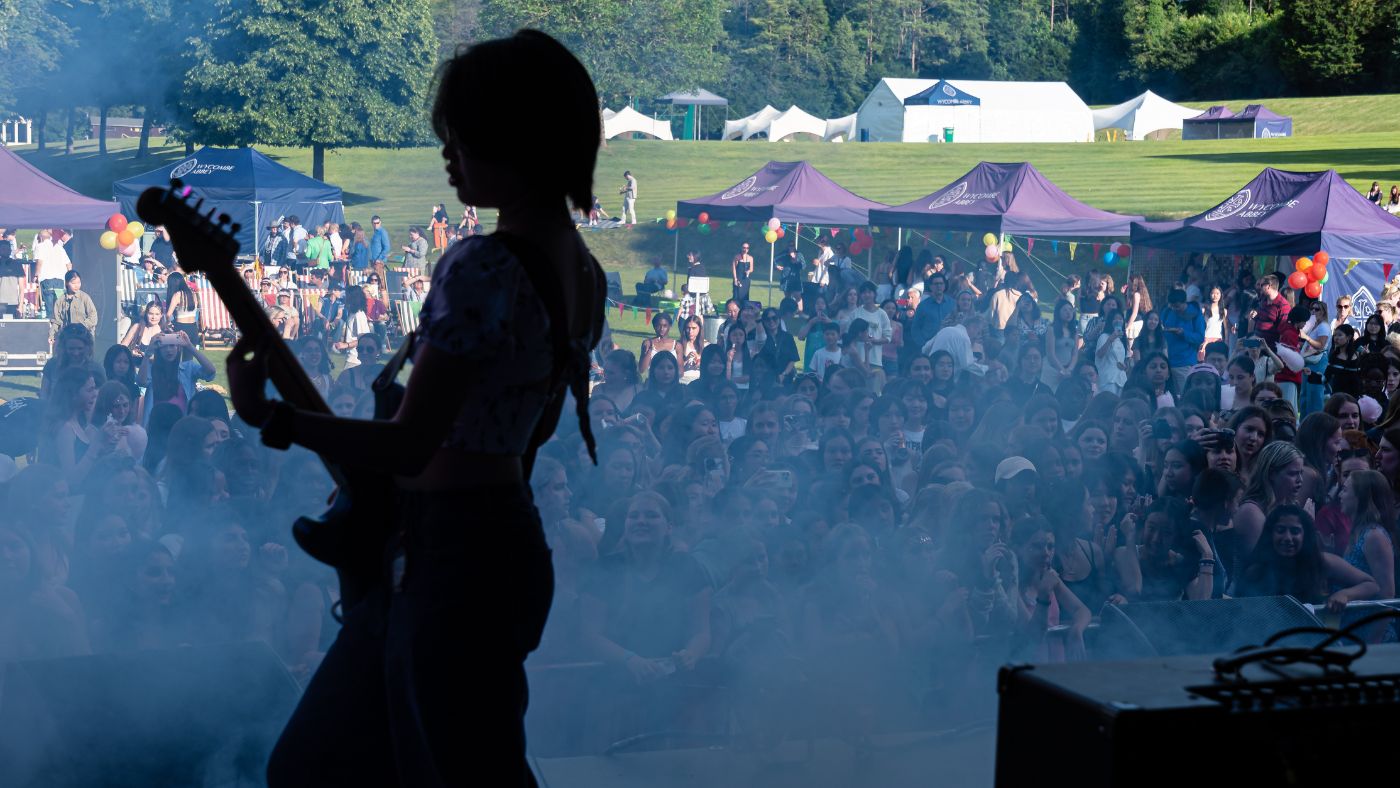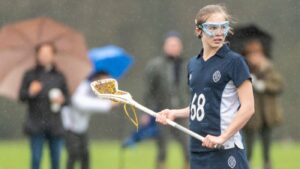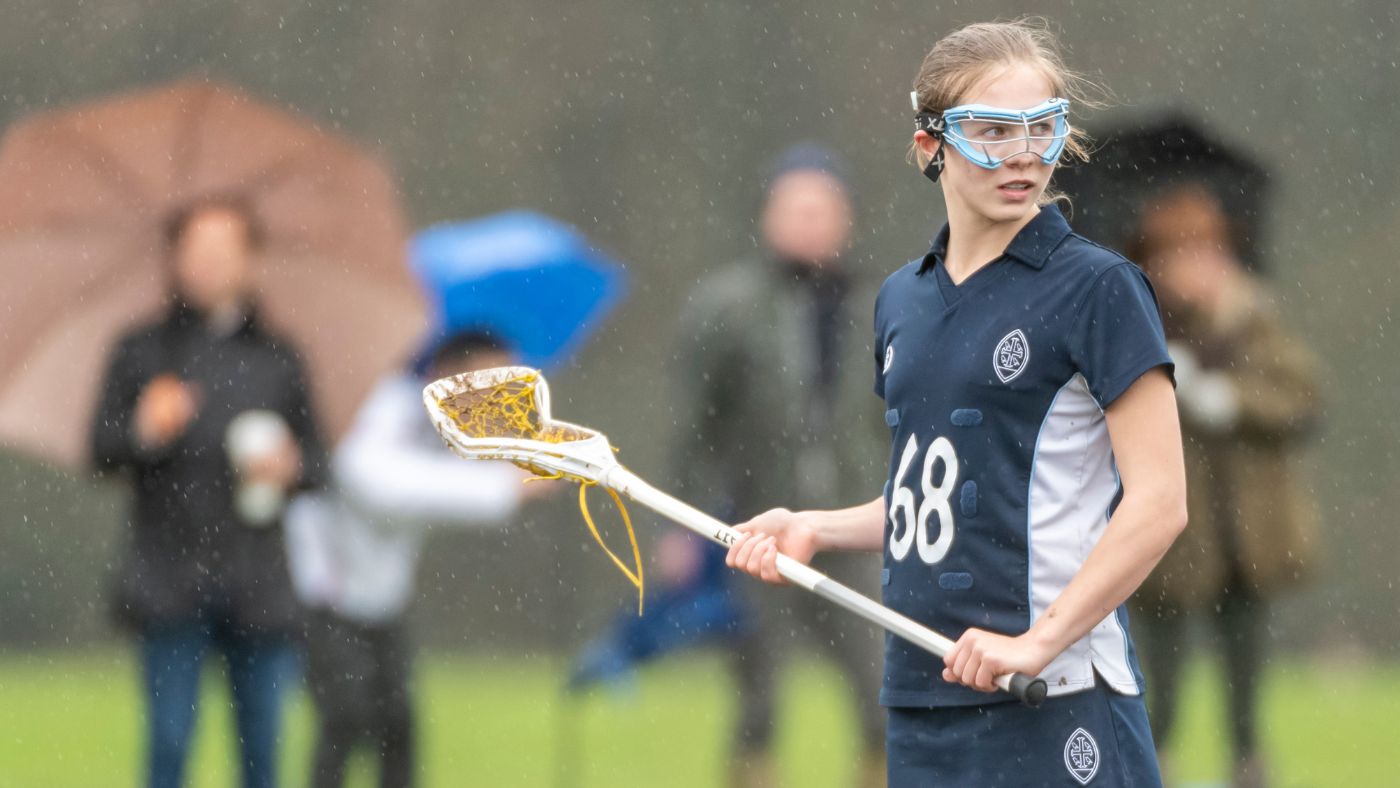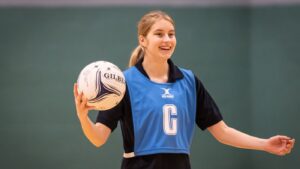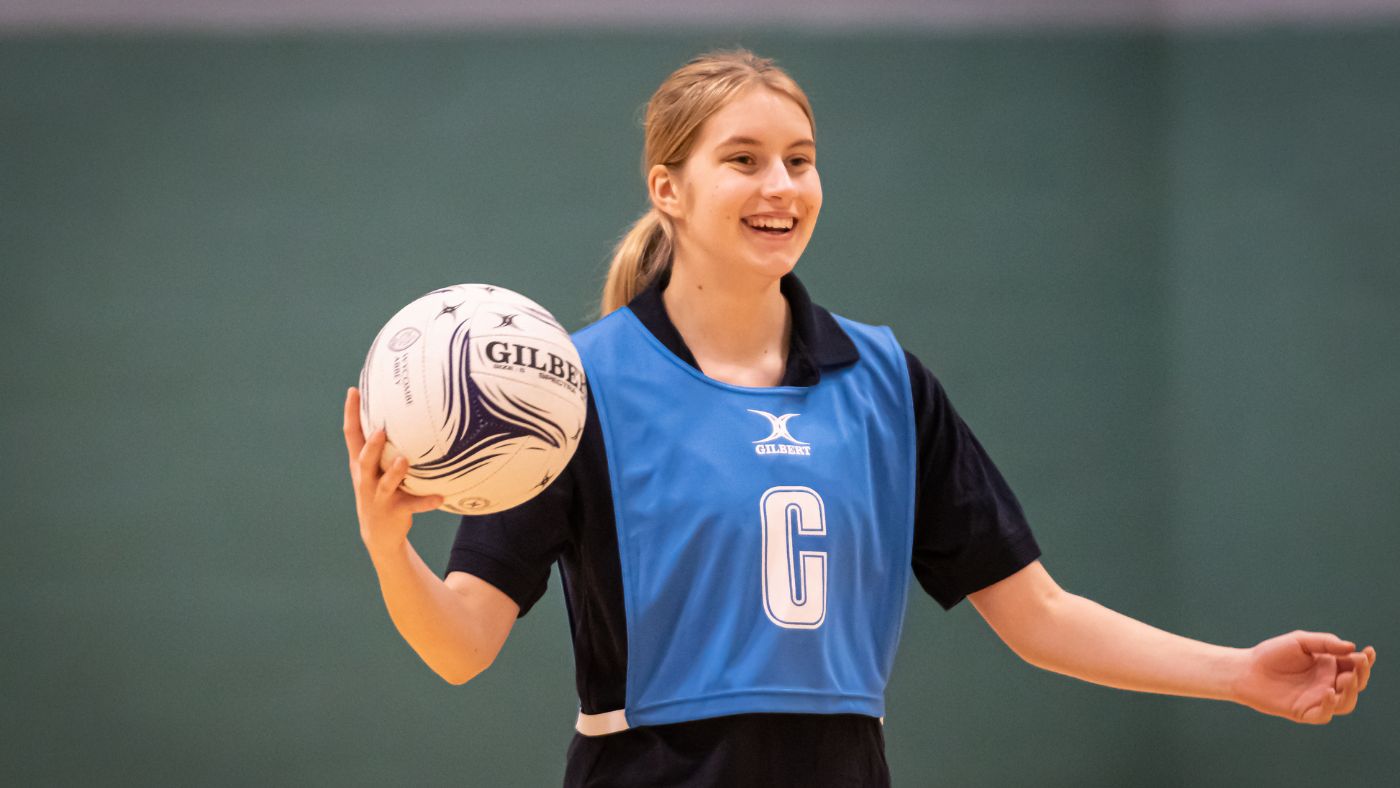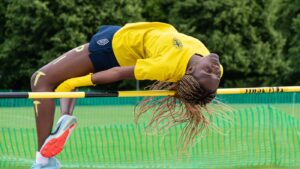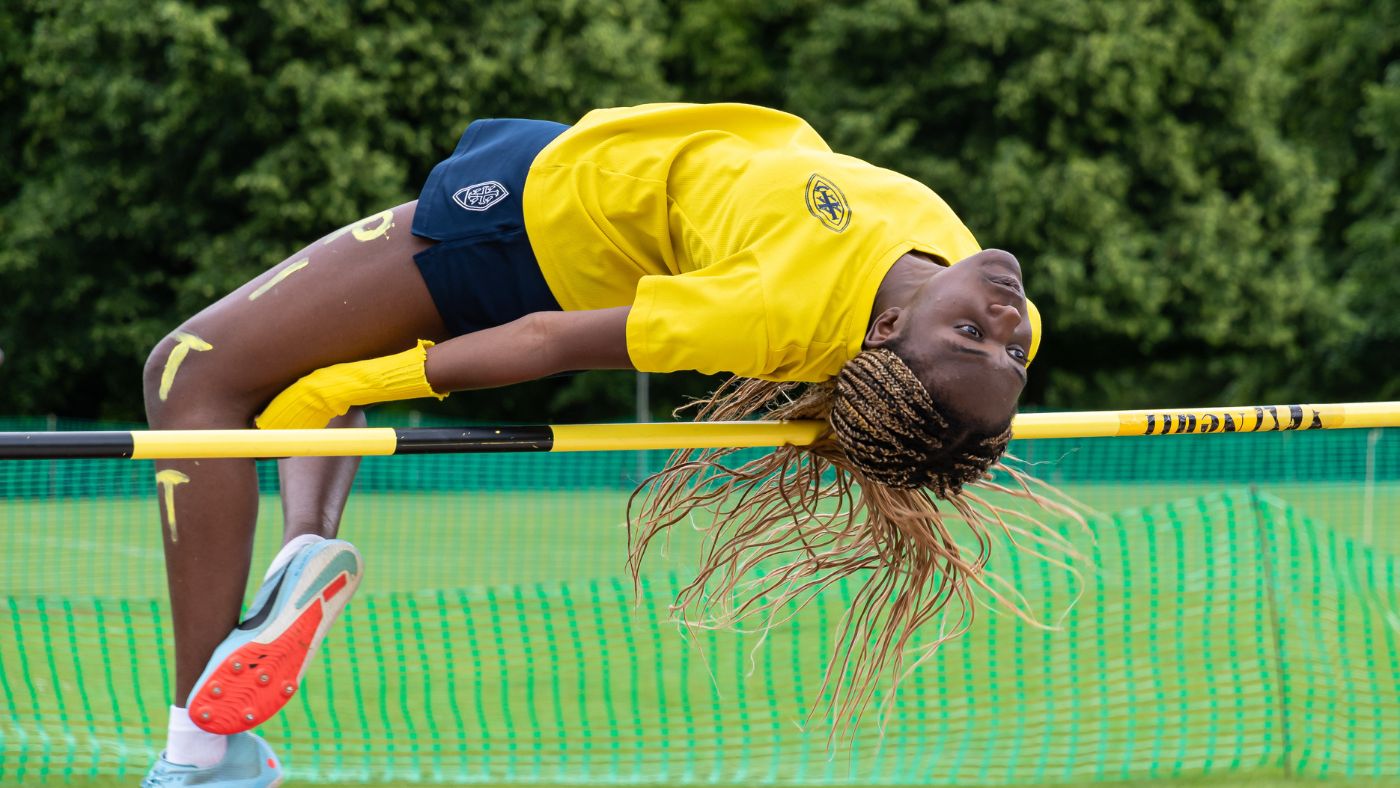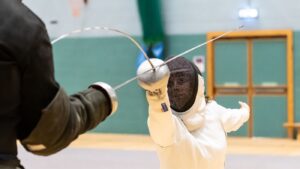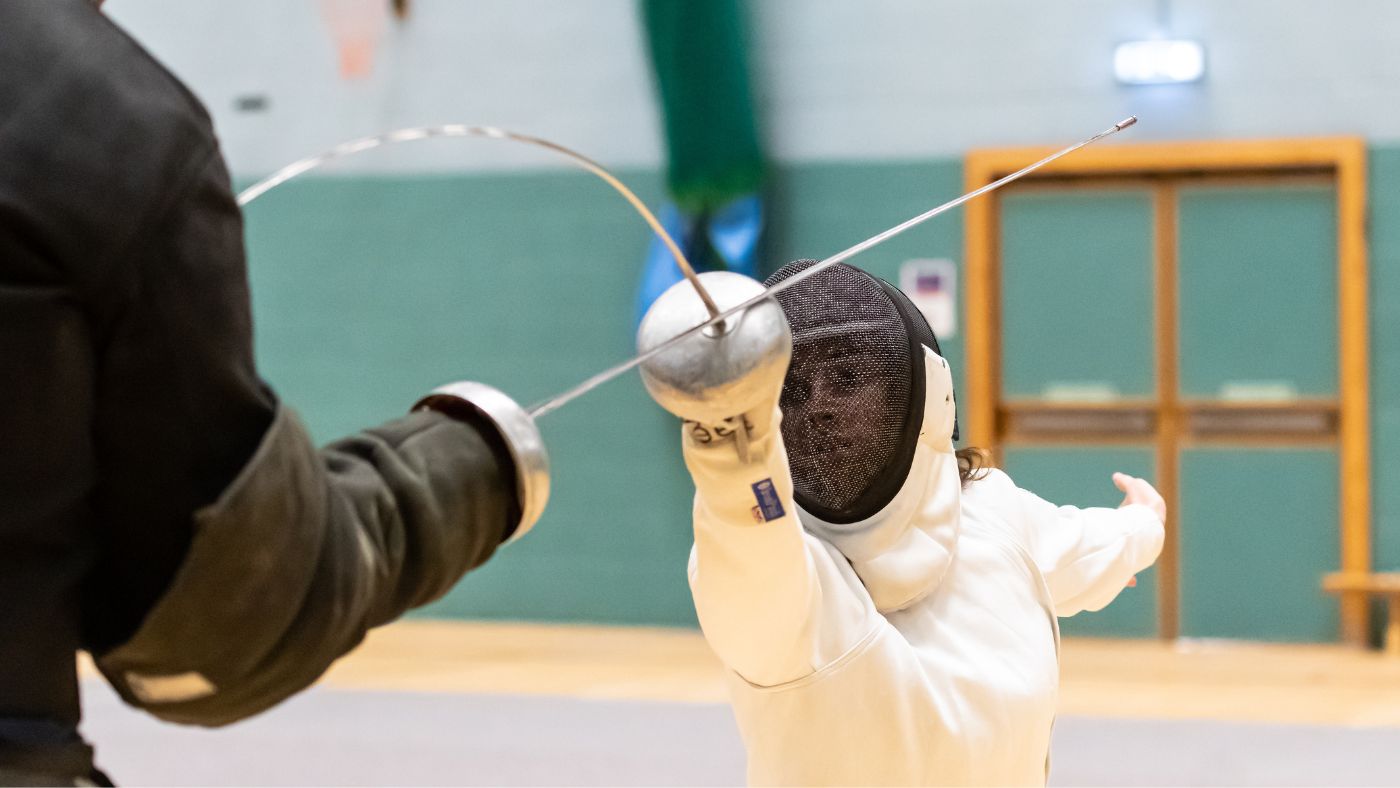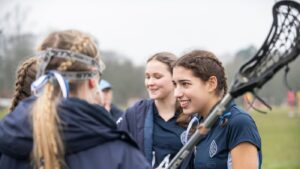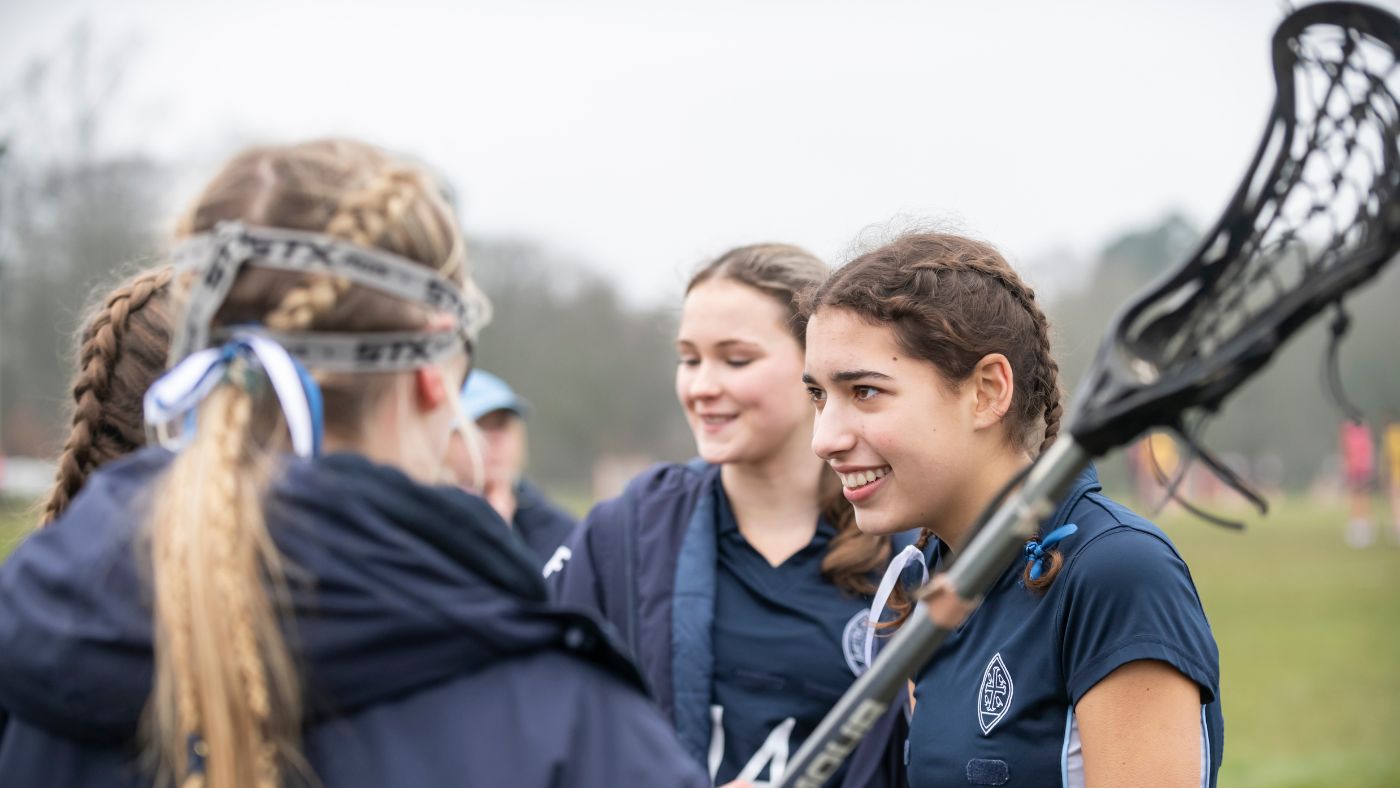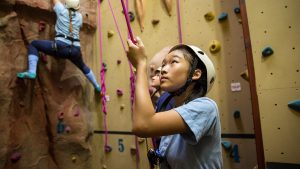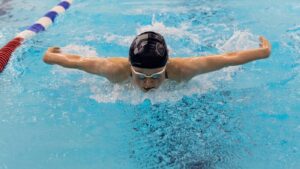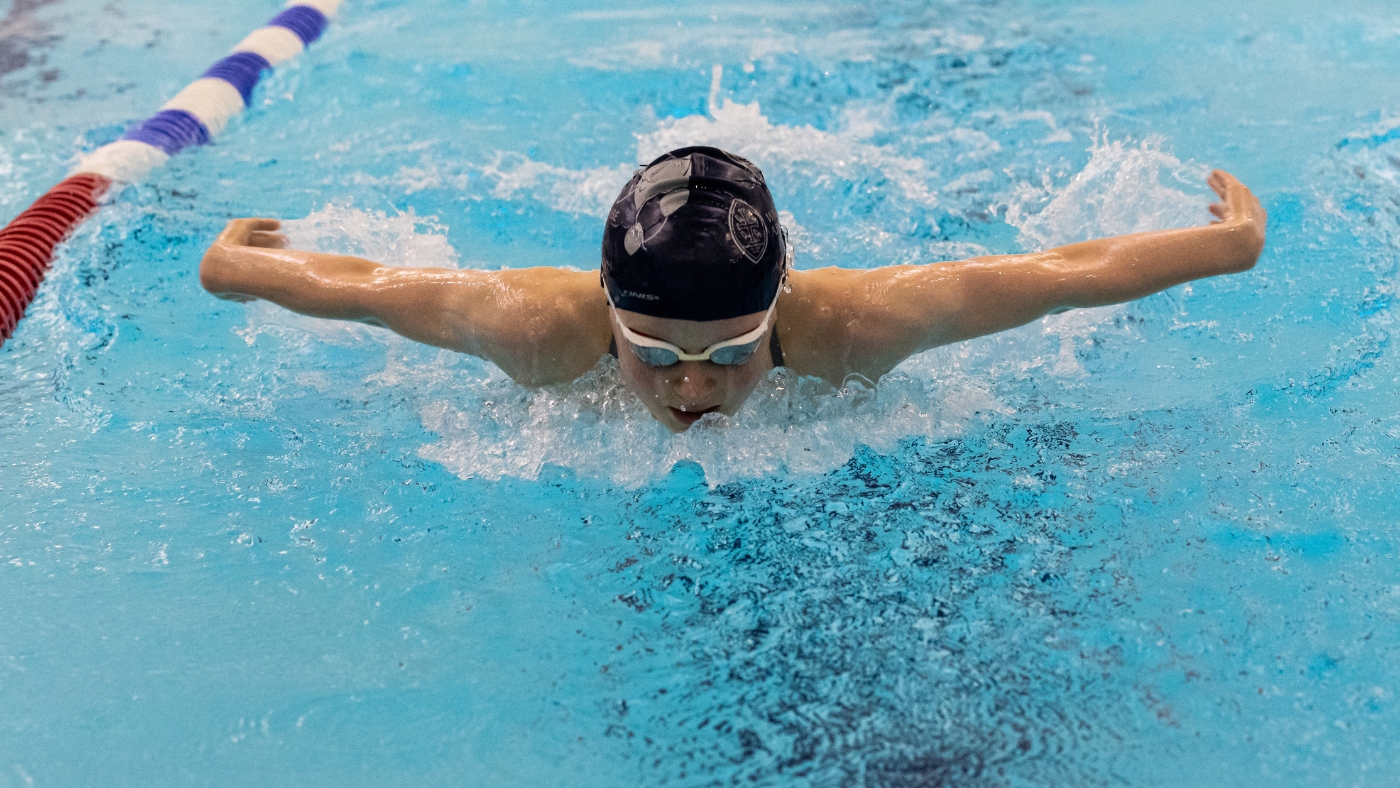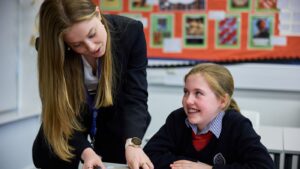

Discovering and developing talent
Academic Approach
Wycombe Abbey enables girls to open their minds and to develop their personal passions. The learning environment is supportive, yet challenging, with a sense that pupils and their teachers are on an educational journey together. We pride ourselves on the outstanding teaching provided by our specialists who communicate a genuine love of their subject and serve to inspire the girls they teach.
We believe that education should not simply be about delivering a curriculum and examination syllabus, but that real learning stems from stimulating intellectual curiosity and nurturing a love for the subjects being taught, which will stay with our girls throughout their lives.
Academic Qualities
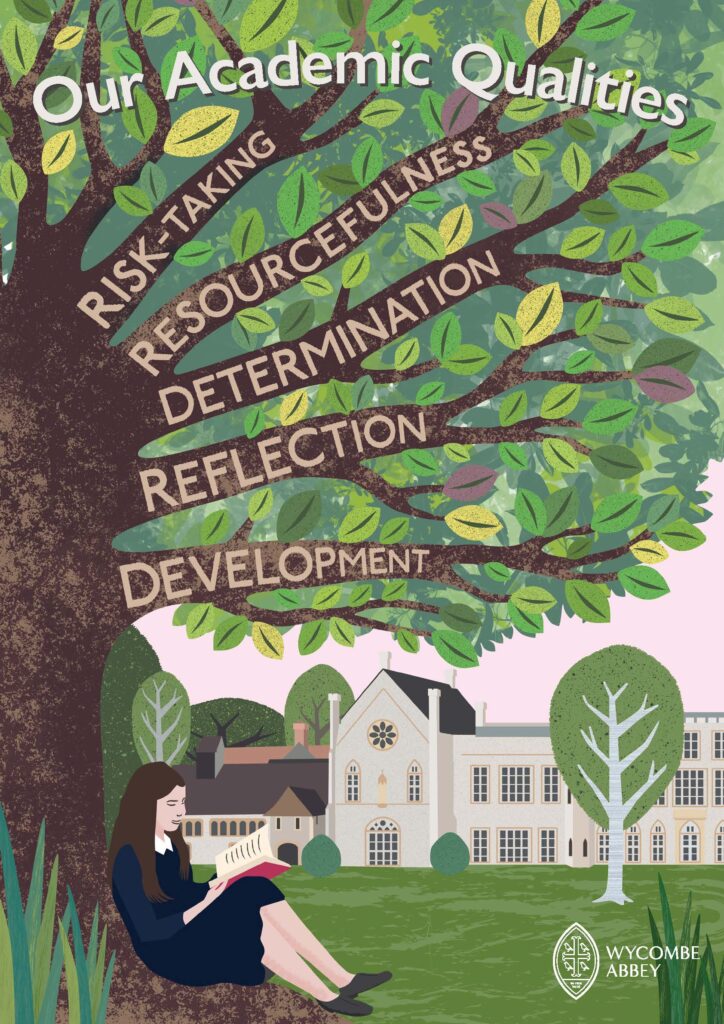
Wycombe Abbey is committed to Academic Excellence and we are aware that this means preparing pupils for success at school, and also at university and their careers beyond. We have identified those attributes that categorise successful learners, which we refer to as the Five Academic Qualities. They are: Risk-taking, Resourcefulness, Determination, Reflection and Development.
The five academic qualities are embedded within teaching and learning at Wycombe Abbey and we feel they are central to success both inside and outside of the classroom. Not only do they promote deep learning and higher-level academic thinking, but they also encompass lifelong learning skills. They support our vision of ensuring academic excellence and a future-focused approach.
Perhaps the most important of all the Academic Qualities is the first one: Risk-taking. This is the ability to take the vital first step of giving something a go, even if it is not immediately clear that success is possible. This is a character trait that all people are born with, otherwise, none of us would be able to walk, but which can become eroded over time. The kind and supportive atmosphere of the School is central to giving pupils the confidence to take academic risks without fear of failure.
Inevitably there are times when things do not go according to plan, and we encourage pupils to develop the vital skills of resourcefulness and determination. We know that universities and employers are looking for flexible thinkers who can approach problems in different ways. Resourcefulness alone however is not always enough and there are inevitably some things that take time and effort to master, and the role of sheer hard work and determination should not be overlooked. We encourage our pupils to embrace challenges and to be prepared to stick at things even if they find them difficult initially.
It is well known that across all fields it is not necessarily those who show early promise who end up being the most successful. The hallmark of those who go on to achieve highly are those who never stop learning, and central to this is the ability to reflect on past performance and use this to learn from mistakes and adapt. We encourage pupils to take ownership of their own learning and to identify what they need to do to improve. We also promote a growth mindset where pupils believe that it is always possible to develop.
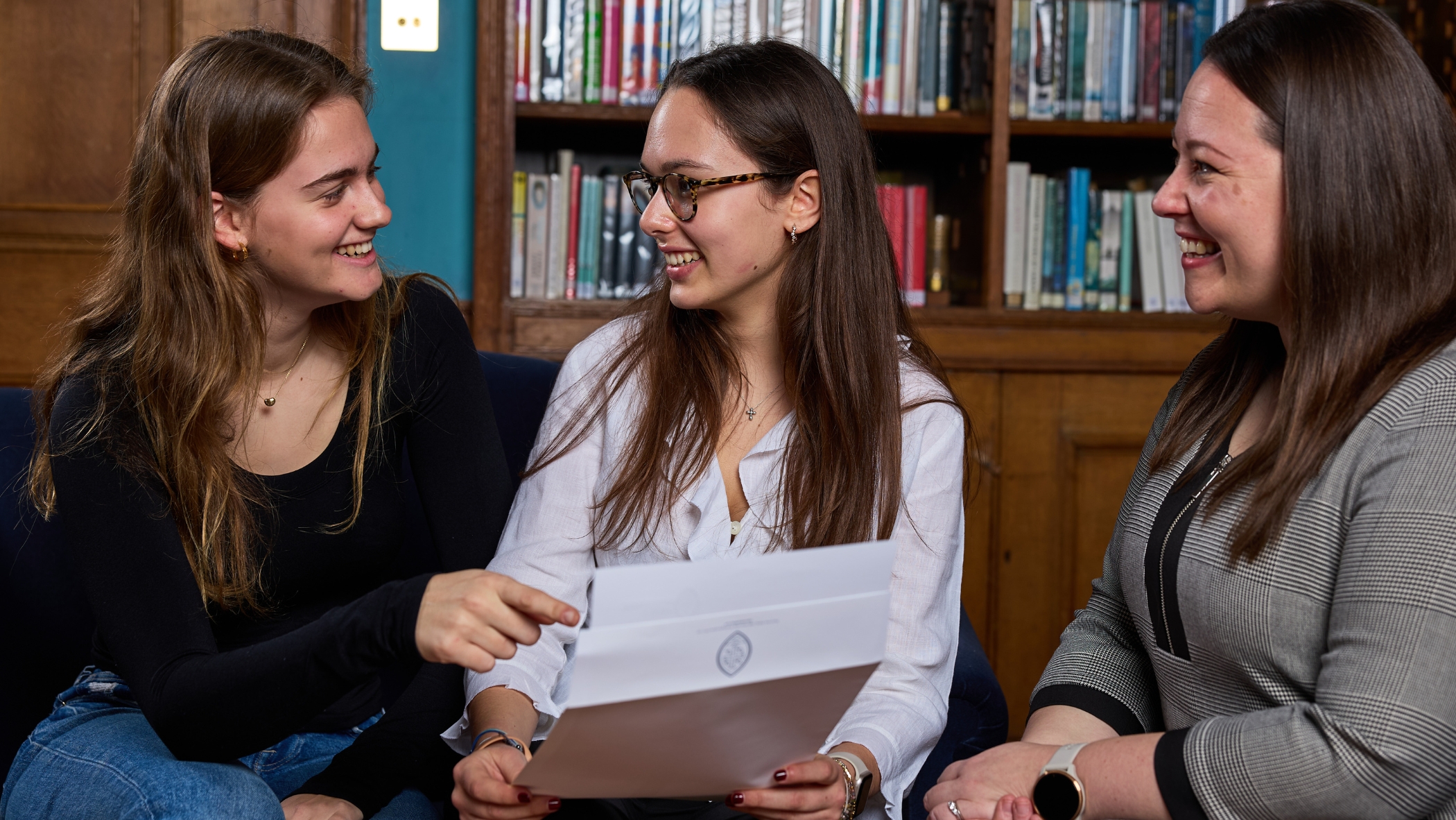
Achieving academic success
Examination Results
Wycombe Abbey has a long tradition of academic success. The learning environment is supportive, yet challenging and our teaching specialists communicate a genuine love of their subject, encouraging all our pupils to pursue an intellectual curiosity beyond the curriculum. Each year girls gain places at high-ranking universities on competitive courses globally.
As the UK’s top girls’ boarding school we consistently achieve superb academic success. Our girls perform exceptionally across many different disciplines, achieving excellent results in public examinations. The GCSE and A level results for 2023/2024 were outstanding. At GCSE, 88% of examinations were awarded 8 or 9 and 97% of results at 7 – 9. At A level, 95% of results were grades A*-B with 42% at A*.
Curriculum at a Glance
The curriculum provides a programme of study which is as broad as possible until the end of UV to enable girls to make well informed decisions about their academic futures. Later on there is the opportunity to specialise when choosing options for university.
UIII – LIV (age 11-13)
The UIII – LIV curriculum offers a comprehensive introduction to a wide range of academic, creative and technical disciplines. Girls study English, Mathematics, Sciences, Languages (Latin, Greek and Modern), Computing and Humanities (Geography, History and Religious Studies) as well as Art, Cookery, Design Technology, Drama and Music. PE and Wellbeing complete the offering and ensure girls’ emotional, social and physical development are nurtured.
UIV (age 13-14)
The UIV curriculum allows pupils to develop their learning on the subjects studied in UIII and LIV, but introduces an element of choice. All pupils continue to study English, Mathematics, Sciences, Languages (Latin, Greek and Modern), Computing and Humanities (Geography, History and Religious Studies). In addition, girls choose at least two, and usually three, subjects from Art, Design Technology, Drama and Music. They continue to study PE and Wellbeing. This provides a balanced and broad offering in readiness for making GCSE options choices during the UIV year.
GCSE (age 14-16)
We offer a large number of possibilities for subject combination at GCSE. We do not have predetermined option blocks and instead give girls flexibility to choose the subject combination which best fits their abilities, aspirations and personal passions. There are six compulsory subjects: English, English Literature, Mathematics, Biology, Chemistry and Physics. Girls also select four or five other subjects from a range of 15; at least one of those choices must be a modern language and another must be a Humanities subject.
A Level (age 16-18)
Our Sixth Form curriculum is designed to nurture individual interests and provide a solid foundation for university studies and the global workplace of tomorrow. We do not have predetermined blocks at A level. The timetable is devised around a girl’s individual subject choices, no matter how specialised or diverse. Initially, four A level subjects are chosen from 26 options. Pupils may decide to drop one at a later stage. Girls may also choose the Extended Project Qualification. All girls in the Sixth Form follow our Carrington Programme, which is carefully designed to cover all aspects of enrichment, including the development of critical thinking, leadership, research, and presentation skills, as well as key aspects of careers education, health, and wellbeing. Our timetabled University Preparation Programme, which runs from the start of the Spring Term in the LVI year, centres around three key principles: interdisciplinarity, collaboration and challenge. Girls also volunteer in the local community, with timetabled, weekly local primary school placements for all Sixth Form pupils.
Please see below a report of the academic year 2023 – 2024.
| Monday, Tuesday, Thursday | Wednesday | Friday | Saturday |
| 7:30am Breakfast | 7:30am Breakfast | 7:30am Breakfast | 8:00am Breakfast |
| 8:20am Registration | 8:20am Registration | 8:15am Registration | 9:00am Period 1 |
| 8:30am Chapel (Mon/Thu) / Tutor Meeting (Tue) | 8:30am Tutor Meeting | 8:20am School Meeting | 9:40pm Period 2 |
| 8:45am Period 1 | 8:45am Period 1 | 8:50am Period 1 | 10:15am Break |
| 9:25am Period 2 | 9:25am Period 2 | 9:30am Period 2 | 10:35am Period 3 |
| 10:00am Break | 10:00am Break | 10:05am Break | 11:15am Period 4 |
| 10:25am Period 3 | 10:25am Period 3 | 10:25am Period 3 | 11:50am Lunch |
| 11:05am Period 4 | 11:05am Period 4 | 11:05am Period 4 | 6:00pm Supper |
| 11:45am Period 5 / Lunch | 11:45am Period 5 / Lunch | 11:45am Period 5 / Lunch | |
| 12:25pm Period 6 / Lunch | 12:25pm Period 6 / Lunch | 12:25pm Period 6 / Lunch | |
| 1:00pm Period 7 / Lunch | 1:00pm Period 7 / Lunch | 1:00pm Period 7 / Lunch | Sunday |
| 1:40pm Period 8 / Lunch | 1:40pm Period 8 / Lunch | 1:40pm Period 8 / Lunch | 8:30am Breakfast |
| 2:20pm Period 9 | 2:20pm Period 9 | 2:20pm Period 9 | 9:30am – 1:30pm Brunch on Evensong Sundays for LIV-UVI |
| 3:00pm Period 10 | 3:00pm Period 10 | 3:00pm Period 10 | 10:30am Chapel |
| 3:35pm Tea | 3:40pm Period 11 | 3:35pm Tea | 12:00noon Lunch |
| 4:00pm Period 11 | 4:15pm Tea | 4:00pm Period 11 | 6:00pm Supper |
| 4:40pm Period 12 | 6:00pm Supper | 4:40pm Period 12 | 8:00pm Evensong |
| 6:00 Supper | 5:20pm Whole School Singing | ||
| 6:00pm Supper |
The study of Art develops creativity and confidence and gives girls a new language of expression. The expertise of our staff and technicians spans the artistic spectrum and includes in-depth knowledge of drawing and painting, printing techniques, creative textiles, dark room photography and digital imagery, tufting, ceramics and glass work. Girls gain first-hand experience working with a wide variety of materials and examination pupils have the opportunity to have individual tutorials with our specialist glass artist.
Pupils enjoy the opportunity to participate in specialist masterclasses such as life drawing and weekend workshops with visiting painters and craftspeople. Sixth formers lead and run the Art and Photography societies and lower school pupils use the Art rooms for enterprise, competitions and House activities.
All pupils are welcome to use the art workshops during the evenings and at weekends for recreational Art, either to supplement their lessons or to work on independent creative projects.
Trips are organised to visit Art galleries to engage with the work of a range of artists or to supplement cross-curricular learning. London and Oxford are popular destinations to support creative awareness and develop knowledge and understanding.
Click here for information on the range of extra-curricular opportunities available
UIII-UIV (age 11-14)
All the fundamentals of good practice are covered as girls learn independence and explore the possibilities of 2D and 3D disciplines. Work is undertaken in drawing, painting, ceramics, textiles, digital photography and graphic design by exploring short assignments for pupils to discover new areas in which to extend their knowledge.
GCSE (age 14-16)
The AQA GCSE course encourages personal work which develops problem solving and analytical skills. Practical skills, experimenting with a wide variety of media and techniques are encouraged and then applied to explore, experiment and refine individually chosen themes and ideas which culminate in individual and original work using a variety of scales. Artists and designers from a range of cultural and geographic backgrounds are referenced throughout the course in sketchbooks. Pupils can attend the life drawing sessions and are expected to use the studios in their free time and during weekends. Individual exhibitions are displayed at the end of the course.
A Level (age 16-18)
For the AQA A level course, pupils undertake rigorous, in-depth investigative work which encourages and develops in-depth knowledge and understanding. Curiosity and creativity are key in all aspects of research to develop original work. In the Sixth Form girls can also elect to take dark room and digital photography classes and participate in life drawing workshops. Pupils are expected to use the studios in their free time and during weekends.
Staff List:
- Head of Department: Miss Kay Williams BEd
- Miss Isabella Wilson BA, MA
- *Mrs Claudia Phipps BA, MA
Biology is the understanding and appreciation of the intricacies of the natural world and how lives are transformed by developments in biotechnology. Girls develop key research and observation skills and learn how to present data effectively. All lessons are taught by subject specialists in one of the three well-resourced Biology-specific laboratories.
Alongside the curriculum, pupils engage with a variety of clubs such as the Junior Science Club. Girls also take part in organised activities including lectures, Science Live and national competitions, for example the Biology Challenge and the Biology Olympiad. Recently, girls have had the opportunity to attend an Oncology Day at the University of Oxford where they explored a scientific approach to the medical field.
Educational trips also take place and in the past they have included an UIII trip to Jersey Zoo and a Sixth Form trip to the Peruvian Amazon.
UIII-UIV (age 11-14)
Pupils develop their understanding of how Biology influences their world through the study of life cycles, microscope use, sports science and health. They learn how to perform scientific investigations as they carry out dissections and monitor the spread of diseases. By the end of UIV girls have a fundamental understanding of biological principles and have started their preparation for the IGCSE examinations.
IGCSE (age 14-16)
The Edexcel IGCSE programme focuses on a variety of topics from the human organism to plants and the environment. As pupils complete practical investigations on enzymes and organs, they become well prepared should they choose to study Biology at A level. On top of this we aim to ensure that all girls are intellectually equipped with the knowledge needed to make informed decisions about topical issues such as genetic modification and climate change.
A Level (age 16-18)
The topics explored in the Edexcel course become more detailed in both breadth and depth and new fields such as bio-chemistry and epigenetics become central areas of investigation. We encourage pupils to start identifying the concepts that run through the subject and to understand how the different topics interact. Girls learn how principles studied in all three sciences are needed to appreciate how biological systems work from a molecular level up. Practical work is the heart of the A level course and pupils learn a variety of scientific techniques and the correct way to process and present their data and conclusions.
Staff List:
- Head of Department: Mrs Lizzi Wallace BSc
- Mrs Sally Wright BSc
- Miss Bethan Rowley BSc
- Mr Matthew Whiteley BA
- Dr Levi Fernandez BSc, PhD
- *Ms Stephanie Parkin BSc
- *Ms Laura Chapman BSc
Chemistry is the foundation of understanding the world. Through interactive teaching and frequent practical experiments, pupils develop advanced problem-solving skills as well as applied and theoretical knowledge of the subject.
The enrichment activities for Chemistry include clubs such as the Junior Science Club and Sixth Form Science Club, where girls make bath bombs, edible cinder toffee and paracetamol, as well as growing crystal ornaments and conducting flame tests. Other opportunities include lectures in School and trips to national conferences such as the Chemistry in Action Day and Science Live.
There are a wide range of competitions that are made available each year to our pupils from The Chemistry Olympiad and The Cambridge Chemistry Challenge to university and/or association essay competitions.
UIII-UIV (age 11-14)
Pupils are able to develop their science-based enquiry skills in a range of chemical contexts and there is a strong emphasis on practical competence. Girls take part in laboratory work frequently as they learn about a variety of subjects from solvents and the separation of mixtures to natural resources and atomic structure. By the end of UIV pupils will be confident learners who are capable of suggesting and carrying out experimental work to answer chemical questions.
IGCSE (age 14-16)
During the Edexcel IGCSE course, a rigorous foundation is laid down from the perspective of the nature of matter and chemical reactions. Pupils study topics such as bonding structure and industrial processes and explore methods of extracting metals. The emphasis is on problem-solving and analytical skills, mathematical manipulation and linking the theoretical to the experimental.
A Level (age 16-18)
The theories explored at IGCSE become more nuanced in the OCR A level course. Pupils develop a more subtle understanding of the balance between attraction and repulsion forces and their role in determining chemical reactivity. Mathematical skills become especially important with pupils studying rates of reaction as well as discovering physical evidence for reactions. There is a continued emphasis on learning through practical tasks and their subsequent evaluation. The course becomes very collegial in nature and pupils are exposed to, and encouraged to seek out, everyday developments in Chemistry.
Staff List:
- Head of Department and Head of Science: Mr James Young MA MSci MEd
- Dr Sharon George BSc, MSc, PhD
- Mrs Antonia McNeill BSc
- Mrs Anna Roberts BSc, MEd
- Mrs Krutika Sunil-Atkinson BSc, MAEd
- Ms Rachel Wilson, MSc
Chinese is an official language of the UN, the International Criminal Court and is a priority language for the Foreign and Commonwealth Office. Studying the subject opens doors into these fields and gives girls the opportunity to broaden their cultural and linguistic knowledge. Our Chinese curriculum promotes language learning in a rich cross-cultural context, offering a wide range of language and cultural enrichment activities and opportunities. In addition to workshops in and outside the classroom, other opportunities include visits to the British Museum, lectures given by guest speakers and taking part in national competitions.
UIII-UIV (age 11-14)
The course begins in UIII and UIV when the foundations are laid. The aim of the class is to promote confidence both in speaking and writing, as well as establishing a firm basis in grammar and vocabulary. The UIII course is designed for absolute beginners, with two sessions per week. The UIV course offers four sessions weekly. Girls learn to speak and write about themselves and the immediate world around them.
GCSE (age 14-16)
In the AQA course, girls study a range of topics related to their own lives and choices. They learn to cope with increasingly spontaneous dialogues and discuss relevant issues, expressing their opinions creatively. This curriculum is designed for non-heritage speakers and has two double sessions per week. The weekly conversation classes start in the Lower Fifth and are focused on exam preparations.
Hanyu Shuiping Kaoshi (HSK) Course (age 16-18)
We are now offering the Hanyu Shuiping Kaoshi (HSK) course replacing the Pre-U programme. In the Sixth Form, we offer a bespoke course, which provides non-heritage background learners with a progression pathway from GCSE level Chinese to the internationally recognised HSK level 3 and 4 qualifications. This course is an official examination designed to assess the Chinese language proficiency of learners from beginners to advanced level (divided into Levels 1-6). It is an internationally recognised standard in assessing learners’ Chinese language level and the result can be used to apply for scholarships in China. It is also accepted by universities and international companies as proof of Chinese proficiency. The HSK course covers a variety of topical issues and cultural elements related to Chinese-speaking countries/regions, which are blended into the listening, reading, writing, and speaking skills tests. Pupils’ all four skills are refined to the point where they become near-native speakers and can confidently communicate with native speakers in all kinds of contexts ranging from fulfilling everyday life needs to formal workplace interactions.
Staff List:
- Head of Department: Ms Xiaoyan Wan BA, MA
- Mrs Zhie (Joline) Liu MA
- *Mrs Xiu Pan BA, MA
- *Ms Qin Wang, BA, MA
- *Ms Yinghua Han BA
Classics is the study of the language and culture of the Ancient Greeks and Romans. Pupils learn the subtleties of close analysis and puzzle-solving as they gain a rigorous understanding of these early civilisations. Teaching staff bring the topics to life with a variety of specialisms including philosophy, linguistics, history and literature.
The Department runs the Classics Society which involves weekly meetings and other events, such as a bake sale for Classics for All. Lectures are held at School and feature visiting speakers such as Professor Simon Goldhill, Dr Bruno Currie and Dr Olivia Elder. We also have a thriving Classics Book Club which meets on a termly basis and is open to all girls from LV upwards; in recent meetings, we have discussed Kamila Shamsie’s Home Fire, Pat Barker’s The Silence of the Girls and Robert Harris’ Imperium. All girls are encouraged to enter essay, translation and other classical competitions which are both internally and externally judged.
Trips to the British Museum and international sites of classical interest, such as Pompeii and Athens, run to complement the curriculum and pupils have the opportunity to see regular plays, such as the Medea at Soho Place and Antigone at Regent’s Park Open Air Theatre. Our Sixth Form pupils also participate in Literature group trips to Eton, where girls meet to discuss works of classical authors, such as Plato and Ovid.
UIII-UIV (age 11-14)
Pupils are introduced to both Latin and Greek and develop their understanding of the grammar and syntax of both languages. This linguistic challenge greatly improves their analytical and problem-solving skills. Alongside this, they explore the worlds of Greek myth, Rome, Pompeii, Roman Bath and Alexandria, in order to go beyond the language and understand the people who spoke it. The subject is widely accessible and broadens the girls’ history, philosophy and art knowledge.
GCSE (age 14-16)
With increased linguistic confidence, pupils taking the OCR course begin to explore texts written by classical authors, such as Tacitus, Herodotus, Virgil and Homer in the original language. Girls develop their analytical skills and are encouraged to comment stylistically on prose and verse selections. Readings of this literature are enhanced through a greater focus on the wider historical context.
A Level (16-18 years old)
In the OCR A level course, pupils go into substantially more depth, both linguistically and analytically. Making use of their solid foundations in both languages, they identify the mechanics of a sentence and are encouraged to translate more idiomatically. A more holistic approach is taken with the literature; pupils study four separate texts from four different genres over the course of two years, and they develop broad expertise across a range of areas. Classical Civilisation, the study of texts in translation, sculpture, art and wider topics not covered in either Latin or Greek, is also offered. It is a unique challenge, offering extensive study for all pupils, including those with no previous experience in Classics.
Staff List:
- Head of Department: Dr Christina Tsaknaki BA, MSt, PhD
- Miss Emily Boswell MA
- Miss Rachel Franks BA, MA
- Mr Oliver Murphy BA
- Miss Charlie Pemberton MA, MPhil
- Miss Tara Strange BA
- Mrs Jacky Tidbury MA, NPQSL
- *Mr James Bamforth, BA, MA
- *Mrs Katharine Harrison MA
The Computer Science Department aims to ensure that all girls have a thorough understanding of computer science, computational thinking and digital literacy. As they progress through the school, the girls develop their skills at solving a wide range of problems using algorithms and programming languages. They also gain a deep understanding and can discuss critically the ethics and environmental factors of technological solutions including, for example, AI, robotics and machines learning.
We have thriving numbers of girls taking the GCSE and A level Computer Science options. With an increasing number of girls going on to Higher Education to either study Computer Science or related subjects. We are keen to develop links with other subjects not only science and engineering but also across the arts and humanities. There is a flourishing programme of talks, trips and activities to engage pupils. We build on links with universities, industry and leaders in the field (especially women). For example, our Lower School project on the Mars Rover was brought to life by a talk from a former pupil who was working with NASA on testing the latest rover. The department is innovative and utilises new technology to support learning including the Raspberry Pi, VR headsets, BBC micro:bits and robotics, to name but a few.
There is a thriving computer society, mainly run by the girls who organise hackathons and various other events, competitions, and journal writing. Pupils enter competitions such as the National Cyber Security Centre’s CyberFirst competition and the University of Oxford’s Bebras challenge. In the past, girls have achieved particular success solving codes in the Alan Turing Cryptography Competition.
There is a digital learning programme which aims to standardise the use of devices across pupils and staff to allow for effective use of technology in and beyond the classroom.
UIII-UIV (age 11-14)
In weekly lessons, we teach the girls to be responsible, knowledgeable and creative digital citizens. They learn how to use current and emerging technology in a safe and responsible manner. Computational thinking is a key skill that they can apply to many problems outside the subject. For example, the ethics of self-driving cars. Pupils gain an understanding of simple Boolean logic and its uses in circuits and programming and how numbers are represented in binary. Coding skills are developed to enable entry to our GCSE programme and girls create and repurpose digital artefacts for specific audiences. We link our topics to the real world and integrate with other subject areas culminating in an end of year project.
GCSE (age 14-16)
The CAIE IGCSE course in Computer Science is an excellent opportunity to investigate how computers work and how they are used, and to develop computer programming and problem-solving skills. There are some exciting new features such as digital currency, AI, machines learning and the uses of robots on the syllabus.
A Level (age 16-18)
The OCR A level Computer Science course inspires and challenges girls to apply the knowledge they have gained of creative and technical skills. The girls study the components of a computer and their various uses, how data is stored within different structures and advanced Boolean algebra. Computational thinking and programming features are a core thread throughout the course. The Computer Science A level goes well with any other subject and can be a good complement to the humanities as well as maths and science. Increasingly, girls are going on to study Computer Science and related subjects at some of the top universities in the world.
Staff List:
- Head of Department: Mr Ka Ho Wong BSc
- Mrs Sharon Ettridge BSc
- Mr Samuel Wilson BSc
Our world-class facilities are hygienic and organised, and we feel that Cookery provides our girls with the nutritional understanding and kitchen skills vital to prepare them for the future. Girls have lessons on the core timetable and can attend evening and weekend workshops, inspiring them to explore new dishes and have fun when cooking. Staff listen to requests when planning sessions and healthy fresh ingredients are explored with recipes loaded online for girls to cook for the family at home.
UIII-LIV (age 11-13)
Pupils are encouraged to discover the pleasures of cooking and to prepare food with confidence. Decisions regarding flavouring and tasting during cooking are encouraged. Practical skills are developed, and girls are taught everything from how to hold a knife to how to present fine dining and make healthy choices. Girls enjoy the social interaction and discussions about healthy substitutes.
Sixth Form (age 16-18)
As they begin to live more independently, all girls in the Upper Sixth take part in the Clarence cookery induction day which introduces them to safe use of their House kitchen and nutritious cooking. Girls in the Lower Sixth have the opportunity to complete the industry-recognised Leiths Certificate. Pupils who embark on this course develop skills to a professional level, experience cooking meals, exploring and presenting a range of fine dining dishes and, towards the end of the course, are given an awareness of the most suitable accompanying wines. Experimentation with ingredients and an awareness of food from different cultures is encouraged
Staff List:
- Head of Department: Miss Kay Williams BEd
- Mr Tom Dimmock BA
Staff List:
- Head of Department: Mr John Doherty BSc, MA
- Miss Helen Allen BA
- Miss Lucy Crampton MEng
- *Mr Howard Haughton BEd
- *Mr Rowland Hawkins
Drama encourages growth in confidence and the development of valuable core life skills such as teamwork, negotiation and communication. Girls are able to take part in performance opportunities throughout their time at the School and learn to write, design, direct and market their own plays. Each year, all pupils in UIII perform in a production in the Summer Term, the Fourth Form take part in a joint production, and the LV enjoy an inter-house play competition and the opportunity to take part in the Shakespeare for Schools Festival. We also collaborate with the Music Department on a school musical every two years, which is open to pupils in LIV and above. Older pupils can take part in the Senior Production as well as the Clarence Play and LVI pupils have also taken work they have directed to the Edinburgh Festival over the summer.
Speech and Drama is taught in small groups to girls working towards LAMDA examinations, with an emphasis on co-operation and creativity.
The Department runs regular trips to see plays at theatres in Oxford, Stratford-Upon-Avon and London.
Click here for more information on the full range of extra-curricular opportunities Available
UIII – UIV (age 11-14)
Pupils cover a range of topics, texts and genres in UIII to UIV, all of which are designed to challenge and engage the pupils and to encourage them to work collaboratively and creatively.
The UIII will work on scenes from Twelfth Night, devise their own work based around myths and legends and study Greek theatre and Commedia dell’arte in the first year at Wycombe Abbey.
As well as exploring a range of performance skills and techniques, the Drama department also seeks to develop the following:
· Public speaking skills
· Empathy for others
· Collaborative and cooperative skills
· Critical and analytical thinking
· Self-confidence
Drama is particularly important for UIII pupils in terms of ‘breaking the ice’ in September and asking them to work effectively (and have fun!) with their peers as they start their careers at Wycombe Abbey.
The Drama Department also offers a wide range of extra-curricular opportunities from UIII through to UVI. There are a variety of productions for all year groups to be involved in throughout the year as performers or backstage/as technical support for the shows.
Parents are warmly welcome to join us to watch many of the performances throughout the year. There is a drama society that pupils can join and girls are also given the chance to go on trips to the theatre as often as possible.
In addition to this, pupils can take extra lessons in graded LAMDA examinations from the LIV upwards.
Drama can be pursued as an exam subject after UIV and is a popular GCSE choice. Girls in UIV will be given information on how the Drama GCSE is comprised and some of the work covered in UIV is designed to replicate some of the GCSE specification.
A selection of productions from the last few years:
· Julius Caesar
· The Rise and Fall of Little Voice
· Grimm Tales
· King Lear
· Blue Remembered Hills
· Playhouse Creatures
· Kindertransport
· A Midsummer Night’s Dream
GCSE (age 14-16)
We now use the Eduqas exam board at GCSE. The course is 60% practical and has a written exam at the end of UV worth 40%. Pupils at GCSE are expected to devise their own drama pieces, perform a scripted piece for an examiner, study a set text (from a list provided by the board) and also develop directorial, analytical and evaluative skills. We will see at least two productions during the GCSE course and girls must answer one exam question on one of the productions we see together.
A Level (age 16-18)
The A level course seeks to build on the skills learnt at GCSE and requires pupils to take ownership of their work, creating and analysing drama from the point of view of an actor, director and designer. Pupils will also be expected to develop more sophisticated writing skills and to think creatively about how they might interpret plays and texts. Pupils will also need to be able to speak and write confidently about technical aspects of theatre and will be asked to analyse and evaluate several pieces of live theatre seen during the A level.
We deliver the AQA specification, which consists of three components; Creating Drama (devising), Making Theatre (interpreting a script/text) and Analysing Drama and Theatre (exam).
Staff List:
- Head of Department: Mr James Harrington BA
- Ms Christina Jones BA, MA
- Ms Louise Maddison BA
- Mrs Jessica Woodward BA
- * Mrs Amanda Terrill BA
- * Mrs Katie Thorpe LLAM, LALAM
- develop an interest in, and enthusiasm for, the subject;
- appreciate the contribution of economics to the understanding of the wider economic and social environment;
- develop an understanding of a range of concepts and an ability to use those concepts in a variety of different contexts;
- use an enquiring, critical and thoughtful approach to the study of economics and develop an ability to think as an economist;
- understand that economic behaviour can be studied from a range of perspectives;
- develop analytical and quantitative skills, together with qualities and attitudes that will equip them for the challenges, opportunities and responsibilities of adult and working life.
Staff List:
- Head of Department: Mrs Alison Kiln MA, MBA, MSc
- Mr Tom Startup MA, MPhil
The study of English is all about discovery and the pleasure found in reading and pursuing new ideas. It is an opportunity to join the greatest, longest conversation in humanity and, in doing so, to stir your heart, open your mind and feed your soul. Learning how to communicate in a clear, creative and compelling manner is critical for a successful education and for flourishing in the world beyond school. Led by passionate academics and skilled teachers with a diverse range of specialisms and interests, the English Department seeks to nurture a love of literature that will last a lifetime, while encouraging pupils to become writers and speakers who will use their voices to shape the world.
Complementing the curriculum, seminars, lectures and talks are planned throughout the year, with university professors, published authors and Wycombe Abbey Seniors sharing their passions and imparting wisdom. The School newspaper, The Publication, is edited by pupils and overseen by the English Department. Girls apply their writing and public speaking skills in a selection of enrichment opportunities, including the UIII-UIV poetry declamation competition, essay competitions and the annual school-wide poetry writing competition. The LitBit podcast, recorded by a wide range of staff and pupils, is broadcast globally, and collaborations with other schools, both nationally and internationally, are sought to enhance the experience of exploring literature.
Pupils enjoy the opportunity to take part in their own Carnegie and Booker awards ceremonies, while each year group is encouraged to undertake a reading challenge to widen the scope of their reading and encounter new ideas. Each year, a pupil is selected as the Poet Laureate to be the poetic voice of the School, helping us all to find the words with which we can express the many aspects of life at Wycombe Abbey.
The Department also runs numerous theatre trips throughout the year to London and Stratford to see plays such as The Duchess of Malfi, A Midsummer Night’s Dream and Hamlet, alongside in-house screenings of a wide range of drama. Opportunities for residential trips to sites of literary interest are also sought and have previously involved Wordsworth’s Dove Cottage, the Brontë Parsonage and a Yeats Tour of Ireland.
UIII-UIV (age 11-14)
Our UIII-UIV curriculum aims to develop core comprehension and composition skills, doing so alongside the study of a range of accessible and engaging poetry, prose and drama. Pupils explore literature from different time periods and genres, such as such as Much Ado about Nothing, When the Sky Falls, Copper Sun and Blood Brothers, fostering a hunger for literary discussion and learning how to respond in analytical and creative forms. With digital media taking an increasingly prominent role, pupils learn how to adapt their use of language to suit different contexts and forms, while debating activities serve to build confidence and composure.
IGCSE (age 14-16)
Having established a strong foundation in literary study and composition in UIII-UIV, the IGCSE courses in English Language and English Literature provide a fabulous opportunity for pupils to delve into a selection of enriching texts in a detailed and exploratory manner while further refining their different modes of expression. Pupils explore one substantial novel, one Shakespeare play, a collection of 15 poems, and a selection of unseen poetry and prose, nurturing their critical voice and learning how to shape compelling arguments. The English Department encourages girls to go ‘beyond the syllabus,’ enriching the study of examined works such as Pride and Prejudice and A Midsummer Night’s Dream with various other texts and theatrical experiences to provide greater contextual appreciation.
IGCSE ENGLISH LITERATURE SYLLABUS
IGCSE ENGLISH LANGUAGE SYLLABUS
A Level (age 16-18)
If you love reading, talking and writing about literature, then it is hard to imagine a more suitable A level subject for you. The OCR syllabus introduces pupils to a superb range of drama, prose and poetry, including Hamlet, A Doll’s House, Selected Poems by Christina Rossetti, The Great Gatsby and The Grapes of Wrath. Developing an appreciation of the context within which these texts were written, while exploring the views of critics and other readers ensures that pupils’ understanding of the literature they encounter is rich and nuanced. Pupils are expected to read widely beyond their set texts, feasting on the literature at their disposal as they become confident, astute literary critics.
Staff list:
- Head of Department: Mr Samuel Lenton MA
- Second in Department: Mrs Amy Taylor-Davis MA
- Head of Libraries: Mrs Hannah Rogers-Green BA [Maternity Leave] / Mrs Susannah Morrisby BA [Maternity Cover]
- Miss Cat Hoyle MA, MEd
- Ms Hannah Killow MTeach [Fixed Term]
- Mr Samuel Joyce BA
- Miss Marie Millwood BA
- Ms Konstantina Pritsou BA, MA
Studying French opens up many social, cultural and professional opportunities, with French-speaking countries representing the UK’s third biggest export market. In lessons, pupils develop their receptive and communicative skills by working with a range of books and digital resources. Teachers make frequent use of authentic material (including music, news articles and literature) in order to foster an appreciation of the cultures of France and the French-speaking world.
There is also a very wide range of extra-curricular events and competitions organised by the Department every year: these include attending lectures on social and historical themes pertaining to the French-speaking world, translation workshops in school, study days at the BFI and overseas trips. The department hosts a very popular termly French book club, and runs weekly grammar clinics and news clubs. Pupils are encouraged to practise their language skills in regional and national competitions such as the Oxford University Flash Fiction prize, the Anthea Bell Prize for Young Translators, and the Joûtes Oratoires, a debating competition. Even if pupils stop learning French as a curriculum language, they are welcome to participate in all that the French Department has to offer.
UIII-UIV (age 11-14)
The French course is devised to help girls understand both the language and the mind-set of the French. In our lessons we teach both a technical approach to translation and a more communicative approach to the language; the focus is very much on introducing the girls to the culture and lifestyle of the whole French-speaking world, not just France. Pupils expand their vocabulary to discuss hobbies, places and health issues amongst others. Lessons are interactive, varied, and fast-paced, combining digital technologies and more traditional methods.
GCSE (age 14-16)
In the Edexcel IGCSE course, girls study a range of topics related to their own lifestyle and choices and those of other people, especially those in French-speaking countries. They learn to cope with increasingly spontaneous language, discuss issues, and express their opinions creatively. Classes are supported by weekly conversation lessons in small groups to promote oral fluency.
A Level (age 16-18)
In the Sixth Form we continue to study topical themes such as radicalisation and marginalisation, the youth attitudes towards the electoral system, and the importance of heritage in French-speaking countries. Verbal and reading skills are refined to the point where pupils become near-native speakers and can analyse classical French literature and iconic French films in the target language. Pupils are encouraged to adopt an increasingly independent approach to their learning, and weekly conversation lessons with a native speaker help pupils to develop their oral proficiency.
Staff List:
- Head of Department: Ms Sophie McIvor BA
- Mr Gareth Cadman BA
- Ms Sophie Dubois BA
- Ms Anabela Figueira Licence
- Miss Anna-Juliette Hamilton MA
- Ms Lucy Nott MA
- Mrs Elena Woods BA
- *Mrs Laura Flores BA
- *Mrs Mireille Lavollee
Geography is central to our understanding of the physical world, its human inhabitants, and the intricate interactions between the two. Through studying the subject, pupils gain the knowledge and skills necessary to not only navigate and excel in the contemporary global environment but also to become responsible and enlightened global citizens. Our departmental staff bring these concepts to life through a dynamic curriculum with an array of specializations, ranging from plate tectonics and place study to the critical topics of climate change and global development.
Pupils actively engage in our Geography Society, as we offer an exciting array of activities and opportunities to attend thought-provoking lectures from accomplished guest speakers. To grow a deeper understanding of the world and topical issues, the Department also provides access to geographical publications like The Geographical and Geography Review encouraging pupils of all ages to follow their own paths of inquiry.
A wide variety of trips take place throughout the year include a Sixth Form visit to study urban landscapes in London and a residential field trip to Somerset to carry out practical fieldwork. Our GCSE geographers gain an insight into investigative geography at Preston Montford FSC. In addition, international trips are run to experience differing landscapes and cultures, including visitsto Morocco and Iceland.
UIII-UIV (age 11-14)
In UIII we delve deeply into the human and physical geography of Africa in our continent profile study. Pupils apply their own experiences to Geography through the study of tourism and its impacts. We also travel the globe to the Amazon Rainforest, focusing on the conditions of the rainforest and its rich biodiversity. Our LIV geographers explore the Arctic and the issues facing this vulnerable ecosystem. They then look at microclimates, as well as the role of the growing population on the future of our food supply. In UIV, geographers are encouraged to think about their own actions in a geographical context through the impacts of fast fashion. We explore the immediate and long-term impacts of climate change and extreme weather events, finishing with an in-depth study of sustainability and future demographic changes. During this key stage, pupils also focus on current world politics and issues such as natural disasters and population growth.
IGCSE (age 14-16)
The Edexcel IGCSE course focuses on a broad mix of physical and human geography, including fieldwork investigations and creating enquiries into river environments and changing urban environments. Economic activity becomes especially important, and the development of human welfare is explored at a range of scales. We also run a residential field trip, where pupils gain an opportunity to explore the landscapes we have been learning about through observation and analysis.
A Level (age 16-18)
The A level course is a chance to look at the bigger picture of all aspects of geography that we have been learning about over the years and to create links with the other subjects on offer. Pupils observe how large-scale systems affect our physical world, and how space and place are central concepts to the study of human geography. We also focus on key geographical themes, including coastal landscapes, the geography of disease, and human rights. Pupils are encouraged to read and make links with current affairs. A central part of A level Geography is the personal independent investigation, where pupils focus on a part of geography that most interests them, setting hypotheses, carrying out primary and secondary research and, through detailed analysis, drawing original conclusions. This is introduced to geographers through a residential field trip, a fantastic opportunity to explore an area of geography that is of interest to them.
Staff List:
- Head of Department: Mr Simon Bannister BSc, MA
- Mrs Lucy Akers BA, MEd
- Mrs Charlotte Durden BSc, MSc
- *Mrs Margot Wood BA, MNatRes
Studying German opens opportunities to the language, culture and marketplace of three leading European nations at the very forefront of science, technology and business. Around a quarter of the people in the EU speak German as their native language.
The Department organises debating competitions and enters girls into poetry, short story and film competitions as well as the Oxford German Olympiad. Pupils also engage in political discussions at the News Club and take part in the German Film Day hosted in London.
Regular theatre trips are available.
UIV (age 14)
This is a fast-track course to lay the foundations of German vocabulary and grammar with the aim of promoting confidence in both speaking and writing. Classes include a weekly session in a Language Laboratory and girls are encouraged to take an interest in aspects of German culture.
IGCSE (age 14-16)
In the Edexcel IGCSE course, girls study a range of topics related to their own lifestyle and choices and those of other people, especially those in German-speaking countries. They learn to cope with increasingly spontaneous language, to discuss issues and to express their opinions creatively. Classes are supported by weekly conversation lessons in small groups to promote oral fluency.
A Level (age 16-18)
Topics in the A level course are based on a broad range of topical issues and current affairs related to German speaking countries. The course involves the critical study of German films and/or works of literature. Oral skills become increasingly refined and the ability to conduct detailed independent research is a key requirement throughout. Girls become self-motivated in their study and develop a unique level of creativity and precision.
Staff List:
- Head of Department: Mrs Marney Dworkin MA
- Dr Daniela Havenstein BA, PhD
- *Ms Agnes Dodwell BA, Diploma, CertTESOL
The study of British political systems and political ideologies develops analytical ability and communication skills. Girls gain a critical awareness of the relationship between political ideas, institutions and processes as well as an informed understanding of contemporary political structures and issues in their historical context. Politics lessons generally involve much lively debate and individual opinions, both of which are very much encouraged. Girls learn to listen carefully to alternative views and incorporate these ideas into their own arguments.
The junior and senior Politics Societies are very popular and host school-wide votes on current topics as well as organising events such as Wycombe Abbey’s own ‘Question Time’.
The Department arranges talks from visiting speakers including MPs, MEPs and Members of the House of Lords as well as debates with other schools such as the Royal Grammar School, High Wycombe and John Hampden Grammar School. There is also an opportunity to attend a yearly Sixth Form Politics Conference in London.
A level (age 16-18)
The A level course focuses on government and politics in the UK and on global political ideologies. Girls explore the ideas of key political thinkers and focus on core philosophies such as Conservatism, Liberalism and Socialism. The course instils pupils with the ability to interpret and evaluate political information critically and to form rounded arguments and mature judgements.
Staff List:
- Dr Emma Lorimer MA, DPhil
- Mr Neill George BA
- Mrs Charlotte Shilling BA, MEd
The broad History curriculum challenges girls through a variety of British, European, and world history. Girls learn to think, write, and articulate opinions analytically, and develop critical skills in evaluating texts and evidence. Work is often tackled collaboratively and through examining fascinating content from the past, pupils gain valuable wisdom about the world.
Aspiring historians join the History Society to engage in historical discussions, play history-themed games, and re-enact significant events. They contribute to various school journals, including our academic history journal, and are encouraged to take part in national competitions. The Department also hosts a range of events, including evening enrichment seminars, with each term featuring a new theme such as the Arab-Israeli Conflict or the Troubles in Northern Ireland. Notable past speakers include the distinguished historian Tracy Borman. Additionally, students participate in annual trips to sites of historical interest, such as First World War battlefields and memorials in Belgium and France, and key Cold War locations in Berlin.
UIII-UIV (age 11-14)
Pupils explore a diverse range of historical topics, including medieval Britain, Tudor and Stuart Britain, the British Empire, the American War of Independence, the American Old West, the Crusades, the Hundred Years’ War, the abolition of slavery, the Industrial Revolution, suffrage reform, and the First World War. The curriculum emphasises enquiry-driven learning about significant periods and events while developing a strong sense of chronology and honing skills in analysing and evaluating historical evidence.
IGCSE (age 14-16)
Girls study exciting and important courses on Weimar and Nazi Germany and 20th century international relations in the CIE IGCSE curriculum. Pupils are equipped with an understanding of the crucial events, developments, and ideas of the 20th century, ideal preparation for being informed citizens of the 21st century.
A Level (age 16-18)
In the AQA course, girls study fascinating and diverse courses on Stuart Britain 1603-1702, revolutionary and Stalinist Russia 1917-1953, and a centre-designed coursework programme on British relations with India 1845-1947. By the end of Upper Sixth, girls will have developed sophisticated source interpretation skills and the ability to write persuasive and original lines of argument
Staff List:
- Head of Department: Mr Neill George BA
- Mrs Vicky Fawkes BA
- Mr Edward Fitzgerald BA, MA, LPC
- Ms Christina Jones BA, MA
- Dr Emma Lorimer MA, DPhil
- Mr Luke Scott BA
- *Mr Stephen Ramsay, BA
- Mrs Charlotte Shilling BA, MEd
Studying History of Art provides a unique insight into the history, ideas and culture of different societies across the globe, spanning from the ancient world to the present day. An array of specific paintings, sculptures and buildings are studied in-depth, whilst visual analysis skills are developed allowing pupils to comment meaningfully on any works of art they encounter.
Studying the Edexcel History of Art course develops pupils’ understanding of the relationship between society and art. The course begins by developing core skills that enable pupils to use technical terminology to discuss the formal features of any painting, sculpture or building. Two themes are then explored: ‘Identities in Art and Architecture’ and ‘Nature in Art and Architecture’. The former considers how art and architecture have been used to express identity, be it status, character, gender, nationality or ethnicity. Artists and architects studied include Jan van Eyck, Marc Quinn, Frida Kahlo and Christopher Wren. The second theme looks at how nature has provided a source of inspiration in art and architecture and how natural materials have been used across time and place. Artists studied include J M W Turner, Barbara Hepworth, Katsushika Hokusai, and Frank Lloyd Wright.
Pupils also study two key art historical periods in-depth, developing their own research skills and using critical texts. ‘Invention and illusion: The Renaissance in Italy (1420-1520)’ explores a period of extraordinary artistic achievement focusing on artists/architects such as Botticelli, Brunelleschi, Donatello, Raphael and Michelangelo. ‘Power and persuasion: The Baroque in Catholic Europe (1597-1685)’ investigates the artistic response to the political and religious turmoil of the age in Italy, France, Spain and the Spanish Netherlands through the works of artists such as Caravaggio, Rubens, Velazquez and Bernini.
The Department offers a wide range of enrichment activities and opportunities for pupils to see art and architecture. There is a bi-annual trip to Florence and Rome which looks at a large number of works studied in the A level course including visiting the Uffizi Gallery and Vatican Museums alongside hidden gems such as the Brancacci Chapel and Villa Borghese. Regular excursions are run to London museums and galleries such as the National Gallery, the Victoria and Albert Museum and the British Museum. Girls are also invited to attend the Association of Art Historians annual ‘Ways of Seeing’ conference.
The History of Art Society holds regular talks from invited speakers and weekly meetings where pupils present on topics of interest to them. Pupils are encouraged to enter national competitions including the prestigious Roche Court ARTiculation public speaking competition, the SPoKE art history video documentary prize, and the artUK Write on Art essay prize. There is also a History of Art Magazine with articles and features created by pupils across the School.
Every year there are pupils who choose to pursue History of Art at university and recent leavers have gained offers from a range of illustrious institutions including the University of Oxford, University of Cambridge and the Courtauld Institute of Art. Pupils are supported throughout the application process and take part in weekly University Preparation Lessons in the first term of the Upper Sixth covering a range of topics from feminist art history to postcolonial challenges to the canon.
Staff List:
- Head of Department: Ms Emma Bowen BA, MA
Giuseppe Baretti said in the 18th century that “talking about a country without first knowing its language is like making soup in a basket”. Italy has one of the richest heritages in the world and learning Italian is fundamental to understanding and experiencing Italy’s culture, society and history.
Sixth Form (age 16-18)
The School offers an AQA GCSE course for girls in the Sixth Form. The course builds on the girls’ Latin and French and focuses on demonstrating how Western cultures are linked.
Staff List:
- Mrs Chiara D’Andrea Brion MA
Mathematics is brought to life with illustrations, examples and practical demonstrations of mathematical concepts. This essential subject is taught to a high level in all year groups with the opportunity to continue at A level and enjoy the challenge of Further Mathematics. Pupils develop the ability to think logically, solve problems and work collaboratively with their peers. The Department consists of highly qualified teachers covering a full range of specialist mathematical areas including statistics, mechanics and pure mathematics. The staff are supported by three one-to-one tutors.
Girls have the opportunity to become involved in various competitions such as the Maths Olympiad for Girls and numerous competitions with the UK Maths Trust. Individual mathematics challenges are also held for the junior, intermediate and senior categories, and girls have achieved success at a national level. The Department supports the pupil-led Maths Society, which hosts competitions, invites speakers and celebrations for Pi Day. LVI Mathematicians also support younger girls in a ‘buddy system’, which is rewarding for all involved.
UIII-UIV (age 11-14)
In UIII, pupils consolidate their Mathematics knowledge and begin to explore new topics such as algebra, which will take them up to IGCSE. Initially, girls are taught in mixed-ability classes, allowing them to settle in before they are separated into divisions according to ability. This allows us to direct the most appropriate type and level of support to each individual. By the end of UIV, girls will have all the skills necessary to succeed not only in mathematics but also in all other subjects that demand a good level of mathematical ability.
IGCSE (age 14-16)
During the Edexcel course, we develop and perfect the skills and knowledge required for IGCSE. New subjects, such as differentiation, are introduced, and the content is taught in a variety of ways, including investigative tasks, problem-solving, group work and using ICT. It is vital that the pupils see mathematics in as many different contexts as possible to support them in subjects such as Physics and Chemistry. At this stage, our most able pupils go beyond the standard curriculum to study Further Mathematics, an ambitious AQA Level 2 Certificate which requires an exceptional level of understanding.
A Level (age 16-18)
Mathematics remains the most popular subject in the Sixth Form, and with their IGCSEs behind them, girls have a wide variety of options in the Sixth Form, including Edexcel courses in A level Mathematics, AS and A level Further Mathematics, and preparation for university entrance examinations. Within these options, we offer a wide choice of applied modules to create courses that best suit each individual and their choice of subjects. The topics mastered at IGCSE are extended and the girls’ understanding of them is deepened. Intriguing new mathematical concepts are introduced and explored, with the pupils encouraged to question, to think deeply and to challenge themselves, developing their powers of logical reasoning and increasing their confidence in working with complex ideas
Staff List:
- Head of Department: Dr Iain Wallwork MSc, PhD
- Second in Department: Mrs
- Geraldene Compton BA
- Dr Catharina Carlemalm Logothetis
- Miss Stephanie Clarke BSc
- Miss Charlotte Dorme MMath
- Mrs Sally-Ann Harbour BSc, MSc
- Ms Avani Hurribunce BSc
- Mrs Stephanie George BSc
- Mr James Graham MMath
- Mr Matthew Oliver BSc
- Miss Sarah Phillips BMus
- Mr Amar Sidhu BSc
- Mrs Sinead Try BSc
- *Dr Shemila Mirza BSc, PhD
- *Mrs Jane Staddon BSc
The ability to speak, read, listen and write in a foreign language has never been of greater value than it is today. A knowledge of culture and the means to communicate with people around the world is an essential part of 21st-century life. Across all of the languages offered at Wycombe Abbey, girls are equipped to deconstruct news stories, appreciate national bias and get under the skin of a country to truly understand its people. The Department runs an annual Language Day, which inspires interest in a range of modern languages. Speakers from GCHQ, the BBC, Channel 4, the University of Oxford and the University of Cambridge deliver talks to the girls exploring world politics and journalism. For girls who are keen to develop their range of languages and cultural knowledge, we have a dedicated team of experienced visiting teachers who teach languages outside our main curriculum. All teachers are native speakers who focus on cultural elements in every lesson to ensure pupils have linguistic competence and understanding beyond grammatical accuracy.
UIII – LIV (age 11 – 13)
Pupils study two languages, choosing from Chinese, French, German or Spanish. Native speakers are advised not to choose their native language.
UIV (age 14)
Pupils study two or three languages, one of which may be a new language. Chinese, German and Spanish are offered for beginners and for continuers.
GCSE (age 15 – 16)
Pupils study at least one language at GCSE level (Chinese) or IGCSE (French, German or Spanish). Pupils who take a GCSE privately must also do a curriculum GCSE or IGCSE language.
A Level (age 17-18)
- The Curriculum: Pupils may study French, German or Spanish A level. The HSK qualifications are offered to pupils of Chinese heritage.
- CEFR Qualifications: Pupils may choose an enrichment course to study towards a DELF (Spanish) or DELF (French) qualification. These courses focus on communication rather than literature or film and are for strong linguists who wish to gain an additional qualification.
- Italian: Pupils can study for the Italian GCSE and take the exam in the summer of their Upper Sixth year. This course is for beginners and is not suitable for native speakers.
- Private lessons: Pupils can continue with a private extra language, but A level is not usually possible due to timetabling constraints. Private lessons in UVI normally finish at the end of the Autumn Term to allow time for A level preparation.
Private Lessons
- Languages taught: All curriculum languages can be taught privately, and we can usually cater for any other language eg Russian, Italian, Arabic, Japanese, Hindi, Polish and Turkish.
- UIII – LIV: Pupils may study a language as a private extra from the Summer Term of UIII. This might be their native language or a language that they want to learn but cannot fit into their timetable.
- UIV: Pupils may study a language as a private extra. For native speakers, there is a possibility to take GCSE in LV, subject to a diagnostic assessment.
- LV – UV: Some pupils can take an early GCSE in LV. Some pupils study a language as a private extra without leading to a public exam. Some pupils choose to do a CEFR qualification.
For information on the main curriculum languages of Chinese, French, German, Italian and Spanish, please visit the individual subject tabs.
- Head of Department: Ms Lucy Nott MA, DipTransloL
more information on the full range of extra-curricular opportunities
UIII-UIV (age 11-14)
Girls are introduced to significant figures, works and musical movements in the history of music from the 16th to the 20th century. They develop the skills to understand and interpret musical scores, to discern aurally and describe interesting musical features using the appropriate terminology. The girls also undertake pastiche composition exercises, use specialist ICT-based notation software and develop keyboard skills. Our approach starts with sound and aims to foster an interest in and love for music of all styles, to encourage further study.
GCSE (age 14-16)
Skills of aural perception, historical understanding and score analysis are honed further during these years through the study of Edexcel GCSE. Alongside the study of a wide range of Western Classical genres and world music, including set works, pupils learn how to compose complete pieces and develop their understanding of performance with interpretative insight.
A Level (age 16-18)
The three core skills of appraising, performing and composing form the basis of study in the Edexcel A level course. Girls deepen their appreciation of how composers in a wide range of genres manipulate the elements of music to achieve their goals, through detailed scrutiny of scores and recordings. In composition, they learn sophisticated ways of developing melodic and harmonic material within complex structures, and they prepare a recital for performance.
Staff List:
- Director or Music: Mr Stefan Reid MA MMus
- Assistant Head of Department: Miss Sarah McClure BMus, MA, FTCL
- Head of Keyboard: Mr Martyn Parkes BA
- Head of Strings: Mr Gonzalo Acosta
- Head of Woodwind, Brass and Percussion: Mr David Ledingham DipTCL, Advanced DipRAM
- Music Graduate: Rebecca Caszo BA
- Music and Organ: Mr Nick Robinson ARCO, LRAM
- Flute: *Miss Clare Jefferis PGDip, BMus, *Miss Rachel Helliwell DipRCM, PGDip
- Oboe: *Mrs Deborah Goodyer BMus, PGDip
- Clarinet/Saxophone: *Mrs Melanie Foster BA, BMus, *Mr Paul Nathaniel ALCM
- Bassoon: *Mrs Sarah Whibley BMus, *Mrs Louise Watson BMus, LRAM, PGDip
- Trumpet/Brass: *Mr Giles Straw BA, *Mr Marcus Bates BA (Birmingham Conservatoire), ABSM
- Percussion/Drums: *Mr Jason Reeve MMus, BA
- Harp: *Mrs Emma Ramsdale ARAM, GRSM, DipRAM, ARSM
- Violin/Viola: *Ms Guillermina Chivite BMus, MMus, *Ms Emma Lake BA, MA , MA, *Mrs Nathalie Plews BMus LRSM, *Miss Emily Pond BMus, DipRAM MA, *Miss Thea Spiers BMus
- Cello: *Mr Pavlos Carvalho BA, PGDip, *Mr Simon Trentham BA
- Bass: *Miss Lesley Vincent BMus
- Guitar: *Mr Richard McKee, *Mr Jeffrey Rodrigues BMus
- Piano: *Mr David Alexander BMus, *Mrs Maja Bilic BMus, *Dr Alexander Flood MA , MMus, PhD, *Mr Jack Lambert BMus, MMus, LRAM, *Mr John Lenehan ARCM, *Mr Michael McMillan BSc, DipARCM, DipFRSM, *Ms Mina Miletic BMus, MMus, PGDip, LRAM, *Mr Hugh Petter BA, *Mr Nathan Williamson BMus MMus, MMA
- Singing: *Miss Melissa Davies BMus, MA, *Ms Joanne Edworthy BMus, *Mrs Lucy Knight MA, MMus, *Ms Natasha Marsh BA, PGDip, *Miss Chloe Pardoe, *Mrs Gillian Ross, *Mr Jonathan Wood BA, MSc, LRSM
Girls with specific learning needs are well supported at Wycombe Abbey and flourish here. Every girl learns in her own way and our Learning Enhancement Department helps girls by giving the specific support required to assist with the demands of everyday living and learning, sometimes with specific one-to-one lessons or via drop-in sessions.
The Department works closely with academic and pastoral staff as well as parents to provide one-to-one lessons which take each pupil’s whole wellbeing into account. Girls also benefit from drop-in sessions where they seek advice on work from subjects across the academic spectrum.
English support is given to girls for whom English is not their first language; this may include IELTS and IGCSE teaching for pupils who join the Sixth Form without a GCSE qualification in English.
In PE, girls enjoy a diverse and dynamic range of team games, individual sports and aesthetic activities. All pupils develop physical potential, experience challenges and learn how to take personal responsibility and be a team player. The Department’s specialist teachers provide a high level of teaching and bring national level experience in Lacrosse, Netball and Swimming.
PE is compulsory for all year groups as well as being offered as an optional examined subject at GCSE and A level.
More information on the full range of extra-curricular opportunities available
UIII-UIV (age 11-14)
During the Autumn and Spring Terms, pupils experience skill-based practices and gameplay in Lacrosse and Netball, changing to Tennis, Athletics and Cricket in the Summer Term. Within PE lessons every pupil completes five different units throughout the year. These have been designed to develop the fundamental skills required for a broad range of physical activity.
- Perform – a creative, performance-based unit teaching choreographic and aesthetic skills, including cheerleading, rhythmic gymnastics and different styles of dance.
- Aqua – water-based unit teaching essential stroke and fitness skills alongside a variety of water-based activities, including personal survival and lifesaving techniques.
- Foundation – a unit based on developing fundamental movement skills and developing these year on year
- Discover – a practical learning-based unit developing an understanding of a healthy lifestyle, inclusion in sport and the female body.
- Athletics – a technical until based on the fundamental techniques in a range of track and field events, giving the pupils a strong foundation to join the Athletics squad.
LV-UV (age 14-16)
A carefully supervised options programme is undertaken by Fifth Form. A balance of instruction and opportunity for self-motivation is provided in activities, some of which include; Basketball, Badminton, Climbing, Swimming, Dance, Tennis, Squash, Volleyball, Pilates/Yoga and fitness training. Pupils also receive an induction to the Fitness Suite, using this under supervision and guidance on developing individual training programmes.
LVI-UVI (age 16-18)
Sixth Form pupils have time allocated in their weekly timetable for Games. We appreciate that by this stage, girls often have developed particular interests in certain activities, and they are given a wide range of choice to help them gain maximum benefits from this time. Options available include Swimming, Dance, Team Games, Tennis, Squash, Climbing, exercise to music, Yoga/Pilates and use of the Fitness Suite.
GCSE
We offer Physical Education as a GCSE option through the AQA exam board to the Fifth Form. The course is made up of 60% theoretical assessment taken in two papers and 40% non-examined assessment (NEA). Some of the theoretical topics include; applied anatomy and physiology, health and fitness, movement analysis, social-cultural influences on sport and ethical issues. Pupils will also be moderated by AQA in the Spring Term of UV in three chosen sports of their choice. This is then accompanied by a piece of written coursework analysing their own performances in one sport, identifying strengths, weaknesses and planning a training programme to improve the weaknesses. In recent years we have had great success with our GCSE candidates who frequently finish the course with the highest possible grades in both the practical and theoretical sides of the course.
A Level
We continue to offer Physical Education at A level. The course is designed to encourage pupils to:
- build on their previous experience to enhance their knowledge and increase their understanding of the modern-day sporting arena;
- evaluate and discuss current developments in sport such as the impact of new technology, sport-specific rehabilitation and use of ergogenic aids;
- develop an ability to appreciate the relationship between theory and practice and to apply theoretical knowledge to develop an understanding of practical performance in sport;
- pursue and develop the performance and analysis of one physical activity throughout the course.
A level Physical Education is designed to address current issues in sport and equip girls with the skills and knowledge required for entrance into higher education. The academic rigour of this subject is maintained by its weighting towards examination questions rather than coursework. It is an interesting course requiring lots of different study skills and will provide an enjoyable breadth and balance to other studies.
The course includes topics such as applied anatomy and physiology, skill acquisition, factors affecting optimal performance, exercise physiology and biomechanics, and sports psychology. The assessment through AQA consists of two written exam papers and a non-exam assessment (NEA). The NEA is a live moderation or video assessment in a sport they choose (30% of A level).
Staff List
- Director of Sport: Mrs Sophie Bryett-Windle BSc
- Assistant Director of Sport: Miss Rebecca Millard BSc
- Assistant Director of Sport: Miss Ruby Smith BSc
- Mrs Fiona Gee BSc
- Mr Nigel Greenall
- Miss Alexandra Hedley BEd
- Mrs Flick Hermsen BSc
- Miss Gemma Ketley BSc
- Miss Lucy Smith BSc
- Miss Ricki Stevens BEd
- Miss Lettie Tay BSc
- Miss Hannah Hanks BSc
- Miss Sophie Tebbs BSc
The domain of Physics ranges from subatomic particles to the movement of galaxies. Girls gain an understanding of how the world works and discover the laws and principles that govern how the universe behaves. Through learning to identify the complex causes of seemingly simple events, pupils develop resilience, perseverance and academic rigour.
The Department consists of eight specialist teachers, with a wide range of experience, from engineering to astrophysics and lessons are taught in one of our three Physics-specific laboratories.
The Department oversees an extensive selection of enrichment activities including the British Science Association CREST Awards, the Gold Industrial Cadets Award (for LVI) and the Bronze industrial Cadets award (for UIV) (which link pupils with employers and universities). LV also visit the GCSE Science Live! show each year. Pupils have the option of joining the Junior Engineering Society which presents them with team challenges such as spaghetti bridge building and balloon helicopters. Girls are also encouraged to enter competitions such as the BPhO Physics Olympiad and the CERN beamline competition.
The biennial Sixth Form trip to visit CERN (European Organisation for Nuclear Research ‘Conseil Européen pour la Recherche Nucléaire’) is set to restart shortly, where girls enjoy the opportunity to hear from researchers and gain first-hand experience of contemporary work. A Sixth Form trip to the synchrotron at Diamond Light is also designed to enhance the Particle Physics topic at A level and showcase potential career paths in STEM.
UIII-UIV (age 11-14)
Pupils learn about essential physical concepts and how to carry out investigations in order to explore hypotheses. Foundations are laid across a wide range of Physics topics including electricity, forces and motion, waves and magnetism with a strong emphasis on practical work, accessibility, understanding and enjoyment. The value of applied Physics is demonstrated as girls consider a range of energy resources and the implications of nuclear power. They also design and make a pan from paper to boil water to cook noodles.
iGCSE (age 14-16)
During the Edexcel iGCSE course, pupils start to learn more advanced models for physical systems. They learn how mathematics may be used as a tool to make predictions and to understand observed effects. Practical work continues to be a key component of lessons and the course provides excellent foundations for future study of Physics. A broad range of topics includes the ever-popular and mind-blowing Astronomy and Cosmology sections.
A Level (age 16-18)
In the A level AQA course, pupils are introduced to more complex physical models such as Quantum Physics and the Standard Model of Particle Physics. By this stage, their practical skills have developed such that they are able to plan and carry out investigations, including research, selection of apparatus and safety. There is a strong problem-solving component to their learning, and pupils build the resilience required to tackle new applications of theory.
Staff List:
- Head of Department: Dr Rebecca Dawber BA, MA, MSc, DPhil
- Mrs Sue Buxton BSc
- Mr Matthew Welch MEng, BA
- *Mrs Catherine Dowdall MSc
- *Mrs Antonia McNeill BSc
- *Mrs Hannah Thomas BSc [Maternity Cover]
Combining creativity with a solid scientific basis, Psychology offers Sixth Form pupils the opportunity to become confident, articulate and analytical scientific writers. The course combines prior GCSE knowledge in Humanities, Mathematics and Linguistics to give pupils a unique blend of skills.
Pupils have the opportunity to join the Psychology Society which runs practical experiments and leads discussions on films and current topics. The School’s annual Brain Day explores topics linked to abnormalities of the brain and pupils have the chance to watch a live brain dissection with Dr Guy Sutton. Across the course, topical guest speakers are invited to deliver lectures designed to enhance pupils’ understanding of psychological concepts beyond the syllabus, and pupils have the opportunity to attend enrichment trips such as Psychology in Action.
A Level (age 16-18)
Drawing on experiences from GCSE Mathematics helps to guide pupils through various research-based topics while offering many chances for discussion, debate and independent research. A level Psychology straddles the traditional sciences and the humanities, blending essay writing with mathematical skills and scientific enquiry. Topics such as conformity, gender, attachment, aggression and research methods are approached from a cross-curricular perspective. Therefore Psychology is regarded as a facilitating subject which works well in combination with a range of other A level courses.
Staff List:
- Head of Department: Miss Lauren Monteil BSc
- Ms Sarah Coen BA, MA
Religious Studies is a dynamic academic discipline which encourages curiosity, independent thought and analysis through the evaluation of religious and philosophical traditions. The Department introduces girls to the precepts of six major faiths before considering the ethical and social implications of belief and non-belief in the modern world. The teaching staff have a broad variety of specialisms, ranging from theology and world religions to the philosophy, psychology and sociology of religion.
As pupils move through the school, they are presented with opportunities to explore more abstract philosophical and theological concepts and are encouraged to enter a number of essay competitions, including the Trinity College Cambridge Philosophy Essay Prize, the Trinity College Cambridge Religious Studies and Theology Prize and The Edgar Jones Philosophy Prize (St Peter’s College Oxford).
At GCSE, pupils have the opportunity to enter competitions such as the Cambridge ‘Religion on Film’ competition. There is also a pupil-led Philosophy Society that discusses topics including the media and censorship. It has been fortunate to welcome prestigious speakers such as Simon Blackburn to the School.
UIII-UIV (age 11-14)
A foundation in the study of six major religious traditions (Buddhism, Christianity, Hinduism, Islam, Judaism and Sikhism) fosters a curious and reflective approach towards issues of religion and culture. The relationship between belief and practice is considered alongside an introduction to philosophical questioning and ethical dilemmas by which girls are encouraged to develop skills of empathy, analysis and evaluation.
GCSE (age 14-16)
The OCR course develops the analysis and evaluation of the core beliefs, teachings, and practices of Christianity and Islam. In philosophy and ethics, arguments for the existence of God and medical ethics are assessed as well as issues surrounding relationships and peace and conflict. The course considers the implications of faith in the modern world and the tensions encountered between secular and sacred worldviews.
A Level (age 16-18)
Through the A level course, pupils develop a passion for the rigorous and critical study of related themes in theology, philosophy, and ethics. New fields are introduced such as logical positivism, the philosophy of mind and the role of normative ethical approaches in business ethics. Critiques of religion from Marxist and Freudian perspectives are also studied, alongside issues such as secularism and pluralism. Pupils become familiar with the ideas that have shaped religious and philosophical thought for centuries.
Staff List:
- Head of Department: Mrs Amelia Khan MA
- Mr Timothy Davies BA
- Miss Emily Boswell MA
- Mrs Lisa Garcia BA, MA
- Mr Kamaljit Puwar BA, MA
- Mr Luke Wildgoose BA
Spanish is the language of at least 20 countries across the world but Hispanic culture and its influence, far from standing still, continues to grow. Learning Spanish is to embark on an inspiring and vastly diverse journey, one that can lead our pupils to rich and fruitful future opportunities.
The Department comprises of six linguists, three of whom are Hispanic specialists and three teach additional languages. The approach to teaching and learning is multidisciplinary. Rigorous language input is delivered through different mediums and embedded in everyday contexts. A programme of clubs and activities aimed at providing extension and enrichment beyond the classroom runs throughout the academic year. This includes day trips to London to attend conferences, debating competitions and exhibitions. Immersion language courses and cultural trips are also organised and delivered in destinations such as Granada and Salamanca.
UIII-UIV (age 11-14)
Pupils acquire the essential vocabulary enabling them to use Spanish in speech and writing. Insights into Spanish and Latin American culture foster interest and curiosity.
GCSE (age 14-16)
In the Edexcel IGCSE course, girls study a range of topics related to their own lifestyle and choices and those of other people, especially those in Spanish-speaking countries. They learn to cope with increasingly spontaneous language, to discuss issues and to express their opinions creatively. Classes are supported by weekly conversation lessons in small groups to promote oral fluency.
A Level (age 16-18)
The AQA course helps pupils to acquire a deeper understanding of contemporary Hispanic societies by exploring cultural heritage through discussion, presentations, and the debating of controversial ideas. A great emphasis is placed on exploring current affairs from Castilian and Latin American points of view, providing a distinctive perspective on world events. Pupils learn to use Spanish in a variety of contexts and enhance their knowledge through an exploration of Hispanic literature and art.
Staff List:
- Head of Department: Mr Luis Fuentes Olea MA
- Mrs Gema Christian BA
- Miss Sophie Dubois BA
- Miss Annabella Figueira Licence
- Mrs Rosa De Segundo BA
- Ms Elena Woods BA
- *Mrs Trinidad Medina-Garcia
Relationships and Sex Education Policy
Staff List:
- Head of Department: Miss Ella Calder BSc
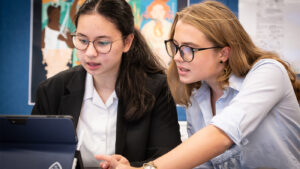

Life after school
Beyond Wycombe Abbey
The School provides pupils with all the support they need to manage a successful transition to university and independent living. We aim to ensure that every girl is equipped with 21st century skills, ready to take her place in a globalised and rapidly changing world.
University Destinations
Each year pupils are offered places at highly selective universities on competitive courses. While Oxbridge does remain a popular route for many pupils, increasingly they are looking more widely and thinking more broadly about the experience they wish to have and the skills they hope to acquire. In particular, their scope is increasingly global in nature and universities in the United States are proving particularly popular.
Pupils benefit from a range of support in their higher education applications. A team of specialist Sixth Form Tutors provide the day-to-day support, from choosing a degree subject to reviewing personal statements and writing references.
The Lower Sixth year has two strands of higher education preparation. The first strand is designed to help pupils to make good decisions about their application by understanding what is important to them, where their strengths and interests lie, as well as strategic considerations about what to apply for and where. As part of this, the Director of Sixth Form presents to them regularly, as do representatives from leading universities. The Future Ready Week is a week dedicated to higher education and careers in the Summer Term, which puts pupils on the front-foot heading into the summer break.
The second strand is academic preparation, delivered through weekly timetabled University Preparation Lessons from January to June, mock interviews and the academic forum with local boys’ schools. We strive to emphasise interdisciplinary skills and learning in a collaborative setting, working with genuinely challenging material that goes beyond the A level syllabi.
Applicants to universities in the United States have unrivalled support through our American and International Universities Office, where our in-house Counsellor supports pupils through our programme, beginning in Lower Fifth, becoming increasingly intensive as pupils move through to the Sixth Form. See below for more information about our four year pathway into US higher education.
Wycombe Abbey ensures that pupils receive age-appropriate guidance, education and access to opportunities so that they learn to develop and identify their own individual skills and interests throughout their time in School and are equipped with the tools to make informed choices about their future. Each pupil is treated as an individual and given access to independent and impartial advice at the appropriate stage.
Regular Career Spotlight events open to all years, together with the annual Careers Seminar (for pupils in LV-UVI inclusive), ensure pupils have awareness of the many pathways they could pursue, along with opportunities to speak with professionals.
Pupils can access guidance via the Future Ready section on My Wycombe (School intranet), which provides a wide variety of resources, including career guidance, age-appropriate work experience opportunities, degree apprenticeships, universities, gap years, and life skills. Careers updates and opportunities are shared regularly with pupils.
The vast majority of pupils at Wycombe Abbey undertake a minimum of two weeks’ work experience, one week during the summer following UV and a further week during the summer of LVI. While work experience is a necessity for some careers, such as medicine and veterinary medicine, all pupils are encouraged to take part; many will be looking for internships whilst at university and work experience is excellent preparation for this.
Pupils are encouraged to be proactive in securing their own work experience placements, although the School is fortunate to have parents, alumnae and other contacts who are able to offer work experience or work shadowing opportunities.
The Sixth Form at Wycombe Abbey provides a supportive environment for pupils to reach their academic potential, nurture their individual passions and navigate the range of opportunities available to them after they leave school. Whilst important, we want pupils to leave Wycombe Abbey with more than just a set of excellent academic qualifications. We want them to be independent, self-motivated learners, intellectually curious and informed global citizens, and confident, caring role models. In short, we want them to be Future Ready.
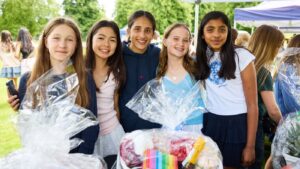

Embracing opportunities
Beyond the Curriculum
Whether a girl is an aspiring aerospace engineer, actor or anthropologist, there are many activities and resources available to help her pursue her passions beyond the core curriculum. Our enrichment activities allow girls the opportunity to follow their own lines of enquiry into the areas that interest them the most. Without the pressure of examinations, girls are able to take intellectual risks and build resilience. A flavour of the opportunities available beyond the classroom is below.
We have over 50 clubs and societies covering a range of areas, and if one doesn’t exist already, the pupils are encouraged to set it up and lead its development.
Nearly all the subjects on the curriculum have their own academic society, which complement and enhance the learning that goes on in the classroom. These societies, many of which are pupil-led, organise visiting speakers, conferences and trips.
Some of our societies include:
- Art Society
- Bee Society
- Caledonian Society
- Debating and Public Speaking
- Greenpower Car Club
- Identity Society
- Model United Nations
- Newspaper: The Publication
- Rock Society
- Tycoon Enterprise
A number of Activities Days for academic enrichment see the girls taken off-timetable for a fully immersive experience. Such activities allow for extended projects and trips that would not be possible during normal lesson time. For example, our UV pupils travel to France and Belgium to learn about World War Two. Pupils in UIV develop their friendships through completing a series of adventurous activities and team-building challenges.
The Conundrum quiz is an online competition for pupils in all age groups. First launched to Wycombe Abbey girls, the quiz has grown in popularity and is now a quiz for children around the world providing enrichment and extension to pupils’ learning of mathematics.
Lower Fourth (LIV), is a significant step up and in many ways a unique year; moving into a Senior Boarding House and having more independence over studies and free periods. These new experiences and challenges are a vital part of shaping our pupils into flourishing individuals and LIV reflect on these as part of the Dove Award. It is structured across three pillars:
- Community: pupils reflect on how they interact with both the local and global communities they are part of.
- Flourishing: pupils become the best version of themselves, both physically and mentally. This takes place through discussions and activities during weekly tutor times.
- Learning: pupils reflect on the increasing academic challenge of LIV and strive to take control of their own studies. The central activity is completing a substantial piece of super-curricular work and reflecting on how the School’s Academic Qualities of Risk Taking, Resourcefulness, Determination, Reflection and Development have been employed through this.
Writing challenges are an excellent way to demonstrate initiative, passion and engagement with a chosen subject. Girls take advantage of the considerable resources in the library as well as the academic support available at the School. These opportunities for scholarship cultivate independent learning habits as well as skills of critical thought and enquiry. Some girls choose to enter essays into national competitions and often achieve success.
Girls enjoy lectures from distinguished guests on a variety of cultural, social, political, ethical and economic matters. Recent speakers have included Liz Earle, Sir Anthony Seldon, Dame Sarah Springman and Tanya Byron. These lectures assist in broadening horizons and extending and developing each girl’s knowledge outside of the classroom. Pupils also enjoy the opportunity to network with influential people from a variety of industries.
Academic scholars are expected to produce a piece of original research or reflection over the Summer holidays. During the Autumn Term they present their ideas at the Scholars’ Presentation evenings, run by the Deputy Head (Academic), which provide thought-provoking discussion. Topics in recent years have included: Engineering Solutions to Water and Sanitation in the Third World; Le Front National; The Ageing Population; Killer Whales; a Speech in the Style of Cicero. We also hold Scholars’ Dinners, and speakers have included Dame Carol Black, Principal of Newnham College Cambridge, and Professor AC Grayling, founder of the New College of Humanities.
School Trips and expeditions are an integral part of the academic curriculum and a powerful tool to consolidate learning. Recent adventures have included skiing in Canada, Geography to Morocco, a Netball Tour to South Africa and an Ecology trip to Peru. French and Spanish immersion trips have taken place for pupils across the School, alongside the annual Duke of Edinburgh Bronze and Gold Expeditions.
Our Science, Technology, Engineering and Maths (STEM) provision is carefully designed to prepare girls for careers in these important fields. We develop interdisciplinary awareness and give girls the skills and ability to adapt in a range of fields including the Sciences, Design Technology, Computing, Careers and Art.
A full programme of STEM activities and projects are available to pupils of all ages. A selection of some recent highlights are outlined below.
Junior Engineering Society meetings for the UIII are led throughout the year by the Engineering Society chairmen (Sixth Form girls) and involve highly enjoyable practical challenges.
The annual two-day UIII STEM project involves an extended team challenge, offering the opportunity for the girls to flex their technical and scientific wings and draw on their creative and artistic skills, as well as their technical and scientific knowledge.
For girls in UIV, there is the opportunity to take part in the ten-week long Go4SET project, run by the Engineering Development Trust (EDT) and sponsored by GlaxoSmithKline. GSK provides recent graduate engineer mentors who supervise and guide the teams, giving them a great insight into the life of an engineer, including site visits.
The Engineering Education Scheme is on offer to LVI girls and is a six-month engineering project sponsored by a company, who also provides a mentor. The scheme culminates in the achievement of a Gold CREST award. In the past, we have worked with National Grid and also the Manchester X-ray facility, based at Rutherford Appleton Laboratories. This has given the girls a unique opportunity to design a rig to be used on the Diamond Light Source facility.
The greenpower car project is open to all ages within the school and provides a unique range of opportunities from designing and building the car to driving it at venues such as Dunsfold Rise and Rockingham. Pupils use CAD software to design and test different car shapes in a virtual wind tunnel, get involved in the manufacture and development of the cars and stretch their troubleshooting abilities when things do not go quite to plan!
STEM Day is a biennial event in which all pupils are taken off timetabled lessons to participate in workshops, activities, shows and lectures. Highlights of past STEM days have included a nine-metre-high rocket parked outside the Abbey for the day, a full-size hot air balloon on the Abbey lawn, ‘Bug man’, who enables pupils to handle a whole range of insects and reptiles, lectures by Simon Singh, Ben Goldacre and Matt Parker and a design-and-make-your-own-trebuchet workshop, including a bean bag battle and a fractal dome experience.
The Arts
Girls at Wycombe Abbey enjoy a wide variety of interests and opportunities in the arts. As girls take part in extra-curricular Art, Dance, Drama and Music, they develop creativity, leadership and teamwork. The positive effects of their pursuits are felt in all areas of school life.
Art
Art is a vibrant subject at Wycombe Abbey, offering a wide range of activities beyond the formal curriculum. The girls are exposed to artistic techniques and skills, and are involved in artistic projects and discussions about the role of art in society.
The opportunity to experiment with photography as an extra-curricular activity is offered to Sixth Form pupils. In the dark room girls explore black and white film processing and using Pentax SLR Cameras girls explore different creative and experimental techniques as well as a variety of printing methods. Pupils have the use of a custom-built dark room which is fully equipped for black and white photography and a digital studio with lighting and back drops. Whole school competitions encourage all girls to become actively involved in taking pictures.
Girls have the opportunity to take part in a range of creative workshops, broadening their knowledge and appreciation of art and design. Evening and weekend workshops are run by our specialist staff and we invite visiting artists with different skills and expertise. Subjects vary and include tufting, abstract acrylics, portraiture, glasswork, 3D textiles, fashion upcycling, drypoint etching, ceramics and screen printing.
Dance
Dance is very popular amongst pupils at Wycombe Abbey. We have an extensive extra-curricular provision including Ballet, Tap, Modern, Jazz and Street Dance and dance specialists lead several weekly Dance Companies.
Within our purpose-built Sports Centre, girls have access to an impressive dance studio and smaller practice areas.
Each year pupils have the opportunity to perform to the School community in a variety of dance shows. The annual UIV House Dance Competition displays pieces choreographed by each House around a given theme. A Junior and Senior Choreography Competition invites girls to produce their own solo or group piece. Our annual dance shows are an opportunity for pupils to perform the work that they have choreographed individually, alongside pieces devised by our dance teachers within one of our Dance Companies. The production demonstrates talent across age groups through a multitude of dance genres.
Tap, Modern, Ballet and pointe are offered in individual or group settings. Girls study Imperial Society of Teachers of Dancing (ISTD) Tap and Modern or Royal Academy of Dance (RAD) ballet qualifications from Beginner through to Advanced and vocational levels.
Drama
Pupils in UIII – UIV at Wycombe Abbey have one double period of Drama per week and these lessons are designed to help build collaborative and public speaking skills as well as stagecraft and performance techniques. Pupils will learn to be adaptable and flexible in their creative thinking and to consider how they might convey information to their audience effectively. Pupils in LV and above have the option to study Drama at GCSE and A level.
We aim to ensure that pupils across all age groups have the opportunity to take part in a range of performances opportunities throughout the school year. These include:
- The UIII Production
- The Fourth Form Production (LIV/UIV)
- The Shakespeare Schools Festival (LV)
- LIV Short Film Competition
- House Play Competition (LV)
- The Senior Production (UV – UVI)
- The Clarence Play (directed by an UVI pupil)
- The School Musical (bi-annual)
Pupils can also take part in productions as members of the backstage and technical crew as well as costume and set/prop makers.
Recent Productions include:
- Sister Act
- The Wardrobe
- Arabian Nights
- Our Country’s Good
- The Sweet Science of Bruising
- A Midsummer Night’s Dream
- Much Ado About Nothing
LAMDA Speech and Drama is taught in small groups for pupils in LIV and UIV and as pairs and soloists for pupils in LV and above.
Pupils can opt to take a variety of LAMDA examinations at Grade 3-8. These include:
· Acting
· Speaking in Public
· Verse and Prose
· Shakespeare
· Musical Theatre
We currently have over 160 pupils who take LAMDA lessons of one kind or another, the exams for which take place in both the Spring and Summer Terms.
We have a regular programme of visiting practitioners who deliver workshops for GCSE and A level pupils as well as for members of our Drama society. In the recent past these have included:
· ‘Frantic Assembly’ Theatre Company
· ‘Splendid’ Theatre Company
· BFI Filmmaking Workshops
· ‘The Paper Birds’ Theatre Company
· Shakespeare for Schools Workshops
We also aim to ensure pupils have access to professional productions both through live streams/recordings, visiting companies and trips to theatres. Recent highlights include:
· Wuthering Heights
· DNA
· The Ocean at the End of the Lane
· The Unreturning
· Othello
· The Curious Incident of the Dog in the Night-Time
We have also recently taken a group of LVI pupils to perform at Edinburgh Festival over the summer.
As the School is located close to London, Stratford-upon-Avon, Oxford and the local theatre in High Wycombe, pupils have the opportunity to attend theatre productions on a regular basis. Previous trips have been organised to see Romeo and Juliet at Shakespeare’s Globe, 1984 at Creation Theatre, Oxford, Woman in Black at Aylesbury Waterside Theatre and Dancing at Lughnasa at The National Theatre.
Music
Music is an important part of life at Wycombe Abbey. We believe all girls, whatever their level of skill, should be able to experience music making, both individually and collaboratively. Two-thirds of our pupils play at least one musical instrument, and many study two or three. The School’s strong tradition of singing is reflected in annual choral concerts and frequent musical productions. We have three orchestras (Symphony, Sinfonia and String Chamber), string, wind and vocal ensembles, a choral society and four choirs. Professional musicians are regularly invited to perform and give masterclasses. We constantly strive to find new ways to inspire and stretch the School’s musicians.
The Performing Arts Centre is a modern complex with a 200-seat auditorium equipped with the latest technology and acoustics. There is a recording studio and chamber music rehearsal room as well as 30 individual music practice rooms across the site.
Girls play in small groups, sing in choirs and play in the orchestras, with opportunities to perform at School, locally, nationally and internationally.
All girls take part in the annual House Music Competition, House Chapel Services and weekly Whole School Singing sessions. The House Music Competition, adjudicated by external judges, has three stages, divided into a musical ensemble round, a House singing round and a solo round.
Informal concerts are held each week, providing an opportunity for girls to perform in front of a small, supportive audience. Major concerts include the Archer Concert, featuring a varied programme of orchestral, chamber and solo repertoire, Orchestral Concert, held at an external venue and featuring the three School orchestras and advanced concerto soloists, Chamber Music Concert, an opportunity for our many small music groups and the Summer Concert, involving all of the School orchestras and many small groups in a largely light programme. We are active locally and perform three community concerts and several carol singing events each year.
Our two senior orchestras perform with soloists at professional external venues, which have included St John’s, Smith Square, London, Royal College of Music, St Mary’s, Marylebone and the Sheldonian Theatre, Oxford. We take part in a joint Choral Group Concert with Eton College. The Chapel Choir and Chamber Orchestra undertake a biennual tour to Europe.
Our 40 full-time and visiting music staff deliver lessons to two-thirds of the girls. Individual tuition is available in piano, voice, violin, viola, ‘cello, double bass, harp, guitar, flute, oboe, clarinet, bassoon, saxophone, recorder, trumpet, French horn, trombone, tuba, organ, guitar, drum kit and orchestral percussion. Termly ABRSM examinations are held at School and girls achieve success up to Grade 8 and beyond, including performance diplomas. Some girls take Trinity and Rock School examinations at local centres.
We offer support and mentoring to advanced musicians to help the girls balance their academic, practice and performance commitments. Many girls are also successful in open competitions, winning Choral Scholarships at Cambridge and gaining selection for the National Youth Orchestra.
A wide range of masterclasses and workshops are led by notable musicians, singers, composers and academics. These have included a celebrity recital with celebrated clarinettist, Emma Johnson; a masterclass with one of the world’s most celebrated violinists, Tasmin Little, and a piano masterclass with one of the rising stars of the Classical Music World, Jeneba Kanneh-Mason.
Various competitions are on offer to help stretch and develop musicians. Most prominent of these is our annual solo performance competition, The Wycombe Abbey Competitive Music Festival, which last year included more than 140 entries.
The Music Society exists to organise trips to concerts. We have also organised regular residential music tours such as the recent Lower School Three Countries Tour which involved the Junior Concert Band and Sinfonia performing in Germany, Belgium and the Netherlands.
Groups and Bands
For performers who are Grade 8 and above. It tackles full orchestral repertoire as well as concerto movements featuring soloists.
For string players who are Grade 8 and above, with guest woodwind and brass when necessary. The orchestra performs string orchestra repertoire and Classical symphonies as well as concerto movements featuring soloists.
For performers who are Grades 4 to 7. The group plays arrangements of full orchestra repertoire.
An instrumental ensemble for wind, brass, percussion and keyboard players in UIII to UIV.
For performers between Grades 4 and 7. They play fun arrangements of film music/pop songs.
For girls in LV to UVI, this choir leads singing in Chapel Services, and key services throughout the year. Membership is by audition.
This choir is auditioned from members of the Chapel Choir. It is an elite 12-voice a cappella ensemble, singing complex sacred choral music, secular close-harmony and barbershop-style pieces in concerts throughout the year.
This choir is open to all girls in UIII to UIV. They perform regularly through the year both in concerts and services in Chapel.
For girls in UIV to UVI, this choir joins Eton Choral Society to perform one major choral/orchestral work in March each year.
A choral ensemble for all members of UIII.
An auditioned, girl-led, Gospel choir.
There are many chamber ensembles, which currently include string quartets and piano trios, as well as other string combinations, piano duets, and wind ensembles.
We have a number of school rock bands that perform at social events throughout the year hosted at Wycombe Abbey and Harrow School and at our annual outdoor rock festival, GlastonAbbey. Several bands have also had success in the annual Bucks Battle of the Bands Competition, with opportunities to perform at the Wycombe Swan.
Sport
Wycombe Abbey has an impressive sporting reputation. Our extensive facilities and the dedication, experience, and high calibre of our teachers and coaches support each girl in following her sporting ambitions from recreational to elite-level sport. We regularly reach county, regional, and national-level competitions across all our major sports and have a large number of performance athletes representing their respective sports at an international level.
We have exceptional outdoor and indoor facilities, including five lacrosse pitches, a grass athletics track, a floodlight Astroturf pitch, 12 tennis hardcourts and indoor and outdoor netball courts. The Davies Sports Centre includes a 25-metre six-lane indoor swimming pool with touchpad timing, a multi-use sports hall, a newly refurbished Fitness Suite, a dance studio, four glass-backed squash courts, a fencing piste, a climbing wall and a golf suite which has two bays with exceptional Hawkeye technology to collect data and track performance.
Fixtures
We have an extensive fixtures programme at Wycombe Abbey that ranges from National Competitions to recreational friendly fixtures giving pupils the opportunity to experience competition at all levels. Our main fixture days are Wednesday and Saturday afternoons. In the autumn and spring terms we host netball, swimming, squash and Lacrosse (Saturday) fixtures. In the Summer Term both Wednesday and Saturday are filled with athletics, tennis and cricket fixtures for all age groups.
House Games
House Games is a weekly inter-house sports competition where each Senior House showcases their athletic prowess in a variety of sports disciplines to accumulate points for their respective House. At the end of each half term, the highly anticipated House Funals features some of the school’s major sports such as lacrosse, netball, swimming, cross country, cricket, and tennis. During these events, pupils proudly don their House colours, mascots make spirited appearances, and the entire school community rallies behind their respective Houses.
At the end of the academic year, the House who earns the most points throughout the competition will be honoured with the prestigious House Games trophy. This culminating event not only signifies sporting excellence but also symbolizes the unity and camaraderie that House Games instils within our community.
The Performance Programme exists to allow pupils who are on a talent pathway and/or performing at regional or equivalent level in their sport to receive support from the School to balance their academic commitments alongside training and competing, so that they can reach their potential. Pupils receive strength and conditioning and prehab/rehab support, as well as mentoring and access to educational sessions related to different aspects of sports performance. The programme is application only and open to all.
There are three tiers to the Programme: Perform, Aspire and Develop – to cater for the different ages, performance levels and commitments of our athletes and support is tailored to these tiers.
Achievements and personal bests are monitored and celebrated throughout the year, and we require our performance athletes to be role models in sport and in PE for the rest of the School, as well as compete for the School when required. There are currently around 60 athletes on the programme performing across 13 different sports including lacrosse, netball, sailing, golf, equestrian, cricket, tennis and athletics.
Aims of the Programme
- Enable pupils to train and perform in their sport whilst maintaining a balance with their academic and extra-curricular commitments.
- Support pupils’ training needs where necessary and help to maintain mental and emotional wellbeing whilst enjoying all that school has to offer.
- Help to keep pupils injury free and robust by monitoring cumulative workload across all sports (inside and outside school) and support athletic development in their chosen sport.
- Provide education and enrichment on all aspects of performance in sport, including developing mental and emotional skills, to help pupils reach potential.
- Offer lifestyle mentoring, where necessary, to help pupils set goals and organise their life so that they can perform in sport and achieve in school. This includes planning for optimum nutrition and sleep, working with their menstrual cycle, wellbeing and stress management.
Effective leadership is a key element of sport and influential in developing confident and independent young women. The Sports Leaders qualification develops enhanced organisational and communication skills, heightened self-esteem and motivation, as well as an appreciation of challenges faced by others. The programme is designed to inspire the girls to have an active role in our School and community life. We offer two nationally recognised qualifications, Level 2 in Community Sports Leadership and Level 3 in Sports Leadership.
For the Level 2 qualification, girls volunteer to support the smooth running of School fixtures and in small groups, lead sporting activities for each other, and lead a sports event for community members and pupils from local schools. The course is designed to develop leadership qualities through theoretical and practical experiences and girls are taught the key skills of communication, organisation and safety and risk assessment. This is available to complete during the LV year.
The Level 3 qualification takes two years to complete, and girls are required to understand the needs of a range of community groups, such as children, disabled people, community groups and the elderly. They plan and lead a sports event for one of these groups, and plan and lead a series of sessions for their peers. They need to complete a total of 14 hours of volunteer service. This is available to complete during the Sixth Form.
A huge range of sports trips are on offer for both those wishing to play competitively and for those who enjoy sport recreationally. Most recently, this has included a lacrosse tour to Prague, netball tour to South Africa and a tennis tour to Portugal. We also offer a long-haul lacrosse trip that coincides with the Women’s World Cup and so we look forward to this opportunity in 2026 when it is scheduled to be held in Japan. Additionally, there is our annual recreational ski trip which has taken place in Jay Peak and Tremblant in the last few years; as well as competitive ski trips to Flaine. These trips offer pupils the opportunity to engage in physical activities in different environments, providing hands-on experiences, while also providing them with an understanding of other countries cultures. Ultimately, PE trips serve as enriching experiences that not only promote a healthy lifestyle but also cultivate a passion for sports and overall wellbeing.
Sports Opportunities
Athletics forms part of the Summer Term curriculum, with clubs and competitions regularly taking place. Our athletes can train throughout the year at Marlow Athletics Club, in conjunction with Chiltern Athletics Club, which enables them to gain additional professional coaching. During the summer, we have paid on-site sessions with an external coach, a running club, and our squad training session. We attend and host regular competitions throughout the Summer Term for our track and field season, and we enter regional and national competitions in which we have great success – most recently, making it to the ESAA National Track and Field Cup Final in 2023. The School’s expansive and undulating location is ideal terrain for cross-country and long-distance athletes to prepare for their events. Throughout the Autumn and Spring Terms, we compete in the ESAA Cross Country Cup and Individual Cross Country Champs; in 2023/2024, our athletes were hugely successful with gold medals at both events, narrowly missing out on a spot in the national finals for the Cup.
Badminton continues to be a popular sport at Wycombe Abbey, with large numbers attending the weekly recreational club. Pupils also have the opportunity to develop their skills in lessons and compete in inter-house fixtures during House Games.
We are fortunate to have a climbing wall in the Davies Sports Centre where we can offer pupils the opportunity to try bouldering, climbing and belaying in small groups. Trained staff can deliver the activity during LV-UVI year group Games sessions and regular climbing sessions as a club activity in the evenings for every year group. We have several pupils who choose climbing as one of their GCSE PE chosen sports and can practise their skills in these club sessions.
Cricket is growing in popularity at Wycombe Abbey. During the winter months, teams are entered into the National Indoor Cricket tournament for U13 sand U15 age groups, both of which progressed to county finals this year, with the U15s reaching the regional finals. We cater for both recreational and competitive players across our age groups, playing a mixture of hard and soft ball matches. The School has four cricket pitches and nets that are regularly used for training sessions, including the bowling machine for our county players to practice with.
Pupils in UIII – UIV cover some dance as part of the PE curriculum. The Perform unit is a creative, performance-based unit that teaches choreographic and aesthetic skills. Those who enjoy Dance often decide to take it as a paid extra in styles such as ballet, tap, modern and jazz. This gives them further opportunities to develop their skills and take exams and awards which are offered at different levels. We also run a dance show every year in varied genres, which are showcased to staff, parents, and pupils.
Throughout the year pupils will also take part in House Dance activities, choreography challenges and Clarence academy to encourage creativity and community participation.
Two experienced coaches offer individual sessions and additional group training for girls from novice to international competition standard and we have links to local clubs to support girls with further training needs. Several girls have fenced regularly at international level in recent years, which has helped school fencers achieve entrance to US Colleges.
Football is a growing Wycombe abbey club with regular weekly sessions. The girls have been able to compete in friendly matches across all age groups.
Golf has always been popular at Wycombe Abbey amongst a select few pupils, who are able to play at the nearby Golf course under the tutelage of their club pro; pupils also have the opportunity to play competitive matches. Since the Golf Suite opening at School, golf has taken on a new lease of life and has grown in popularity. Having the opportunity to practice on a regular basis on some of the simulated PGA courses and look at club data with each shot has helped the pupils develop their game further. Golf has also been added to the options available for the Fifth and Sixth Form Games lessons to give pupils the opportunity to access this resource. Golf is also incorporated into the weekend activities programme and House Games.
In addition to gymnastics skills taught in our curriculum unit of Perform, we also run a gymnastics club all year round, twice a week. This training environment allows girls to develop skills further, enabling them to perform at School displays and in some external competitions.
A small number of riders have access to lessons on weekday evenings at Shardeloes Farm Equestrian Centre and Widmer Riding Centre. These lessons largely cater for beginners and novice riders.
Throughout the year, there are weekly on-site karate sessions, and girls take grades termly and progress their techniques and levels with our 5th Dan instructor.
International-level instructors of kickboxing and Muay Thai boxing inspire girls to develop martial arts and self-defence skills. Official grades are undertaken by girls of all abilities, with kickboxing beginners working through to black belt level during their time at School.
Karate and Kickboxing help develop respect, self-discipline, focus, confidence, safety and leadership.
Our staff provide high levels of experience; in the Department, we have a range of high-level playing and coaching experience within various international teams, providing an unrivalled experience. Lacrosse occurs across two terms in the Autumn and Spring Terms for all age groups with competitive matches on Saturday afternoons against several lacrosse schools. We aim to place in the top 16, if not higher, across all our teams that compete at National Schools, and placing 1st or 2nd across all age groups in the county tournaments. We have several girls who represent their country at U19 level, competing in European and World Championships for England, Wales, Scotland, Italy, Sweden, China and Korea.
Netball is a highly popular sport which takes place throughout the Autumn and Spring Terms, across all age groups within curricular and extra-curricular time. We have a number of experienced specialist teachers, coaches and umpires who work closely with our teams. We play a variety of matches at a wide range of levels. Competitively, we enter teams in the SNS National Cup and District and County Tournaments, often qualifying for the Regional Round of the National Schools Championships. Recently, our U16 team were County Champions and finished a close fourth in their group at Regional Finals. We also support girls in their progression through the Performance Pathways and their representation at club and franchise level. We currently have girls in both the Saracens Mavericks and London Pulse set-ups.
Riders with any level of experience can attend weekly sessions throughout the year at Greenpoint Polo. Girls of all ages represent the School on grass pitches and in arenas at the Schools and Universities Polo Association (SUPA) National Tournaments. These are subject to the girls’ availability, and some tournaments will fall on short leaves.
Rowing opportunities are offered at Dorney Lake (the London Olympic Games 2012 venue) and in land-based Ergometer sessions at School. Coaching is available for all abilities, from beginners to those wishing to develop their skills for competition. As a British Rowing Affiliated Club, Wycombe Abbey Rowing Club competes in races on the water and at the National Indoor Rowing Championships. Pupils in recent years have completed testing for the British Rowing Talent Identification and Development programme for the British Rowing team, with some then being selected to join our local club, Marlow, to develop their talent further.
From September to January, pupils at Wycombe Abbey have the exciting opportunity to showcase their skiing skills by trialling for the Ski Team. As part of their training regime, pupils participate in a dedicated training day at Hemel Hempstead, honing their techniques and skills and preparing for upcoming competitions. If selected, pupils will have the opportunity to represent the School in various events such as the British School Girls’ Indoor Races, testing their abilities on challenging slopes. Following rigorous training and competitive races, the top eight skiers emerge to proudly represent the chool at the esteemed British Schoolgirls’ races in Flaine.
Our squash programme is successfully run by expert coaches with many pupils choosing additional private sessions to further enhance their skills. Squash is one of our major sports and sessions take place in both curricular and extracurricular programmes so that pupils get the opportunity to play for leisure, fitness or competitively. We have regular squash fixtures in our sports calendar and have seen great success at the National Schools Competitions over the years.
Our swimming programme provides training opportunities for pupils of all ages and abilities. Morning and evening training sessions allow pupils to attend several weekly sessions that can be balanced with other school commitments and support their individual swimming goals. Our high-performance swimmers can access regional and national level coaching with Wycombe District Swimming Club, who train on-site. This has resulted in pupils gaining international representation and regional success. Regular galas, including the Wycombe Abbey Swimming League, take place against local schools. In addition to local galas, the School participates in regional and national competitions. We have had recent successes in these galas, including our teams finishing in the top four at English Schools and winning the Independent Schools relay gala in multiple categories.
Tennis is a thriving sport at Wycombe Abbey. Throughout the year, girls of all abilities can opt for individual and group lessons with our partner Living Tennis, who are based on-site. Currently, over a third of the school participates in these sessions. Further advancement for elite players can then be provided within Living Tennis’ own Delgado and Lee Pro Academy at Bisham Abbey National Sports Centre.
During the Summer Term, tennis is part of our curriculum lessons and an extra-curricular squad. We have high numbers in squads, and girls of all abilities are encouraged to play. A range of friendly and competitive fixtures are organised for different levels. Pupils compete to a high level, and we have a Performance Squad for our top players. We enter a variety of competitions, including the Aberdare Cup (National Schools), LTA Team Tennis, the National Girls Schools’ Doubles Tournament and the Independent Schools’ Championships. We regularly reach the regional knockout stages of the U13 and U15 LTA Team Tennis and LTA Youth Schools Year 11-13 competitions.
Experienced coaches offer sessions for girls from beginner to advanced standard. Girls progress as they work through the official British Gymnastics Levels with specialised School equipment – an overhead rig with a twisting and tumbling belt for support.
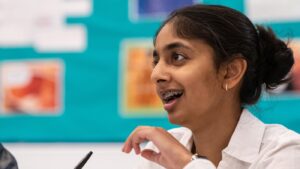

Nurturing Leadership and Entrepreneurial Spirit
A strong leadership and service ethic is an intrinsic part of Wycombe Abbey life. Each of the programmes available offers girls an opportunity to serve others, share gifts and talents, and discover how rewarding this can be. Leadership skills are developed and girls become active and responsible global citizens who are inspired to make a positive difference to the world.
Girls have many opportunities to take the lead, make their voices heard and contribute to the running of their School. The School Leadership Team comprises the Head Girl and two Deputies. The Head of each of the nine Senior Houses is also a School Prefect, and takes responsibility for organising activities. There are also Prefects who take responsibility for the major areas of School life like Drama, Sport, Charity, Music and Chapel – and for each of the year groups. All the LVI take responsibility in House for activities such as House Music, Charity and Sport. Across all year groups, elections take place annually to elect a year group representative to communicate their views at School Council and shape new initiatives.
House Charity Representatives are LVI pupils who are selected by their Housemistress to lead the fundraising for their boarding house. The selected pupils from each House make up the Charity Committee which plans and delivers a varied programme of fundraising across the School, which can involve bake sales, charity stalls at Bonfire Night and a biannual larger-scale charity event. The House Charity Representatives are supported by two UVI Charity Prefects along with the Assistant Chaplain. Each term a prize is awarded to a ‘Charity Champion’ who has made an outstanding contribution to a charity.
Through debating girls learn to express their ideas and build constructive arguments, offering rebuttals and presenting relevant points of information. All pupils are able to join either the Junior or Senior Debating Societies which meet weekly to discuss current events and develop debating skills. There are many opportunities for girls to take part in competitions and in the past these have included the Churchill Public Speaking Competition, the Cambridge Schools Debating Competition, the English Schools Mace and the Oxford Schools Debating Competition.
The Duke of Edinburgh’s Award programme is about setting girls on a path to a productive and successful future, and an Award at any level is a valuable addition to any university applications. Girls develop the skills and attitudes needed to become rounded and confident adults, qualities that employers also value highly. We offer the Bronze level to the LV and the Gold to the Sixth Form.
A mix of politics and current affairs; over the academic year girls attend a number of conferences, representing different countries’ views in a range of committees and debating hot global issues. Every delegate is exposed to a range of key skills, including rating and amending resolutions in the United Nations style and how to work as an effective advocate and diplomat.
All girls in UVI serve the local community through a variety of volunteer roles in local playgroups, retirement homes and secondary and primary schools for disabled children. Girls can also choose to help students in weekly sessions at Cressex Community School and support regular swimming lessons led by Horizons, a local sports club.
Tycoon is a national enterprise competition, which aims to encourage budding entrepreneurs to get involved in business by giving them a start-up loan to set up and run a business at school. Teams from across the UK compete and the top student businesses are invited to a prestigious, annual celebration event. At Wycombe Abbey, pupils work in teams to come up with a business idea and write a plan for how to launch and run their activity. They then trade over a period of weeks, finally reflecting on and evaluating their experience. In 2020-2021, one of our teams, Re-Soul, was invited to the competition National Final at Hampton Court Palace. Following their presentation and questioning by Peter Jones, Re-Soul was announced as the National Winner of the 16-18 age category. The team’s idea of upcycling old shoes by decorating them with their beautiful designs impressed the judges as it helps to tackle the fashion sustainability problem.
In 2021-2022, all four Wycombe Abbey teams were successful in securing start-up capital. Products ranged from scented candles, customised and decorated water bottles and portable coffee cups, Wycombe Abbey mugs, and accessories made from clothing that might otherwise go to landfill. All teams were supported by a mentor, a Wycombe Abbey Senior, who both guided and challenged them through the process. We were delighted that all four teams were collectively awarded the Buckinghamshire Award for Enterprise by the Peter Jones Foundation and were invited to showcase their achievements at a special celebratory event.
